The document discusses the assurance of God's care for humanity, drawing parallels between God's attention to birds and flowers and His concern for human welfare. It encourages Christians to live without undue anxiety about daily needs, highlighting the importance of trust in divine providence and focusing on present responsibilities rather than future worries. The text asserts that excessive anxiety is counterproductive and detracts from a fulfilling Christian life.
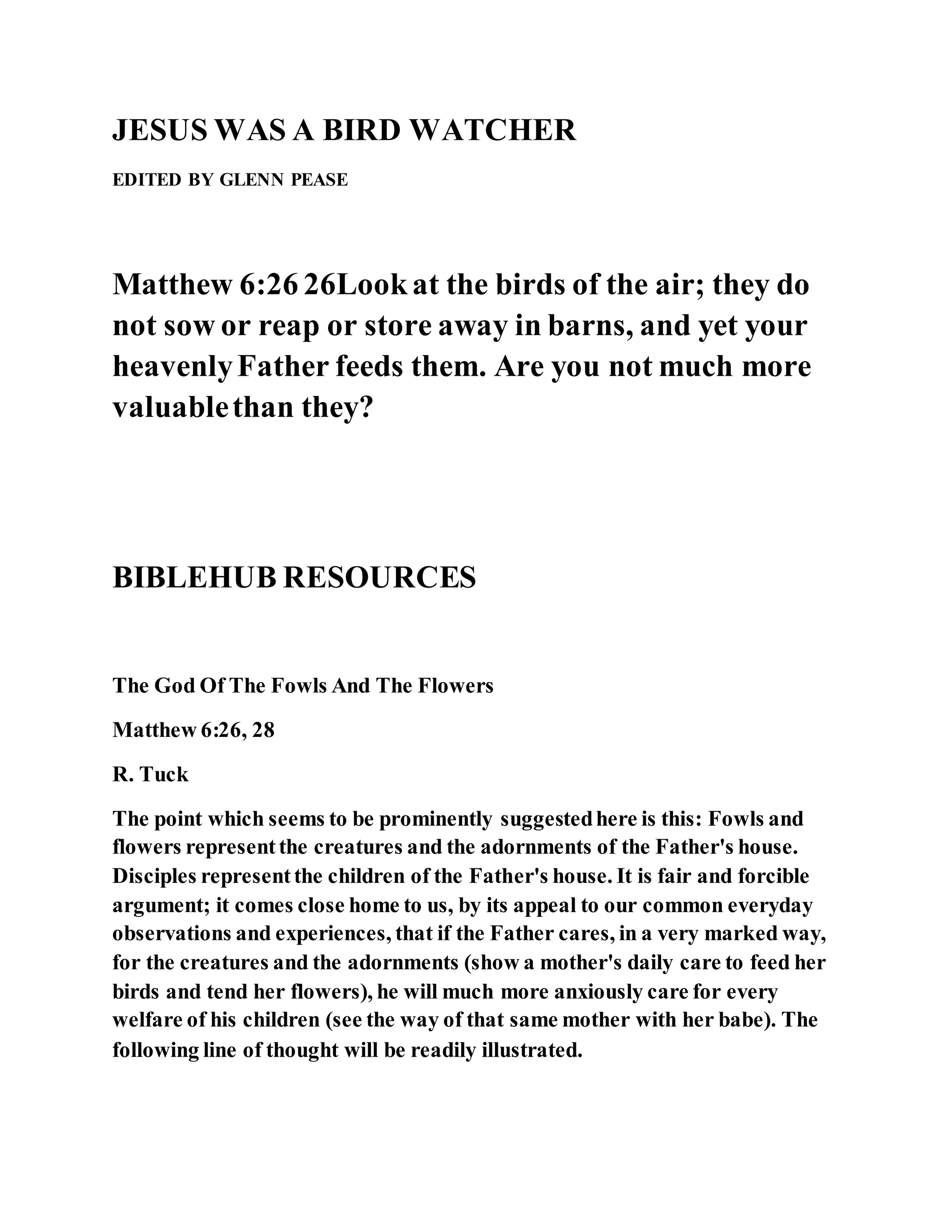
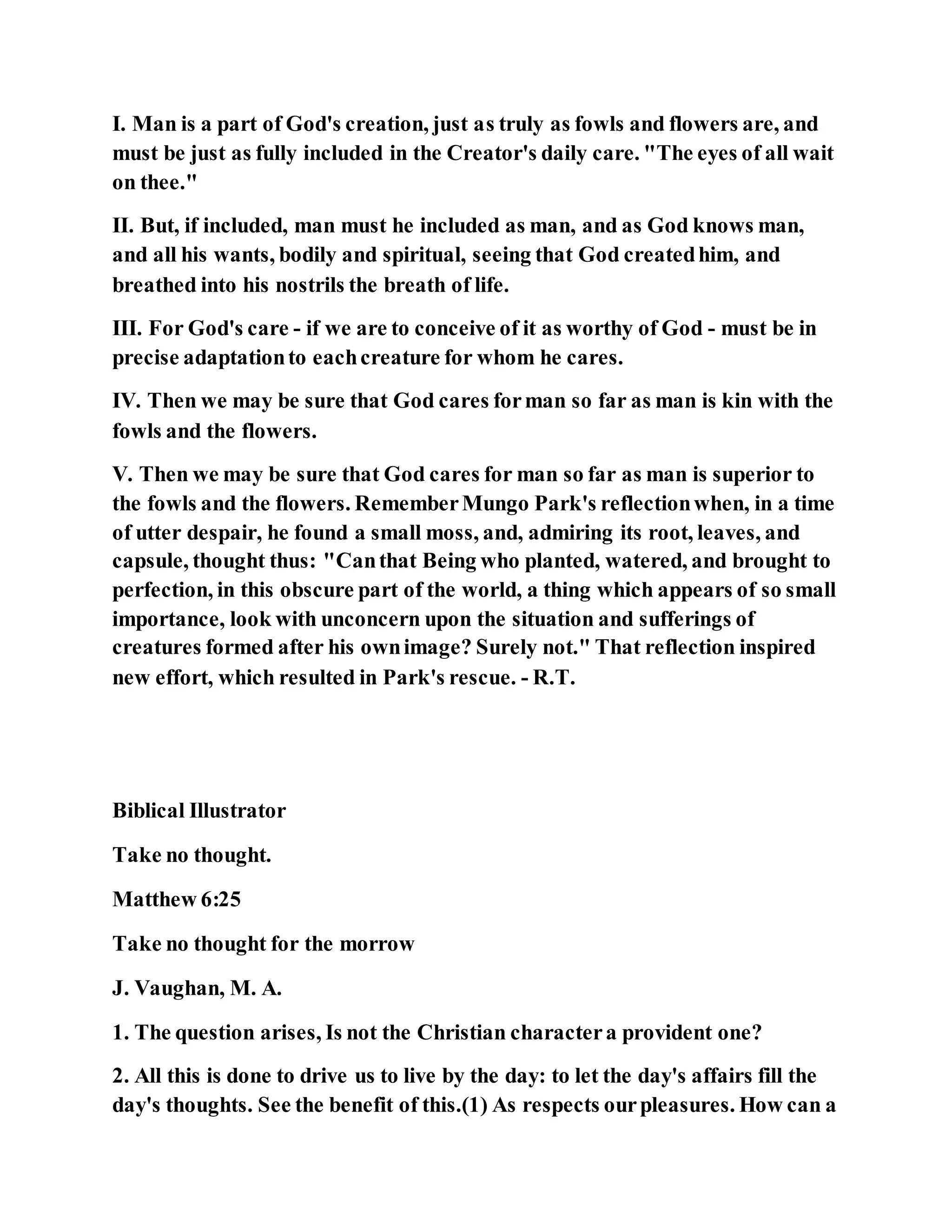


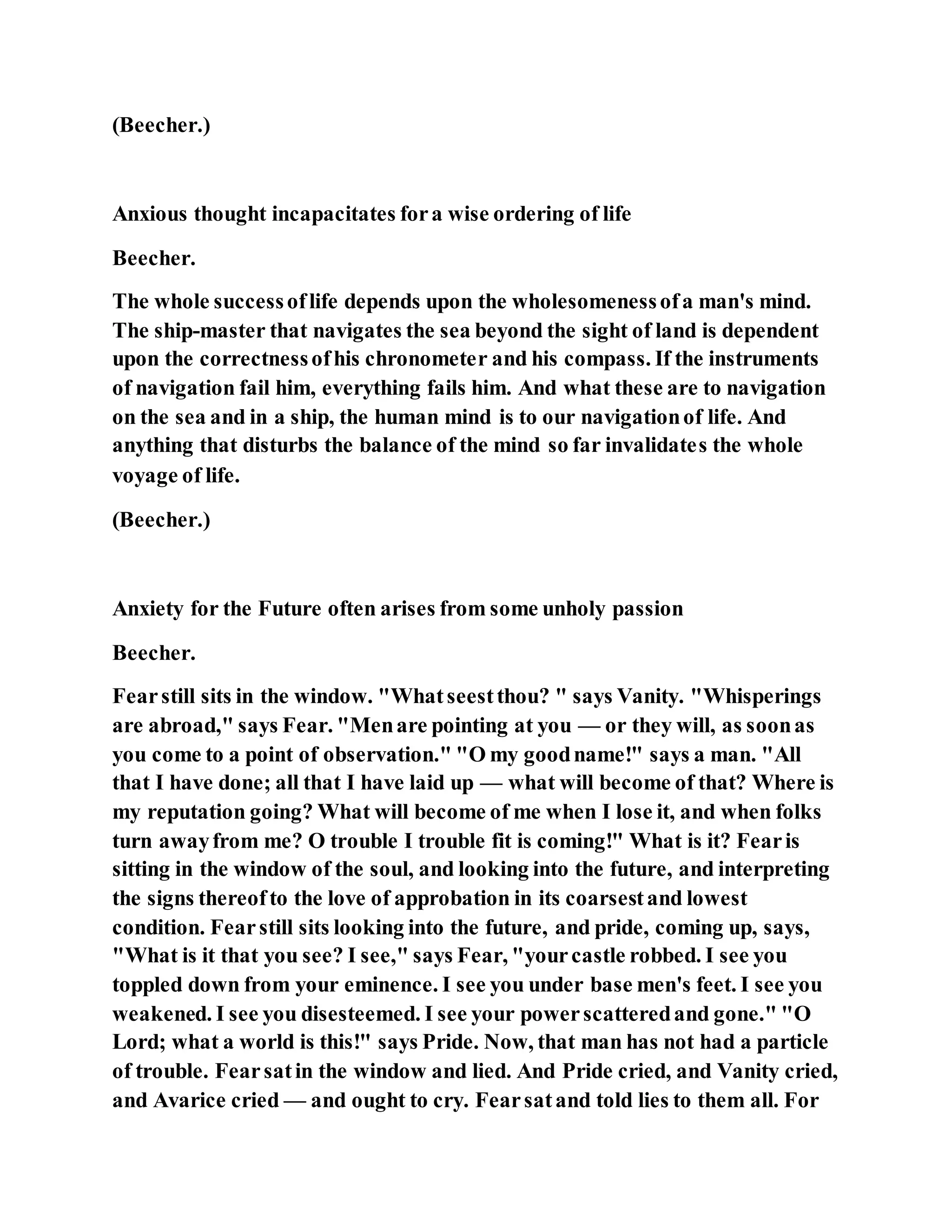



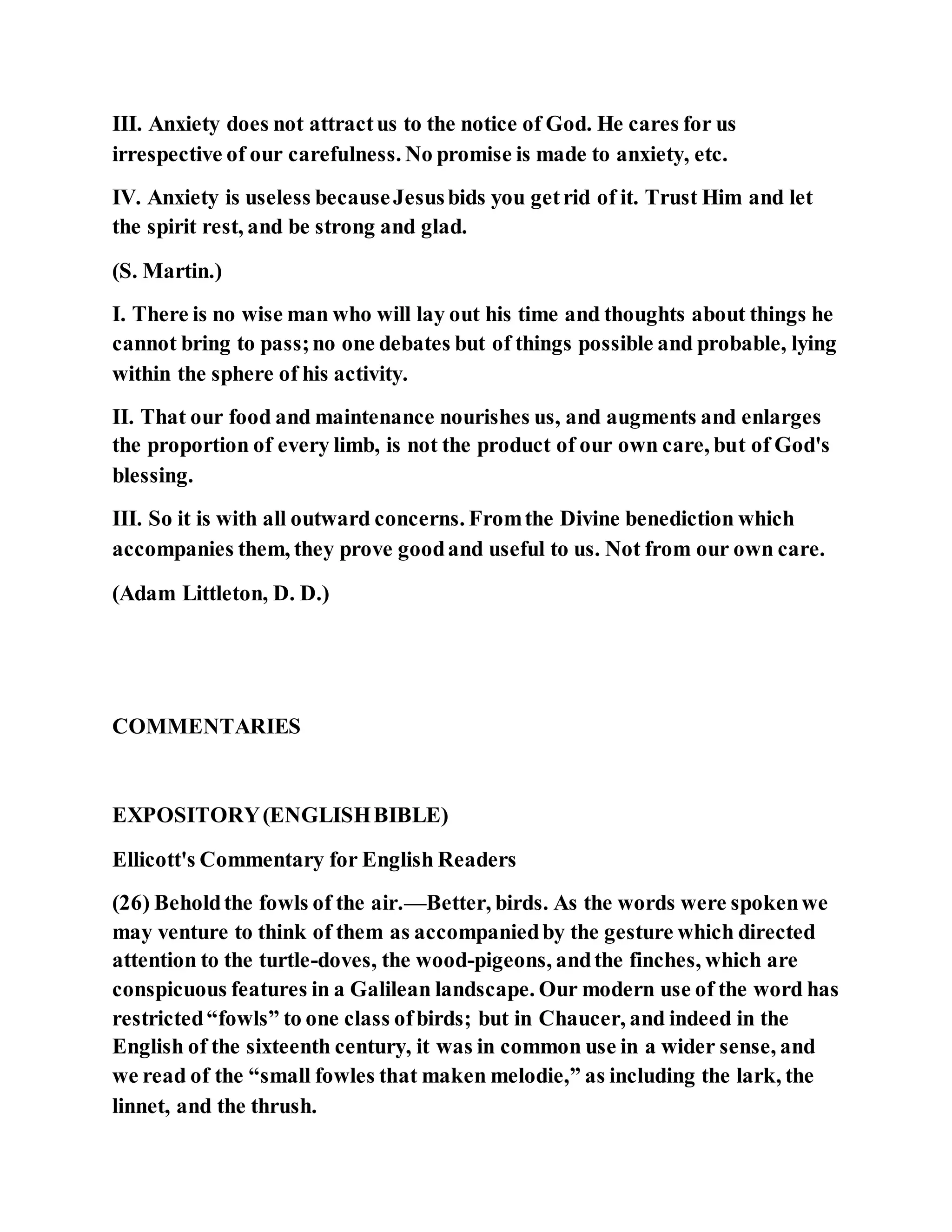
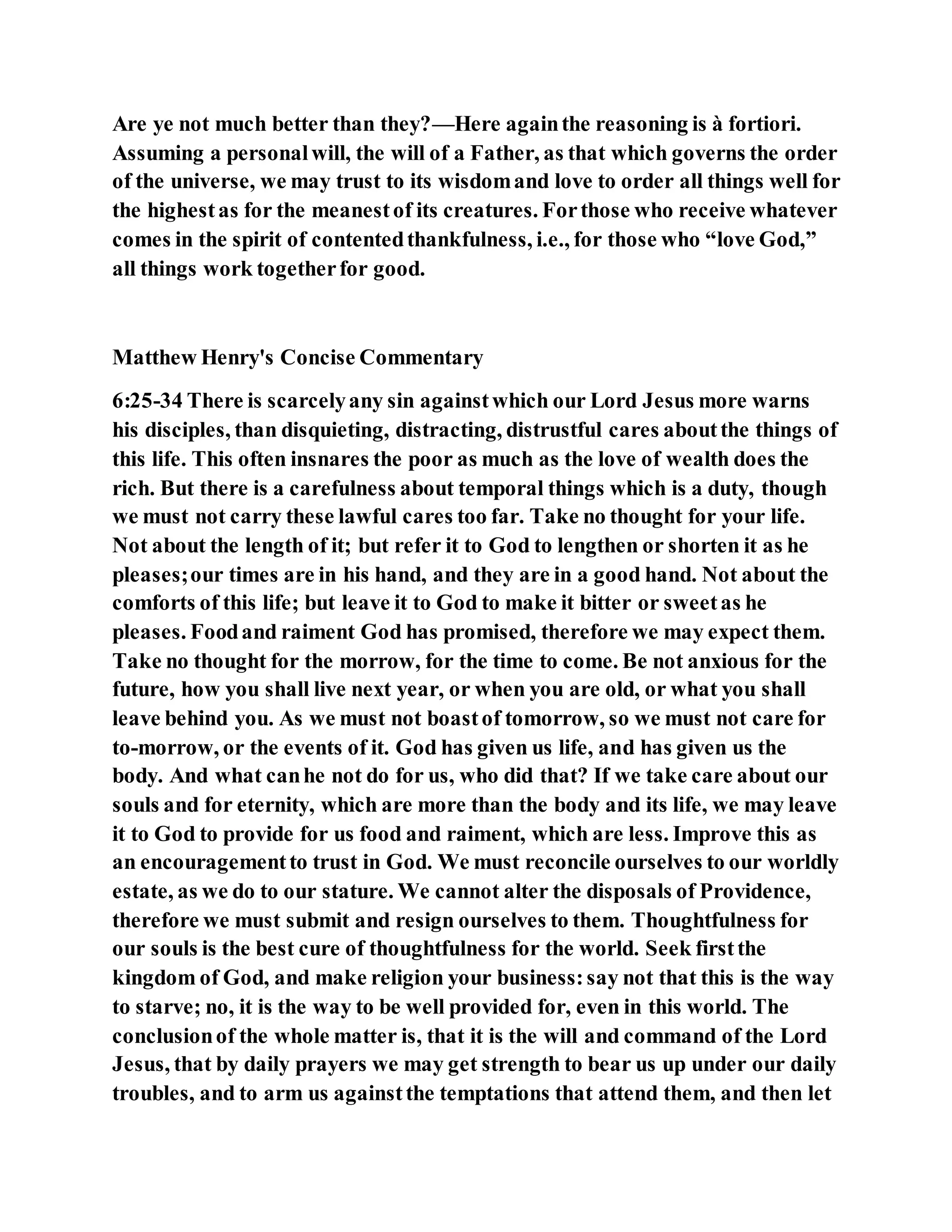


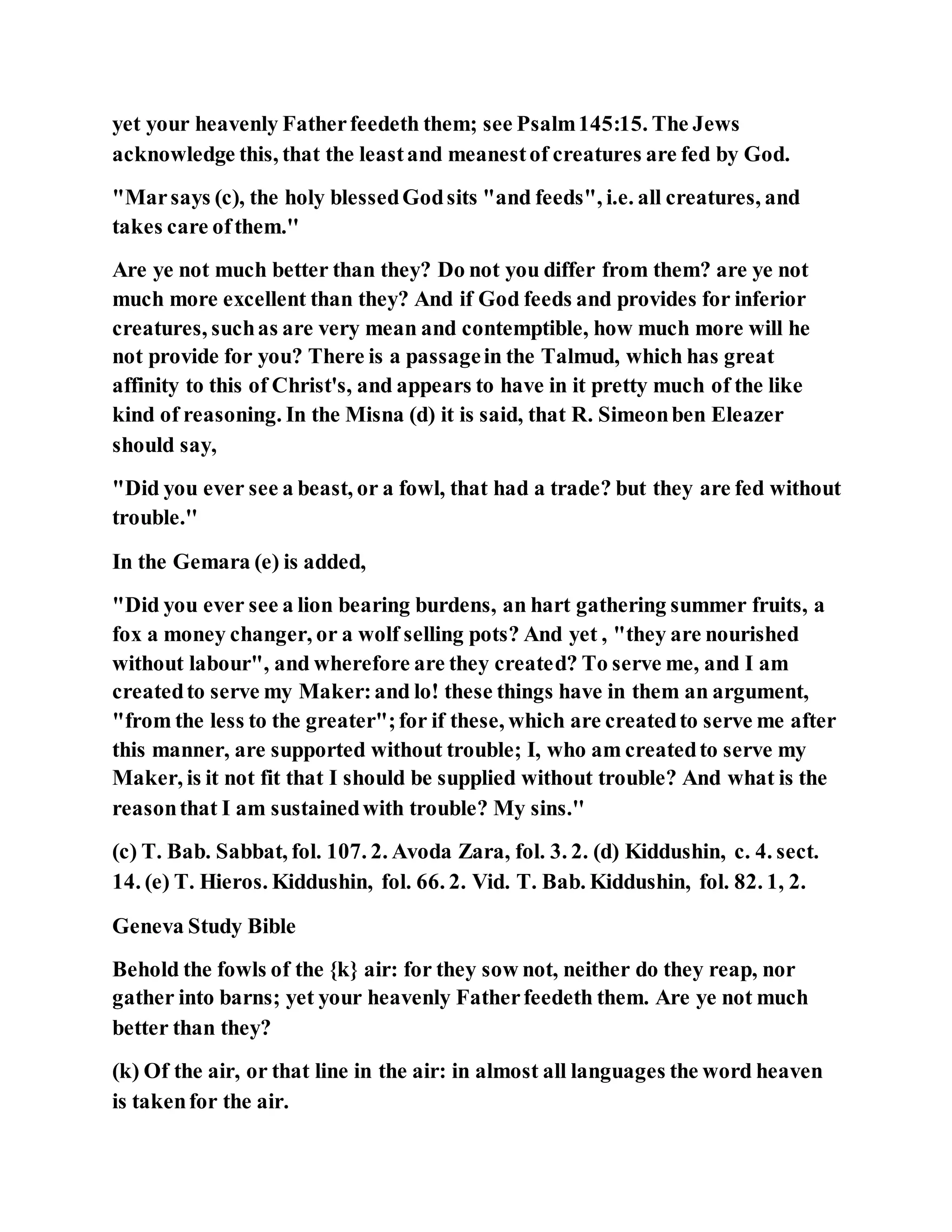
![EXEGETICAL(ORIGINAL LANGUAGES)
Meyer's NT Commentary
Matthew 6:26. Τὰ πετεινὰ τοῦ οὐρανοῦ] ֹועף הֹו ַש מֹו ,םַי the birds that fly in the air,
in this wide, free height, are entirely resigned!Genitive of locality, as in
Matthew 6:28. This is manifest (in answerto Fritzsche: towards the heavens)
from the juxtaposition of the words in Genesis 1:25;Genesis 2:19;Psalm8:9;
Psalm104:12;comp. Hom. Il. 17. p. 675:ὑπουρανίων πετεηνῶν. On the saying
itself, comp. Kiddushin, s. fin.: “Vidistine unquam bruta aut volatilia, quibus
essetaliqua officina? et tamen illa nutriuntur absque anxietate.”
ὅτι] equivalent to εἰς ἐκεῖνο ὅτι, John 2:18; John 9:17; John 11:51;John 16:9;
2 Corinthians 1:18; 2 Corinthians 11:10. To this belongs all that follows as far
as αὐτά.
μᾶλλ. διαφέρετε αὐτῶν]This μᾶλλον (magis) only strengthens the
comparative force of διαφέρειντινος (to be superior to any one). Comp. on
Php 1:23, and the μᾶλλονthat frequently accompanies προαιρεῖσθαι.
Expositor's Greek Testament
Matthew 6:26. ἐμβλέψατε εἰς, fix your eyes on, so as to take a goodlook at
(Mark 10:21;Mark 14:67).—τὰ πετεινὰ τ. ου., the birds whose elementis the
air; look, not to admire their free, careless movements on the wing, but to note
a very relevant fact—ὅτι, that without toil they gettheir foodand live.—
σπείρουσιν, θερίζουσιν, συνάγουσι ε. ἀ.: the usual operations of the
husbandman in producing the staff of life. In these the birds have no part, yet
your Father feedeththem. The carewornmight reply to this: yes; they feed
themselves at the farmer’s expense, an additional source of anxiety to him.
And the cynic unbeliever in Providence:yes, in summer; but how many perish
in winter through want and cold! Jesus, greatestofall optimists, though no
shallow or ignorant one, quietly adds: οὐχ ὑμεῖς μᾶλλονδιαφέρετε αὐτῶν: do](https://image.slidesharecdn.com/jesuswasabirdwatcher-200703143708/75/Jesus-was-a-bird-watcher-14-2048.jpg)
![not ye differ considerably from them? They fare, on the whole, well, God’s
humble creatures. Why should you fear, men, God’s children?
Cambridge Bible for Schools andColleges
26. fowls]Old English for birds; cp.
“Smale fowles makenmelodie
That slepen all the night with open yhe.” Chaucer.
There is no argument here againstforethought or labour. In one sense
“trusting to providence” is idleness and a sin. God has appointed labour as the
means whereby man provides for his wants. Even birds shew forethought, and
searchfor the food which God has provided for them.
Bengel's Gnomen
Matthew 6:26. Οὐδὲ συνάγουσιν, neither do they collect)as for example by
purchase, for the future.[286]—ὙΜῶΝ, your) He says your, not their.—
μᾶλλον, more) i.e. you more excelas sons of God, than other men do, or than
you who indulge in such care (anxiety) consider. The word μᾶλλον, therefore,
is not redundant. In this verse, the argument is from the less to the greater;in
Matthew 6:25, from the greaterto the less.
[286]“Into barns:” or even into other repositories of food, as we may see
instancedin other animals—V. g.
Pulpit Commentary
Verse 26. - Parallelpassage:Luke 12:24. The less generalterm, "ravens"
(even though these are "ofall the birds of Jerusalemdecidedly the most
characteristic andconspicuous," Tristram, 'Land of Israel,'p. 187), and the](https://image.slidesharecdn.com/jesuswasabirdwatcher-200703143708/75/Jesus-was-a-bird-watcher-15-2048.jpg)
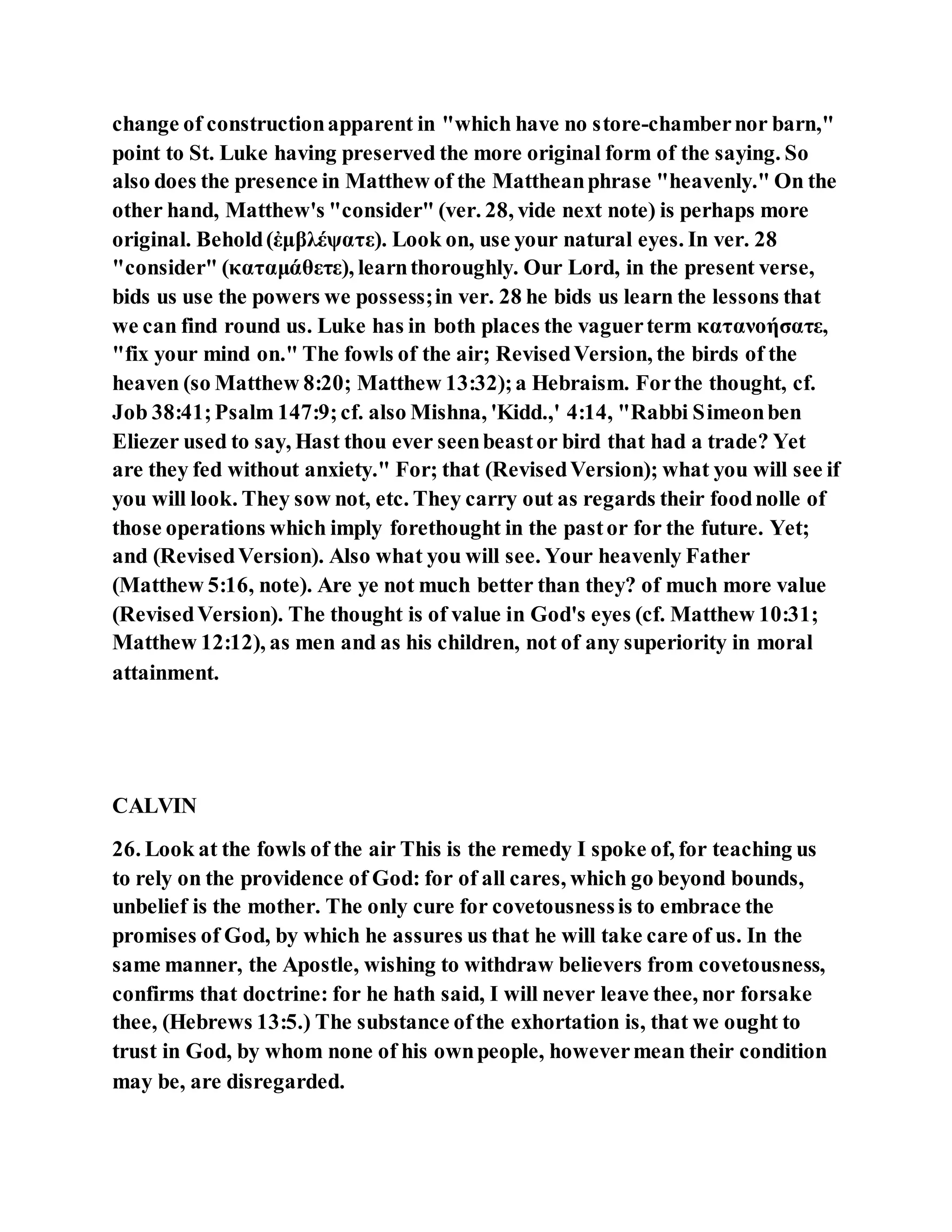
![Your heavenly Father feedeth them This deserves carefulattention: for,
though we are unable to explain the manner in which their life is supported,
which of us is in the habit of considering that their life depends on the
providence of God, which he is pleasedto extend even to them? But if it is
thoroughly fixed in our minds, that the fowls are supplied with food by the
hand of God, there will be no difficulty in expecting it for ourselves, who are
formed after his image, and reckonedamong his children. They neither sow
nor reap By these words it is far from being our Lord's intention to encourage
us to indolence and sluggishness. All that he means is, that, though other
means fail, the providence of God is alone sufficient for us, for it supplies the
animals abundantly with every thing that they need.
Instead of fowls, (ta peteina,) Luke uses the word ravens, (tous korakas,)
alluding perhaps to that passagein the Psalms, who giveth foodto the young
ravens that call upon him, (Psalm67:9.) Some think that David expressly
mentioned the ravens, because theyare immediately desertedby their
parents, [459]and therefore must have their food brought to them by God.
Hence it is evident, that Christ intended nothing more than to teachhis people
to throw all their cares on God.
PULPIT COMMENTARY
Matthew 6:26
Behold the fowls of the air: for they sow not, neither do they reap, nor gather
into barns; yet your heavenly Father feedeththem. Are ye not much better
than they?
Verse 26. - Parallelpassage:Luke 12:24. The less generalterm, "ravens"
(even though these are "ofall the birds of Jerusalemdecidedly the most
characteristic andconspicuous," Tristram, 'Land of Israel,'p. 187), and the
change of constructionapparent in "which have no store-chambernor barn,"](https://image.slidesharecdn.com/jesuswasabirdwatcher-200703143708/75/Jesus-was-a-bird-watcher-17-2048.jpg)

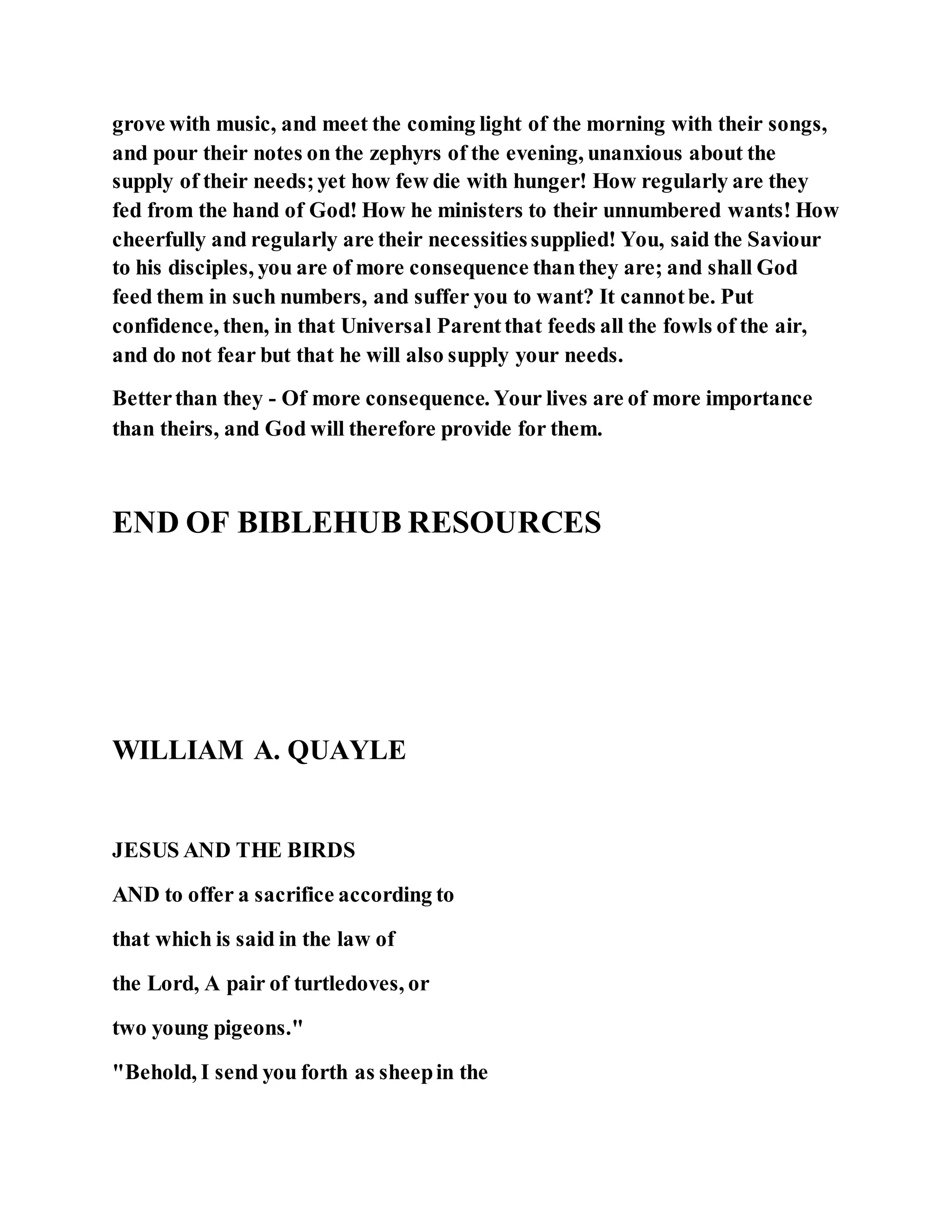


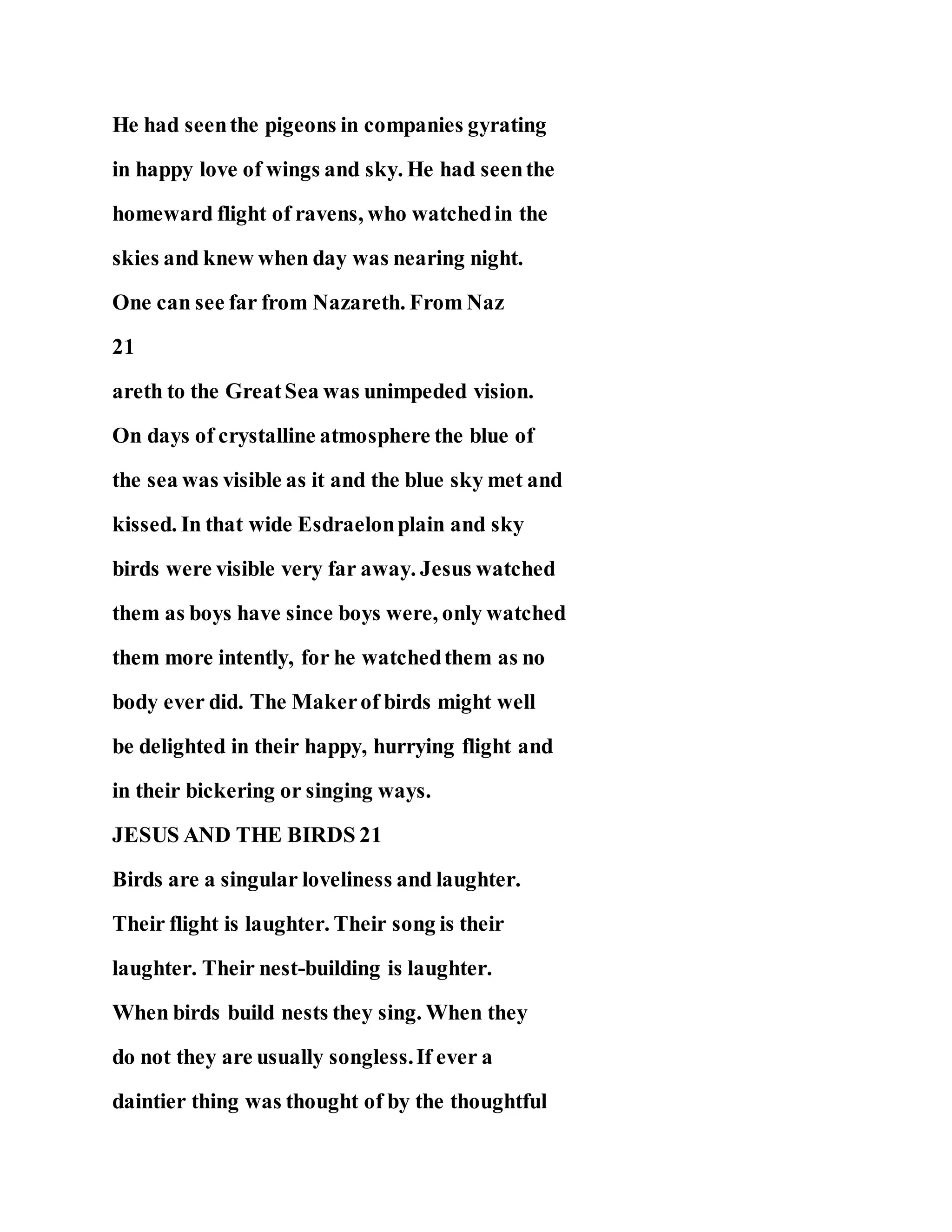


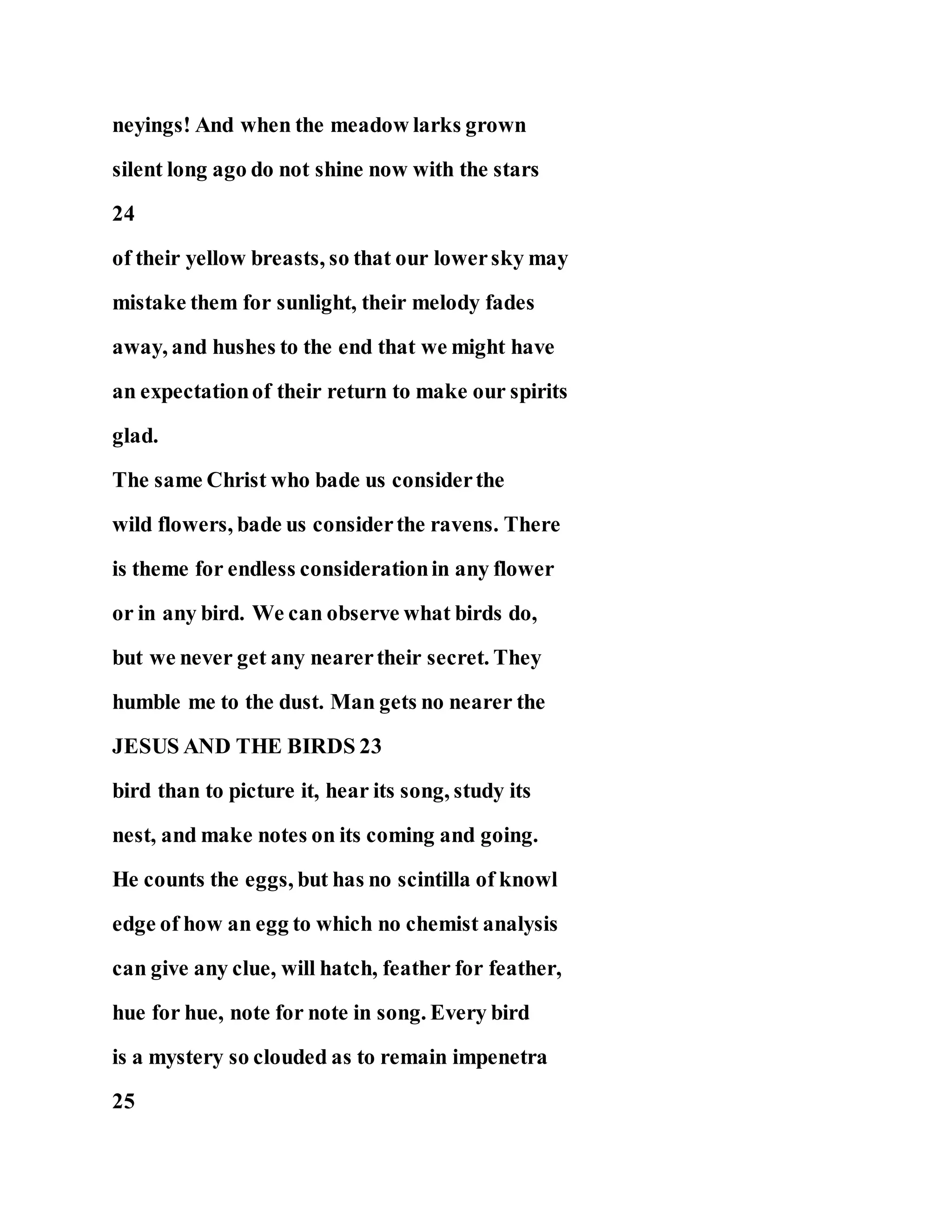
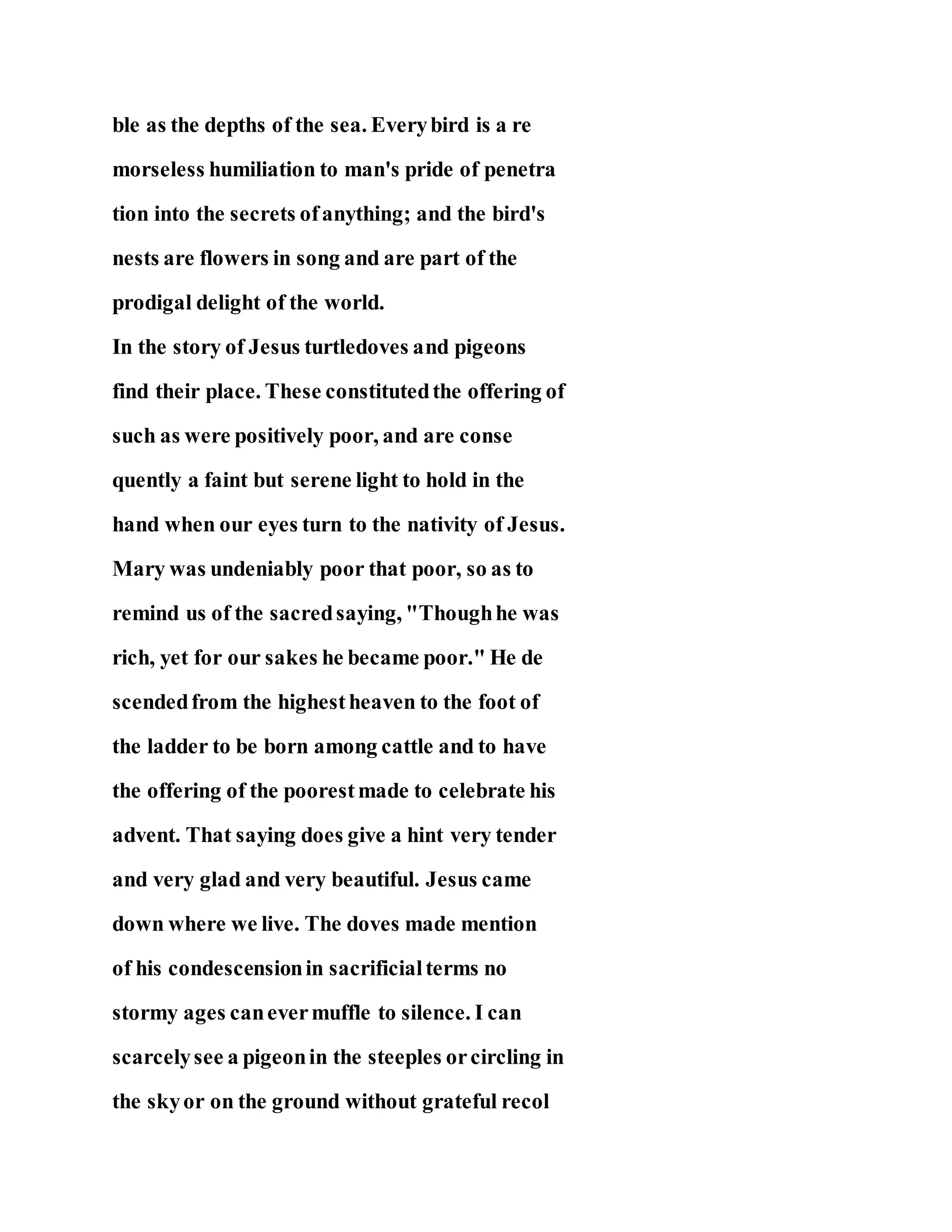
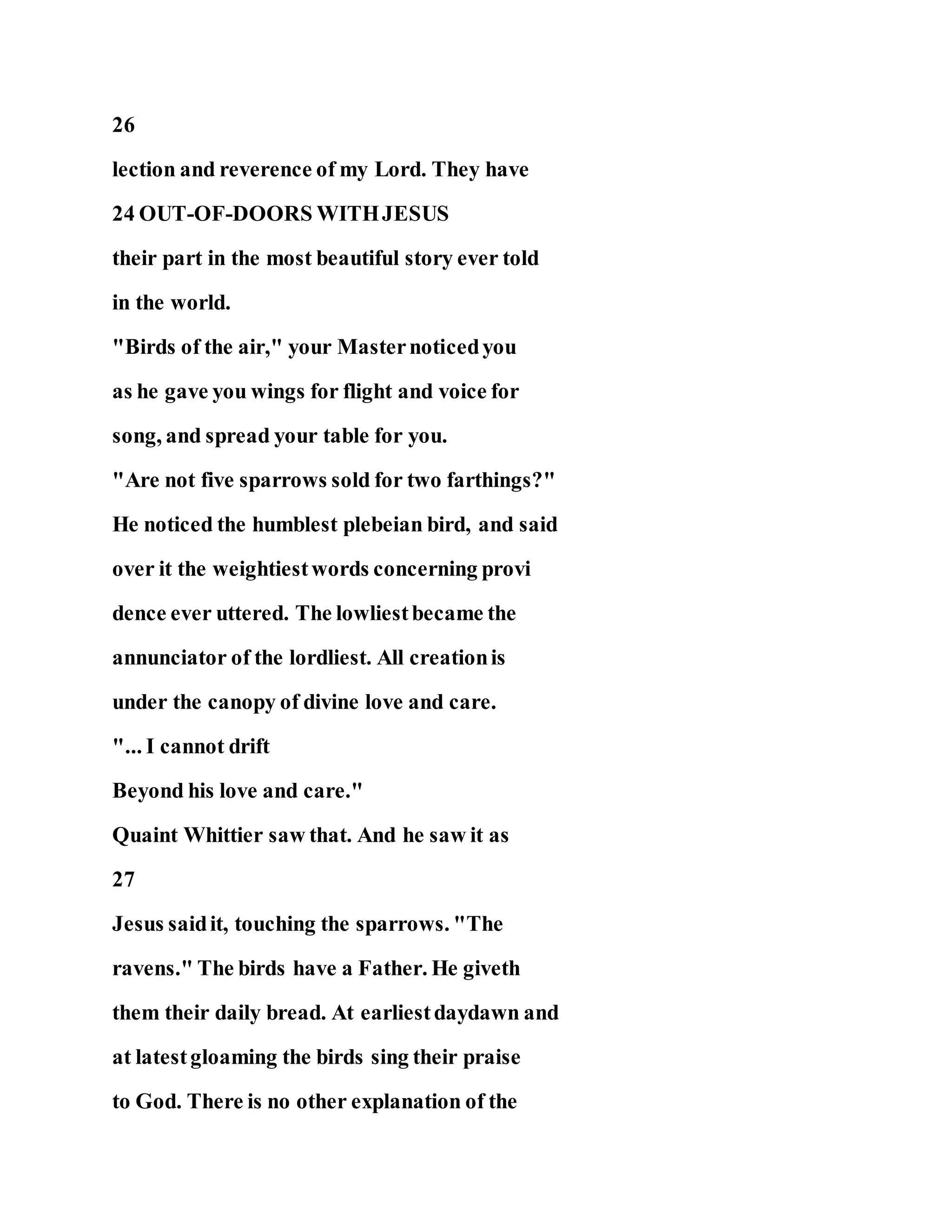


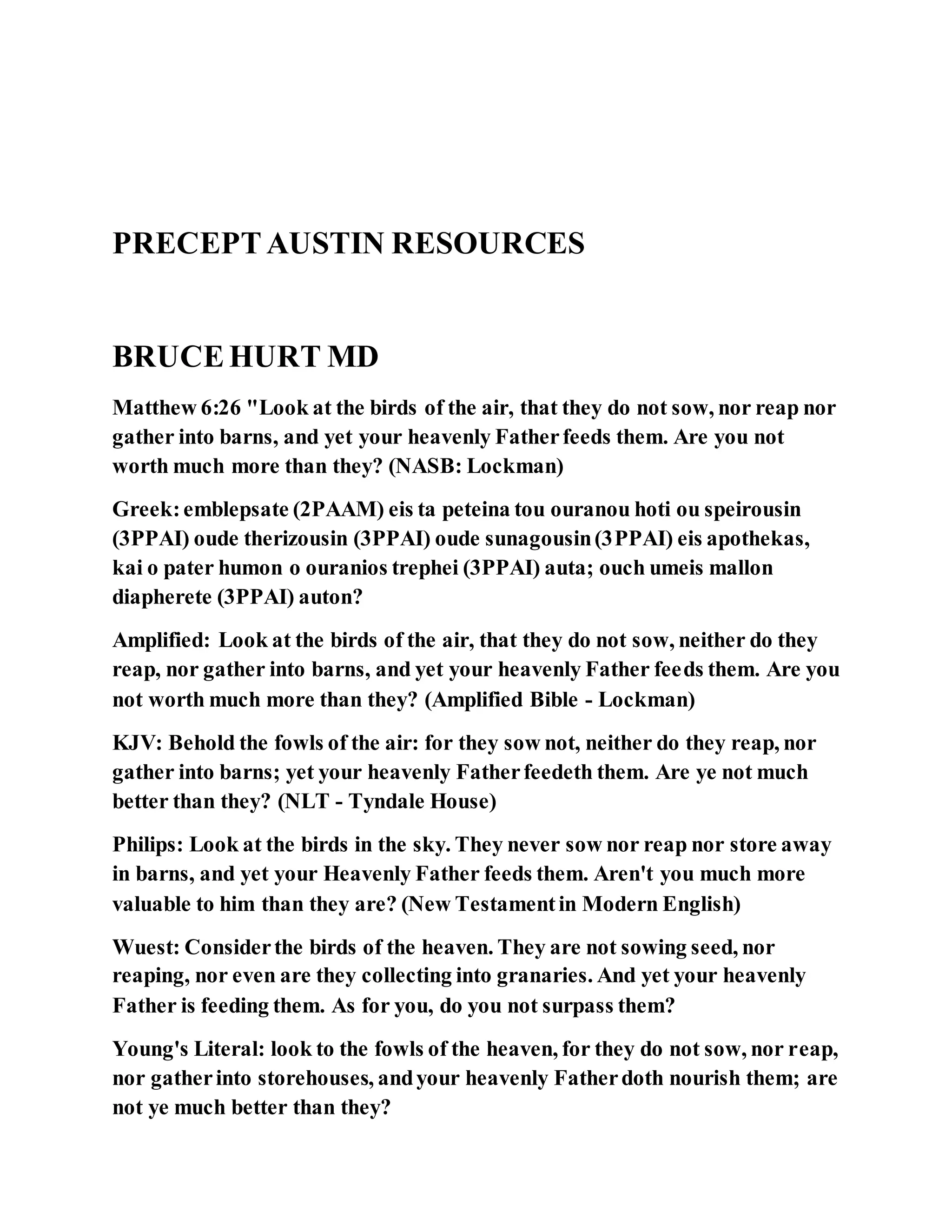

![Look (1689)(emblepo from en = in or on + blépo = to look)means to look in
the face, fix the eyes upon and so to stare at. It includes the idea of to
contemplate or consider. The aoristimperative is a command calling for one
to "look now", "look effectively", andcan even conveya sense of urgency.
One of the most dramatic NT uses is when "The Lord turned and lookedat
Peter" (Lk 22:61) after he had denied Him three times!
Friberg - literally, as an attentive looking on someone orsomething fix one's
gaze (earnestly) on, look at attentively (Lk 22.61);absolutely see clearly( Mk
8.25);be able to see (Acts 22.11);figuratively, as giving careful attention
consider, think about (Mt 6.26)
Gilbrant - It usually signifies a look of love, concern, or interest, as in the
accountof the rich young ruler (Mark 10:21). It can mean “to fix one’s gaze
upon” or “look atintently” as when the servantgirl lookedat Peter(Luke
22:56), or when Jesus lookeddirectly at the crowd after telling a parable
(Luke 20:17). Jesus turned and lookeddirectly (emblepō) at Peter after
Peter’s third denial (Luke 22:61). Emblepō also has a figurative meaning of
“to look at” in a spiritual sense, or “to consider” (Matthew 6:26; John 1:36).
There is also the possibility that emblepō can mean “able to see.” Acts 22:11
says Paul was unable to see afterhe was exposedto the light on the road to
Damascus. Emblepō is used to describe the sight of the formerly blind man
after Jesus healedhim (Mark 8:25).
Gilbrant - In classicalGreekemblepō is not used extensively but means “to
look in the face” or“to look at someone,”in the eyes, for example (Plato
Republic 10.608D). Emblepō can mean “to look into” in the sense of “to
investigate.” The Septuagintuses emblepō to translate three Hebrew words:
nāvaṯ, “to look, to behold, to consider” (Genesis 15:5);pānâh, “to turn
toward, consider” (Psalm40:4 [LXX 39:4]); and rā’âh, “to look at, consider”
(1 Samuel 16:7).
Emblepo - 10x in 10v - look(1), looked(5), looking(3), see(1).
Matthew 6:26 "Look atthe birds of the air, that they do not sow, nor reap
nor gatherinto barns, and yet your heavenly Fatherfeeds them. Are you not
worth much more than they?](https://image.slidesharecdn.com/jesuswasabirdwatcher-200703143708/75/Jesus-was-a-bird-watcher-32-2048.jpg)




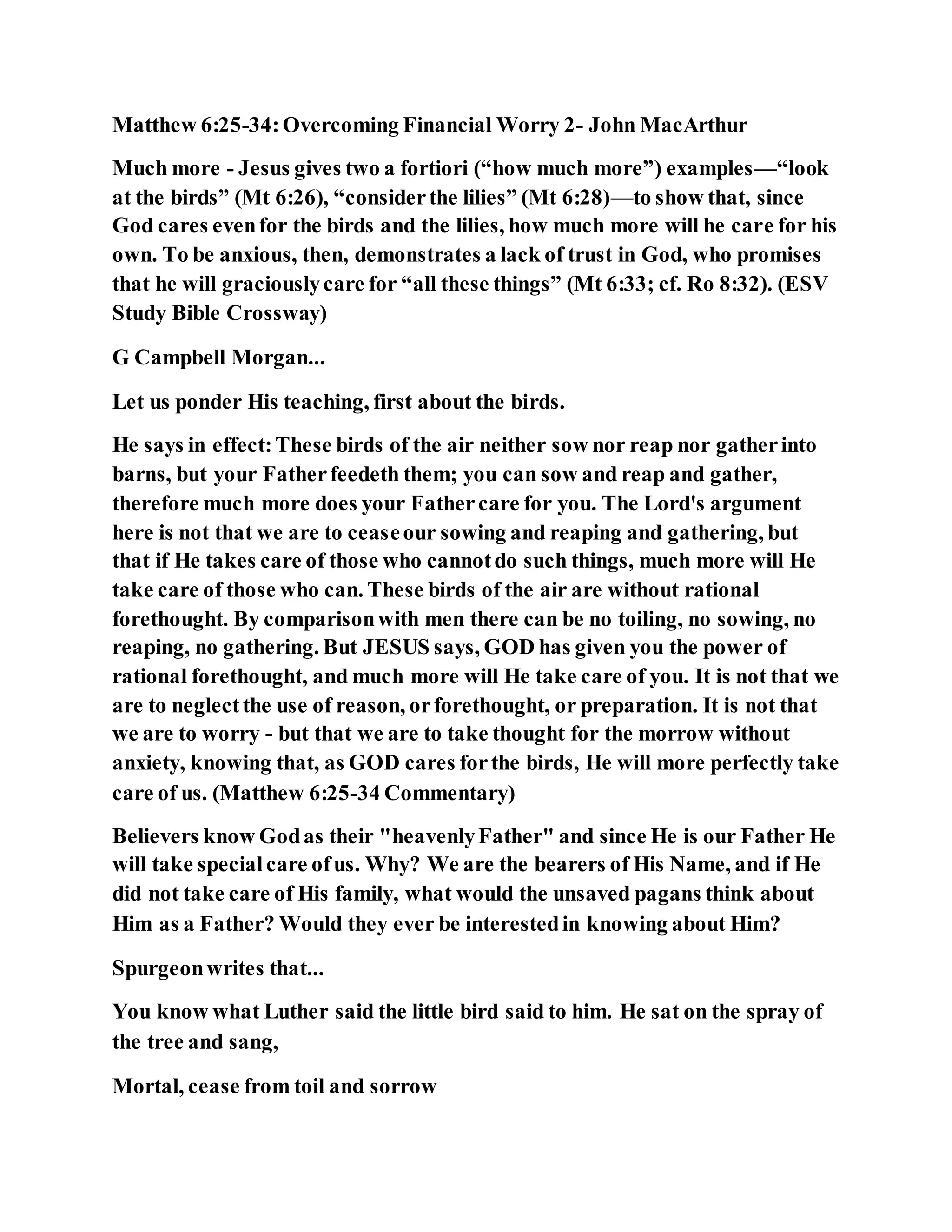

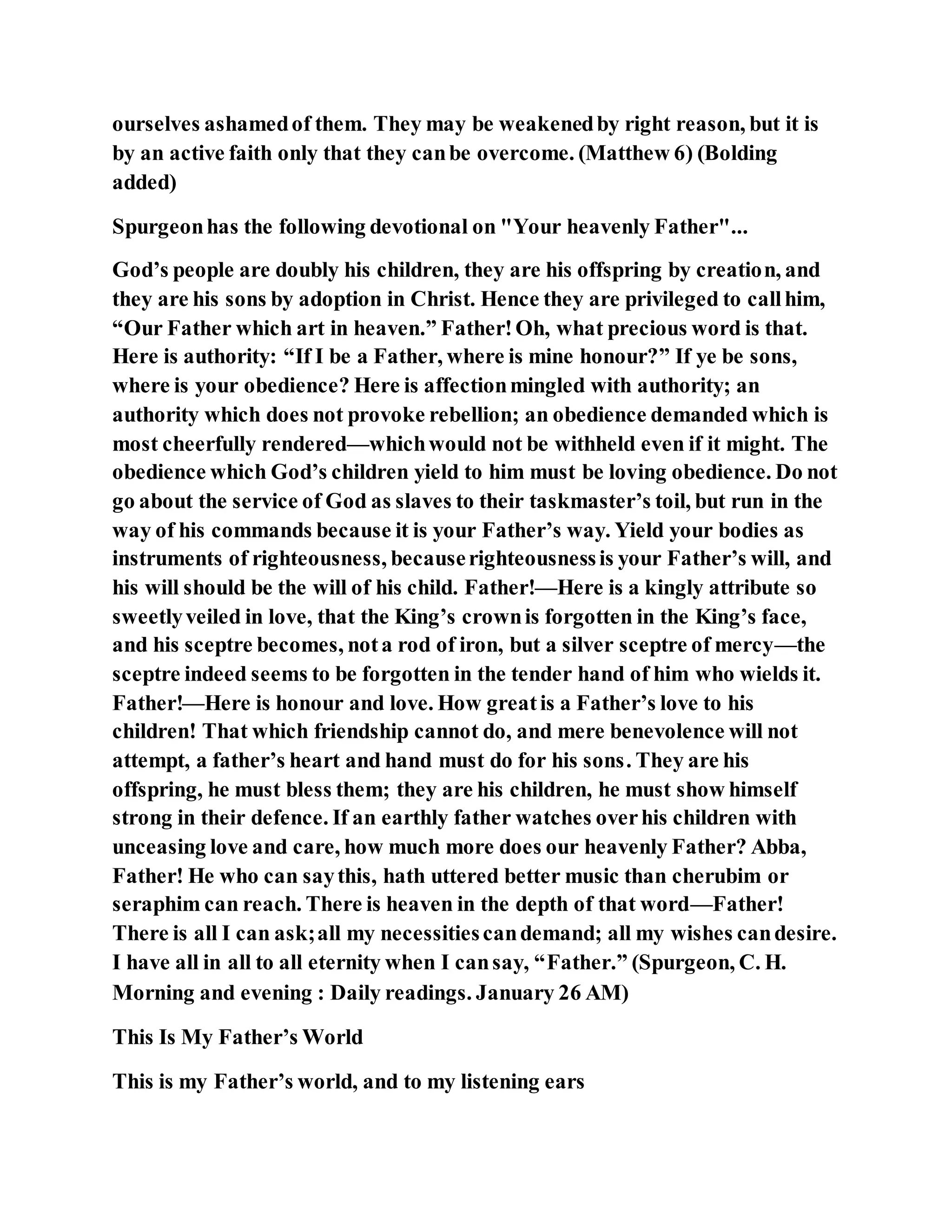
![All nature sings, and round me rings the music of the spheres.
This is my Father’s world: I rest me in the thought
Of rocks and trees, of skies and seas;
His hand the wonders wrought.
Feeds (5142)(trepho) means to nourish, feed or nurture.
If we worry constantly about having these essentials, we show that we have
not yet learned the basic lessonnature teaches thatGod provides for His
creatures’needs. Have you ever seena bird try to build more nests than its
neighbor. No fox ever worried because he had only one hole in which to live
and hide. No squirrel has ever been overcome by anxiety that he did not have
enough nuts storedfor two winters instead of only for one.
Birds work, hunting for the worms, etc God provides and then bring it back
to their baby birds, but they don’t worry.
ForgetWorry - Perhaps you've participated in an experiment where you were
given a phrase like "red car" and then were askedto put it out of your mind.
But the harder you tried, the more the "red car" dominated your thoughts.
This kind of exercise shows thatwe cannever forgetsomething by
concentrating on it.
Anxious thoughts, our natural response to the cares of life, are like that. Many
of us spend sleeplessnights trying to solve complex problems, and all we
accomplishis fixing them more firmly in our minds.
The Bible says that insteadof being weigheddown by our concerns, we should
give them to God. The apostle Peterput it this way: "[Cast]all your care upon
Him, for He cares foryou" (1 Peter5:7). And in Philippians 4:6, the apostle
Paul gave similar instruction.
Jesus told His disciples not to worry about the necessitiesoflife, because
"your heavenly Fatherknows that you need all these things" (Matthew 6:32).](https://image.slidesharecdn.com/jesuswasabirdwatcher-200703143708/75/Jesus-was-a-bird-watcher-40-2048.jpg)


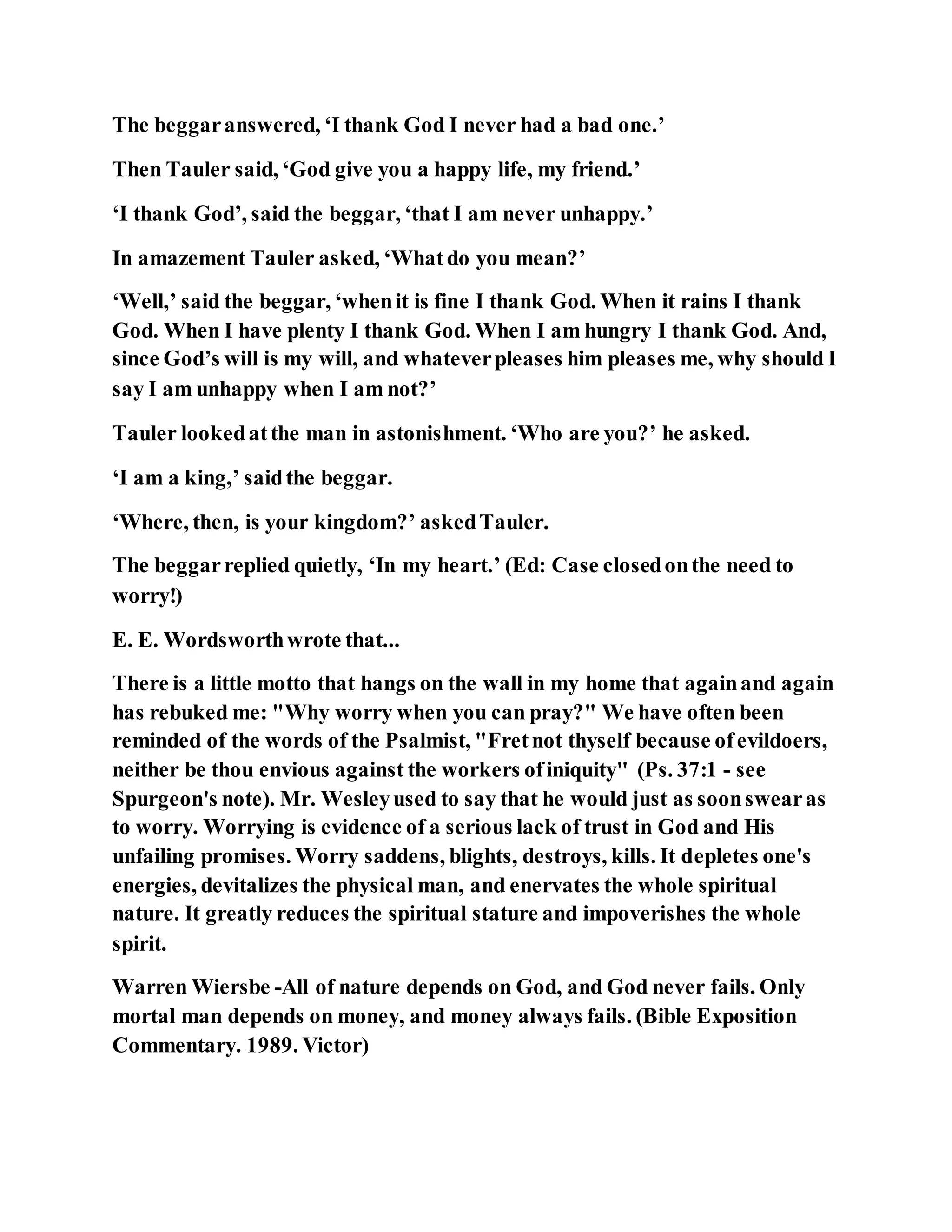
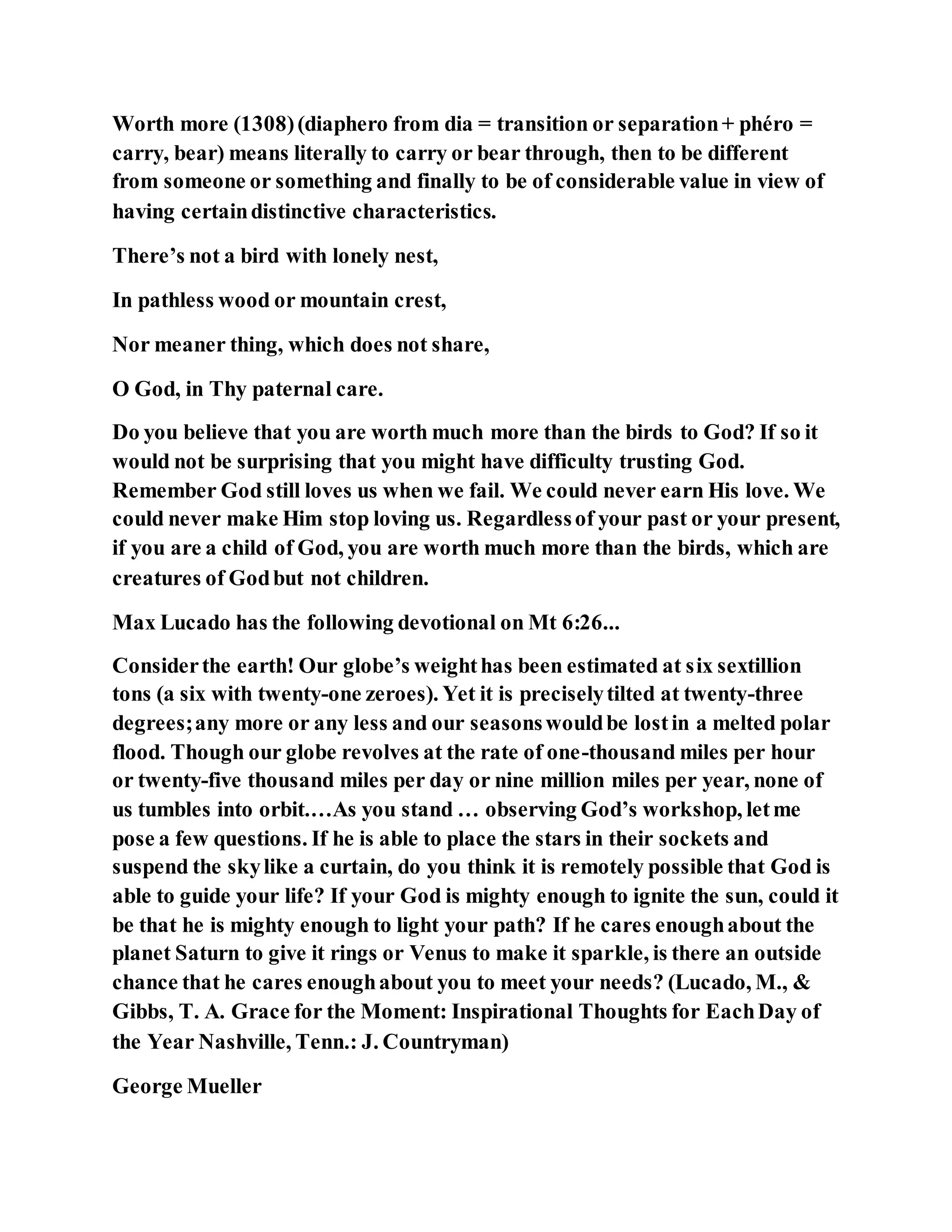







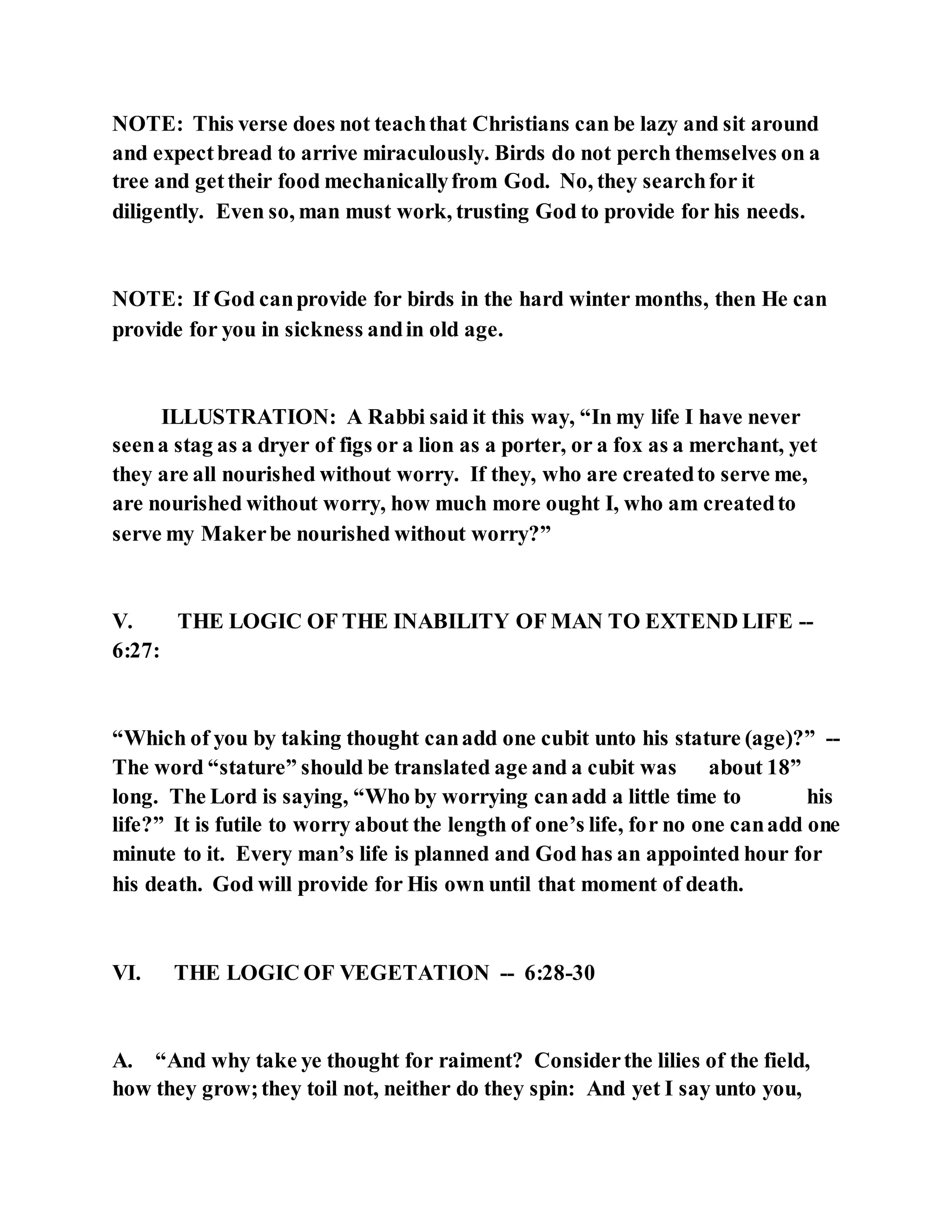




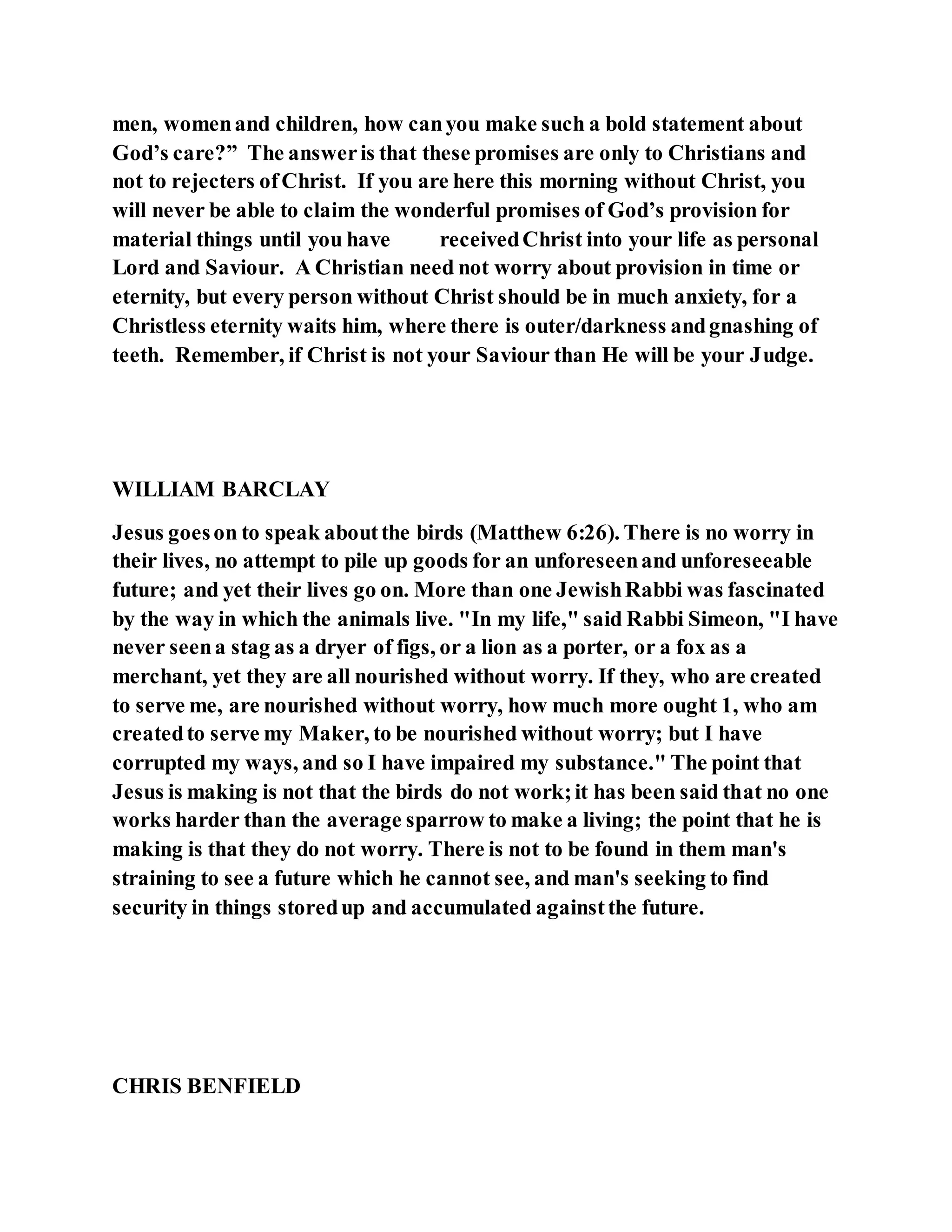
![A. The Fowls ofthe Air (26-27)– Behold the fowls of the air: for they sow not,
neither do they reap, nor gather into barns; yet your heavenly Father feedeth
them. Are ye not much better than they? [27] Which of you by taking thought
can add one cubit unto his stature? Take just a moment to considerthe
countless millions of birds that inhabit earth. They do not sow a crop or reap
one. They do not gather a greatharvest into a barn. They are fed by the
Master’s hand. Eachday they wake their needs are the same and eachday
their needs are met. They are expectedto
searchfor their food, often spending the bulk of their waking hours feeding,
but God is faithful to them nonetheless. He cares for them because they are
His creation.
Are ye not much better than they? Surely if God will care for the birds of
the air, He will care for those whom He has purchased in redemption. Just as
with the birds, we have to put forth the necessaryeffortmany times to receive
the provision of God, but He is faithful to us. Eachday we wake our needs are
much the same and eachday He provides for us. How many of us went
without a meal today? How many missed a meal this week because there was
nothing to eat? We will have to agree that God is goodand merciful to us.
Which of you by taking thought canadd one cubit unto his stature? Jesus
goes onto speak aboutsenseless worry. The word stature has the idea of
height, but it can also referto age or time. I can’t add one inch to my height
through worry, and I can’t add one secondto my life through much anxiety.
We have to live our lives before the Lord, seeking to please Him, and trust
Him to continue His care for us!
Matthew 6:25-34: “Jesus TeachesHis Disciples NotTo Worry Or Be
Anxious”](https://image.slidesharecdn.com/jesuswasabirdwatcher-200703143708/75/Jesus-was-a-bird-watcher-58-2048.jpg)



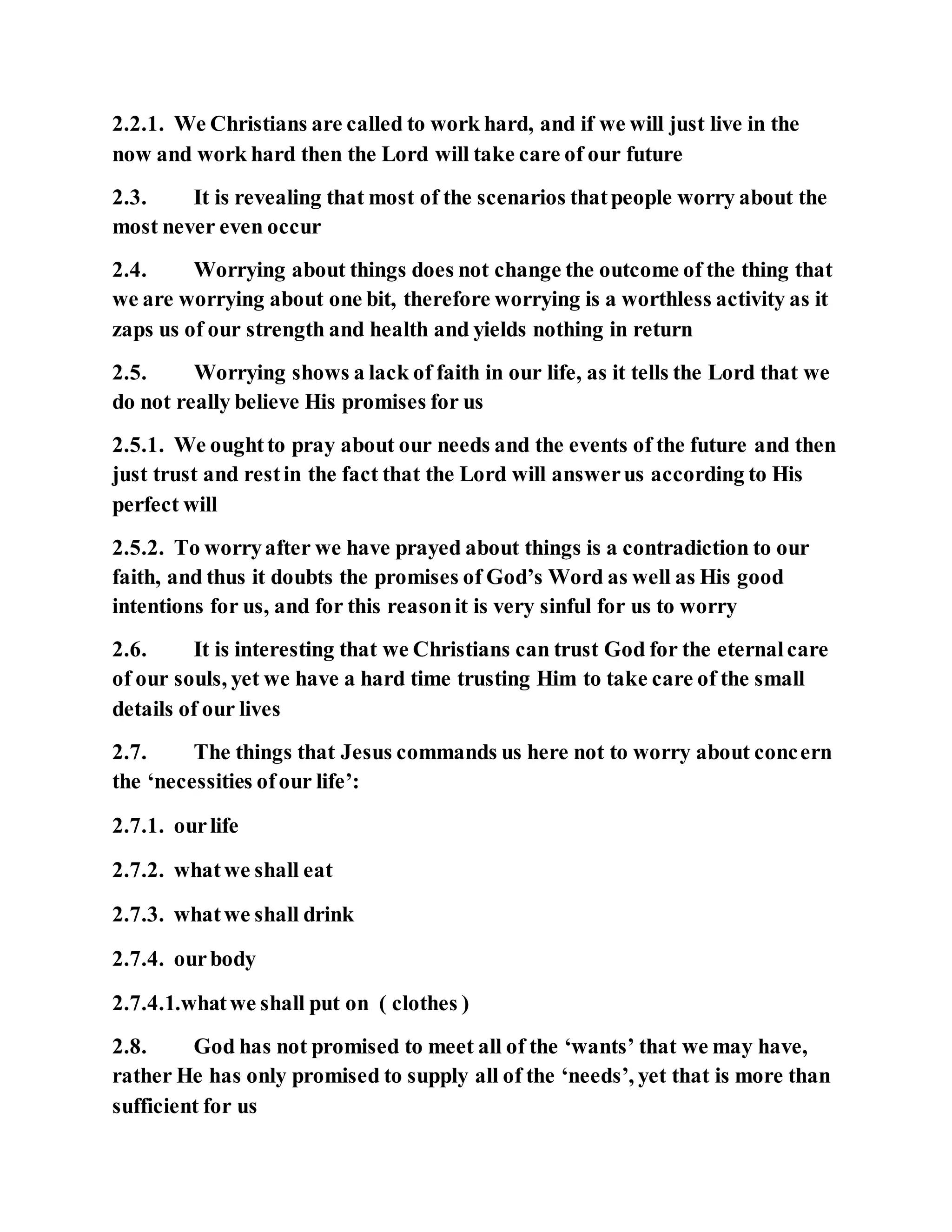


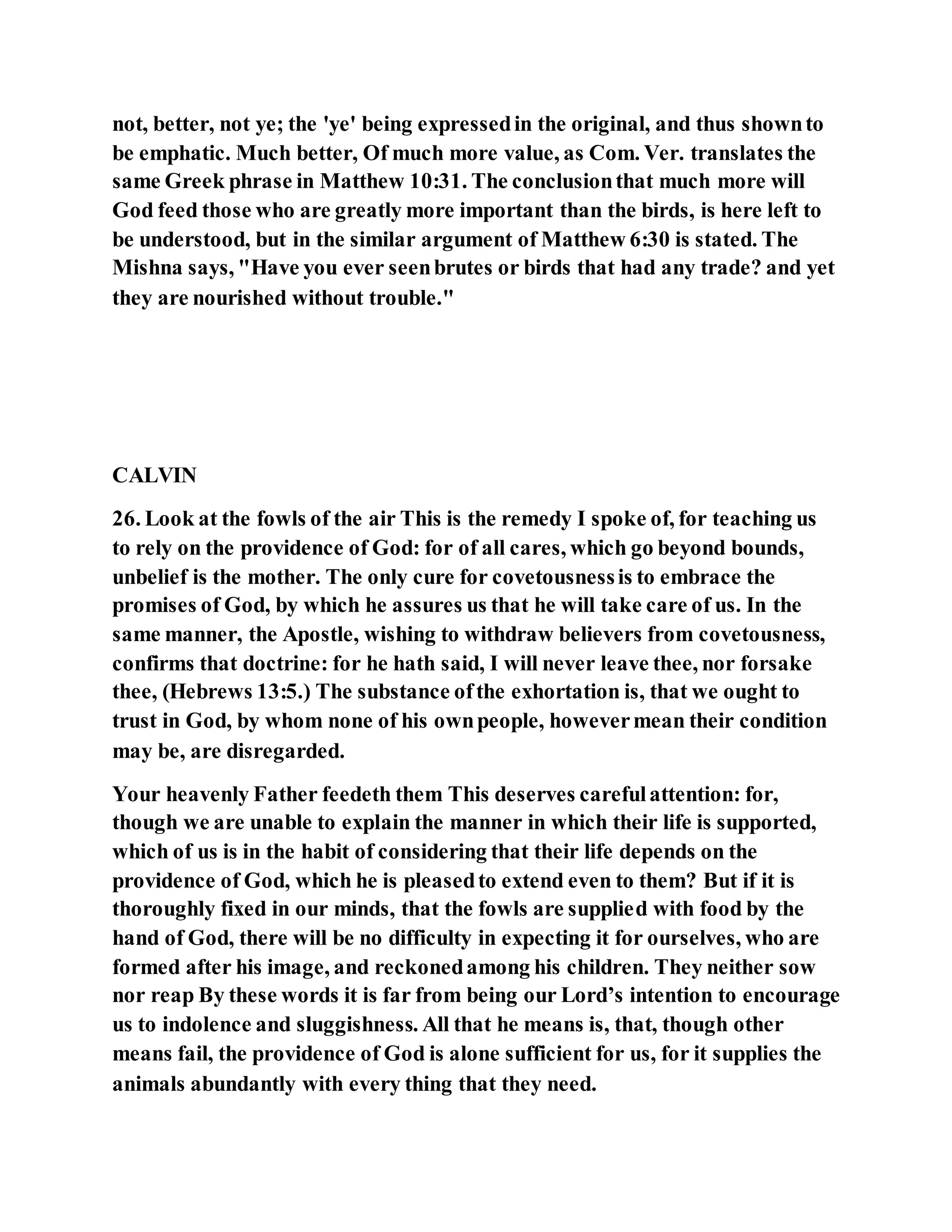
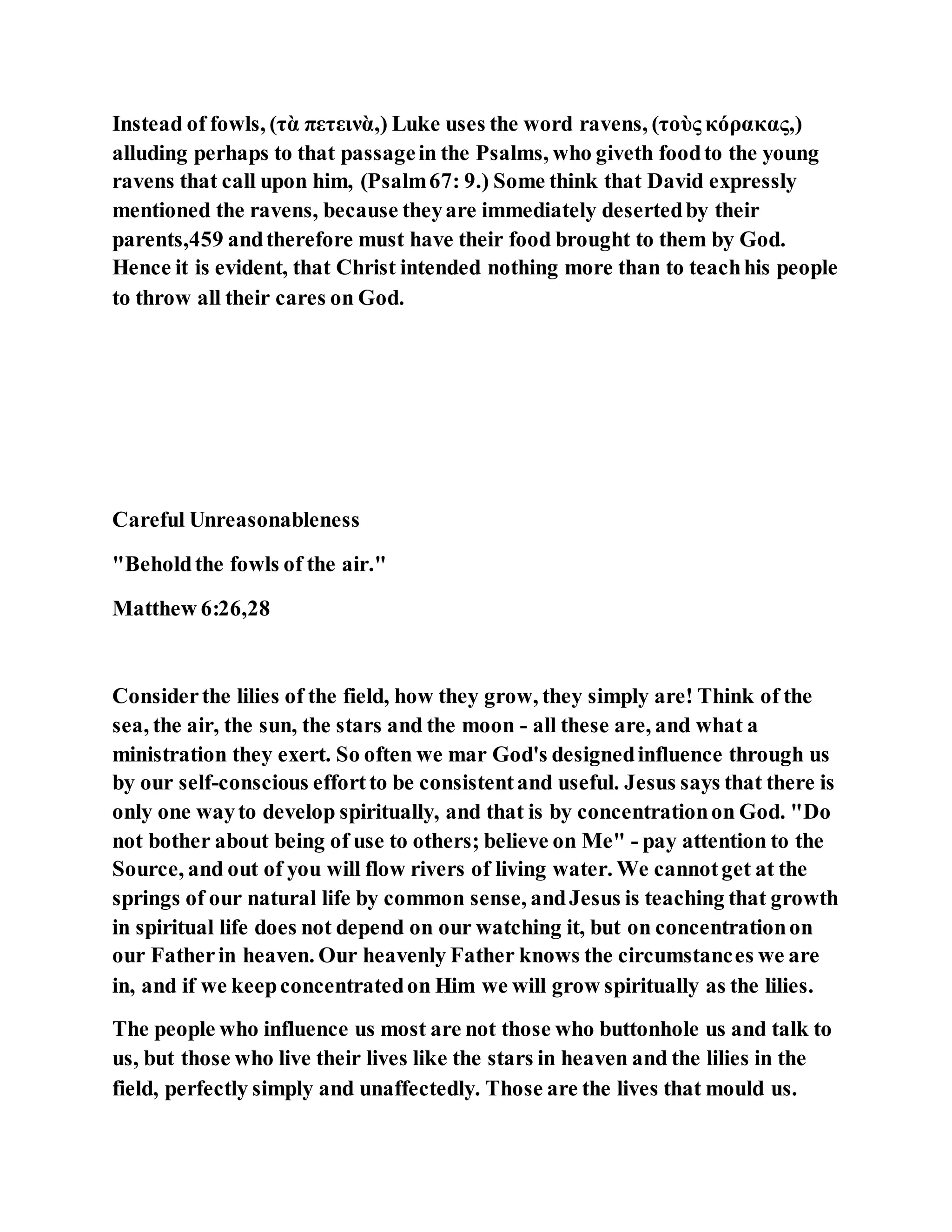
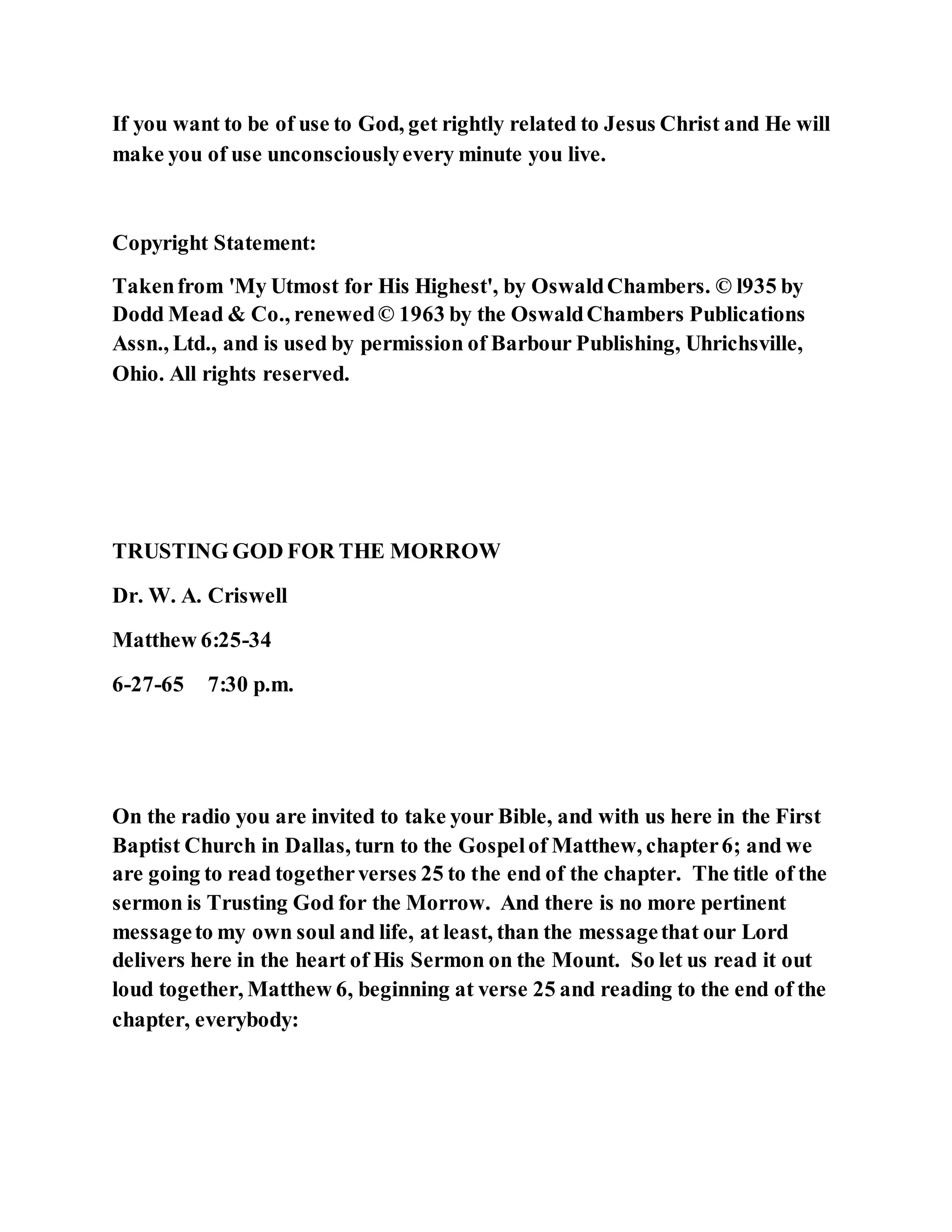
![Therefore I say unto you, Take no thought for your life, what ye shall eat, or
what ye shall drink; nor yet for your body, what ye shall put on. Is not the life
more than meat, and the body than raiment?
Behold the fowls of the air: for they sow not, neither do they reap, nor gather
into barns; yet your heavenly Father feedeththem. Are ye not much better
than they?
Which of you by taking thought can add one cubit unto his stature?
And why take ye thought for raiment? Consider the lilies of the field, how
they grow;they toil not, neither do they spin:
And yet I say unto you, That even Solomon in all his glory was not arrayed
like one of these.
Wherefore, if God so clothe the grass ofthe field, which today is, and
tomorrow is castinto the oven, shall He not much more clothe you, O ye of
little faith?
Therefore take no thought, saying, What shall we eat? or, What shall we
drink? or, Wherewithalshall we be clothed?
(For after all these things do the Gentiles seek:)for your heavenly Father
knoweththat ye have need of all these things.
But seek ye first the kingdom of God, and His righteousness;and all these
things shall be added unto you.
Take therefore no thought for the morrow: for the morrow shall take thought
for the things of itself. Sufficient unto the day is the evil thereof.
[Matthew 6:25-34]
There is a word that is used in that passagesixtimes; but doubtless because it
is so familiar to us we have hardly noticed it, and especiallyso since it is an
English translation of 1611 and has altogetherlost its meaning to us today as
it had then. Now the word in the passageis "thought," and it is used six](https://image.slidesharecdn.com/jesuswasabirdwatcher-200703143708/75/Jesus-was-a-bird-watcher-68-2048.jpg)
![times. "Therefore Isay unto you, Take no thought for your life, what ye shall
eat, or what ye shall drink" [Matthew 6:25]. Again, "Which of you by taking
thought can add one cubit unto the length of his life?" [Matthew 6:27]. You
see, the Greek wordthere is "length" and it canrefer to your height, or it can
refer, as your life is consideredas a span, just add another cubit to the length
of it. And that’s what I think the Lord meant: "Which one of you by taking
thought could add one cubit to the span, to the length of your life, one foot
beyond the grave?" that’s the secondtime it’s used.
Or again, "Why take ye thought for raiment? Considerthe lilies of the field"
[Matthew 6:28]. Now again, "Therefore take no thought, saying, What shall
we eat? or, What shall we drink?" [Matthew 6:31]. And then again,
"Therefore take no thought for the morrow: for the morrow shall take
thought for the things of itself" [Matthew 6:34]. Now six times that word
"thought" is used here in the King James Versionof the Bible. Now, allof the
previous translations, before the King James Version, translated that word
merimnaō, translated by "be not careful." But the 1611 King James
translators thought the word "be not careful" was not strong enough; so they,
they changedthe expressionto "take no thought, take no thought." Now I
want to show you what that meant when the King James Version of the Bible
was written.
Shakespeare livedwhen the King James Version of the Bible was written, and
in his play Julius Caesar, Iquote from the secondact, and the first scene,
"Take thoughtand die for Caesar." All right, againI quote from
Shakespeare,his Antony and Cleopatra; Cleopatra says to Enobarbus,
"What shall we do, Enobarbus?" And he replies, "Take thoughtand die."
Now Francis Bacon, who also was a contemporary with Shakespeare andthe
King James Versionof the Bible, in his history of King Henry VIII he speaks
of a man, and I quote, "Dying with thought and anguish before his case was
ever heard." Now a historian of the same period writes, "QueenAnne died of
thought." Now to us today that would be an unusual wayto commit suicide,
by thinking. Not many of us would have cause to die like that, would we?
"Take thoughtand die." And Queen Catherine died of thought. Well you
can immediately see, by quoting these passagesoutof the literature of the day](https://image.slidesharecdn.com/jesuswasabirdwatcher-200703143708/75/Jesus-was-a-bird-watcher-69-2048.jpg)
![in which the King James Version was translated, that "thought" had an
altogetherdifferent kind of a connotationthen than it does to us today.
Now the Greek wordmerimnaō means – well, let’s just look at it, let’s just
look at it. And that was a goodtranslation in 1611. Now I’m going to read
out of the Bible, and these are passageswhere that Greek word is used.
"Jesus answeredand said unto her, Martha, Martha, thou art merimnaō and
troubled about many things; but one thing is needful: and Mary hath chosen
that goodpart, which shall not be takenawayfrom her" [Luke 10:41-42].
That was when Martha was complaining about Mary, who was seatedat the
feet of the Lord listening to what He said, and she was in their cooking dinner
[Luke 10:38-40].
I’ve always had sympathy with Martha. I just can’t help but do that. Yet the
Lord said, "Now Mary, sitting down here listening to Me talk, that is a whole
lot better than going in there and preparing dinner." That shows you how
much more spiritual Jesus is than I am. I’d turn the thing around, I would.
I’d say, "Martha, you’re really doing goodover there cooking dinner. Keep it
up. Add another pot, add another dessert, getyou another Jerseycow, we’re
going to need it for this preacher." You know, that’s what I’d say.
But, oh! Notthe Lord: "Martha, Martha, thou art merimnaō about many
things," and it’s translatedhere "thou art careful about many things" [Luke
11:41]. All right, here’s another one. Oh, there are many things! It is just a
common word in the Greek, and it’s used all through the Bible. Here is
another one, in the famous passagein Philippians 4:6, "Be merimnaō for
nothing; but in everything by prayer and supplication with thanksgiving, let
your requests be made knownunto God."
And then here is another one in Simon Peter, chapter 5, his first letter in
[verses]6 and 7, "Humble yourselves therefore under the mighty hand of
God, that He may exalt you in due time; casting all your merimnaō upon
Him" [1 Peter5:6-7]. Well, when I read the passagein its context,
immediately the meaning of the Greek wordis apparent. And it is exactly
what these translators were trying to achieve in 1611. Merimnaō, the Greek
word, meant cankering care, corrosive anxiety, despair and frustration that](https://image.slidesharecdn.com/jesuswasabirdwatcher-200703143708/75/Jesus-was-a-bird-watcher-70-2048.jpg)
![comes from worrying about a tomorrow. Now that’s what the word means.
And that is the way the Lord is using it here in this passage.
So let’s take it in this passage, and look at it and apply it to ourselves. Firstof
all, our Lord – – and He says three things here, and we’re going to follow
them, one, two, three – – first of all our Lord says that the lessons ofnature
teachus that merimnaō is unnecessary. And He gives an illustration: "Why,"
He says, "Look at the birds that fly: they do not sow, they do not reap, they
do not gather in barns; yet your heavenly Father feedeththem. Why should
you be filled with corrosive, cankering anxietyabout what shall happen to us
in the care of us on any tomorrow?" [Matthew 6:26-27]. It is unnecessary
says our Lord.
Then He used another illustration: "These lilies of the field, look at them: they
do not toil, they do not spin and yet I say unto you, that Solomonic glory was
not as brilliant, and as colorful, and as beautiful as those lilies that God arrays
in their beauty and glory" [Matthew 6:28-29]. These,the Lord says, these, the
birds that fly and the flowers that bloom, they do not have the prerogatives,
and the authority, and the power, and the endowments that you have. Why,
we can plow, and we can sow, and we can reap, and we can gatherinto barns
and we can keepfor a future day; these have none of those things, none of
those endowments, yet God takes care ofthem. Why shouldn’t the Lord God
in heaven, our Father, also take care ofus?
Then He gives an illustration: "Is not the life more than meat, and the body
more than raiment?" [Matthew 6:25]. He is drawing an illustration there
betweenthe things that are far more important over which we have no control
at all. Why, a man canhave nothing in the choice of his body, his body. Did
you choose the colorof your eyes? Did you choosethe height of your stature?
Did you choose the generationin which we were born? Why weren’tyou
born a hundred years ago? Or why weren’tyou born fifty years since? Do
you choose anyof those things? Did you choose the soulthat inhabits your
body? Are you going to choose the greatultimate consummation by which
God shall change the destiny of this world?](https://image.slidesharecdn.com/jesuswasabirdwatcher-200703143708/75/Jesus-was-a-bird-watcher-71-2048.jpg)
![Why, everything that is really important, your mother chosenfor you, your
father chosenfor you, your body chosenfor you, all of the generations chosen
for you, everything that is really vital and important, God has chosenfor you!
How much more then should we trust God, if we trust Him for these great
things in life? How much more should we trust God for the lesserthings in
life? What I’m going to wear, and what am I going to eat, and where I am I
going to sleep, and what shelter shall I have, and all the other things by which
people just frustrate themselves and sometimes worry themselves to death.
Let’s see if I canremember that thing, it’s coming back in my head:
Said the robin to the sparrow,
"I would really like to know
Why these anxious human beings
Rush around and worry so."
Now the reply:
Said the sparrow to the robin,
"It surely must be
That they have no Heavenly Father
Such as cares for you and me."
["Overheardin an Orchard," Elizabeth Chaney, 1859]
See? I came out all right; I really don’t know if that’s where it goes ornot,
but that’s the sentiment.
Now the Lord will tell a parable – such as "the unjust steward" [Luke 16:8] –
the Lord will tell a parable about foresightand forethought, for a man to
think about the future and to plan for the future, but foreboding, the Lord
says, is interdicted. It ought not to be in our lives, that anxious worry about](https://image.slidesharecdn.com/jesuswasabirdwatcher-200703143708/75/Jesus-was-a-bird-watcher-72-2048.jpg)
![the morrow [Matthew 6:34]. Look at the lily of the field, look at the bird of
the air; and God takes care ofthem [Matthew 6:26-29].
Now one thing about the birds, don’t getany idea that they just open their
mouth and the Lord feeds them. You know, they get up at the crack of the
dawn and they stay with it all day long. Well, if you’ll get up at the crack of
dawn and stay with it all day long, you don’t have anything to worry about.
God will take care of you, He really will. He really will.
You know a lazy fellow; I don’t have any use for him at all, I just don’t. I
think he’s a parasite, I think he’s a fungus, I think he’s a mistletoe; there’s not
anything goodthat I can think of about a parasite. I think people ought to
work – I think all of us ought to work – I think a preacherought to work.
And if I don’t work harder than anybody in this congregation, I think you
ought to sit up with me and have a sessionwith me. I think you should.
All of us ought to work, but we ought to work and not worry [Matthew 6:34].
We ought to work and not be filled with cankering anxiety, and corroding
care, and all of those forebodings that lie ahead in the providence of God.
Work, do your best, and then let God decide the ultimate, and the final end
and consummation. Turn it over to Him. All right that’s the first thing.
All right, the secondthing here the Lord says:He says, true religion – the
revelation of the true faith – makes our anxiety, and our worry, and our care
heathen. That’s what He says, now look:
Therefore take no thought, do not be anxious and full of care, saying, Oh what
shall I eat? What are we going to drink? What are we going to be clothed?
And how are we going to live? For after all these things do the heathen worry
about. But you, your heavenly Father knowethye have need of all these
things. Seek Godand all of these things the Lord will add unto you.
[Matthew 6:31-32]](https://image.slidesharecdn.com/jesuswasabirdwatcher-200703143708/75/Jesus-was-a-bird-watcher-73-2048.jpg)
![The secondthing our Lord avows, that in the true faith and in the true
religion, these who know God and who worship our Father, to be anxious, to
be full of care, to be worrisome and filled with foreboding is to be like a
heathen! And that’s what they do.
Oh, have you ever visited among heathen people? I tell you, the things that fill
their minds with gross terrors, and superstitions, and dreads;they are afraid
of everything. They worship the devil. They worship the stones. They
worship the trees. Theyworship the wind. There’s not anything of which
they are not afraid, and there’s not anything of which they don’t have a dread
for what tomorrow is. And they live in that fear, and that darkness, and that
superstition.
And we are that way when our lives are filled with all of those dreads and
fearsome things of what lies ahead, or the tomorrow, or what’s all around us.
"Don’t," says the Lord, "don’t; for when you are that way, you are just like a
heathen. But you, you know God the heavenly Father, and He knows all
about your need, and He will provide for it" [Matthew 6:30-34]. Just trust
Him. Just believe in Him, and leave it to His gracious hand, and see if God
doesn’t do it.
You know this passagethat I read here using that word in Peter[1 Peter5:6-
7], brings back to my heart one of the, oh! most moving experiences ofmy life,
oh, oh! As you know, I started preaching when I was seventeenyears old, and
I was holding – scheduled, invited to hold – a revival meeting in a tabernacle
down there in centralWestTexas. And the tabernacle was locatedby a
beautiful little white church with columns out in front of it and over here a
parsonage andabout ten or fifteen acres ofground surrounded by a fence,
and that was the Baptist church.
And in that enclosure was this tabernacle. Well, I was to hold the revival
meeting, a teenager. And when the evening came, the first night of the
revival, I went down there and I thought the world was turning out, the whole
earth was assembling. There were people coming there by horseback, there
were people pouring into that enclosure by buggy and wagon;they were
coming by such cars as they had in that day, and they were coming afoot.](https://image.slidesharecdn.com/jesuswasabirdwatcher-200703143708/75/Jesus-was-a-bird-watcher-74-2048.jpg)
![They were coming by twos, they were coming by singles, they were coming by
families; they were coming from the ends of the earth! And every last one of
them that came just scaredme that much more. And I nearly died in my soul.
My heart pounded, you could hear it; and my throat was dry, and my tongue
clave to the roof of my mouth; and I thought I was going to die! And I said to
the singer, "I think I’m going to die. I’m just not going to live, I just can’t.
I’m scaredto death, I’m paralyzed. I can’t breathe, and I can’t talk, and my
throat is dry, and it’s awful! Look at all these people, just acres of them, and I
don’t know what I’m going to do. I don’t know what I’m going to do!"
Well, he was an older man in the Christian faith than I, and he said, "Now
you just come with me, young fellow, you just come with me." And he took
me back of the parsonage, whichwas empty, and there were some steps going
from the kitchendoor down to the ground. And he said, "Now you sit down
here by my side." And I sat down by his side, and he openedhis little New
Testament, and he read to me this passage, one I’ve just read to you:
"Humble yourselves therefore under the mighty hand of God, that He may
exalt you in due time; casting all your merimnaō on Him, casting all your
anxiety and fears upon Him" [1 Peter5:6-7]. Now he said to me, "You get
down here by my side." And I knelt down there by those steps, and he put his
strong arm around my shoulder, and he prayed for the young preacher.
Listen, dear people, you should have heard me in those days. Oh my, my!
Why, I preachedall over that tabernacle – I preachedall over the grounds, I
preachedup and down every aisle – why, you never saw the like! "And the
Lord came down our souls to greet, and glory filled the mercy seat" [from
"From Every Stormy Wind that Blows," Hugh Stowell];why, people were
shouting, they were singing praises to God, they were clapping their hands,
they were being converted. It was like an old time Pentecostalrevival!
I forgotabout my throat being dry, I just never did think about it. I forgot
my heart was pounding, I forgotI was scaredto death, I just forgot
everything in the glory of the presence of God. That’s what he’s talking
about. Now to heathen, it’s a heathen, when you are fretful, and full of
foreboding, and cankering anxiety; but it’s a Christian who rejoices in the](https://image.slidesharecdn.com/jesuswasabirdwatcher-200703143708/75/Jesus-was-a-bird-watcher-75-2048.jpg)
![goodness ofGodand looks to heavenfor an answerfrom glory. That’s it.
That’s it.
Now there’s one other thing, one other thing, and we got time for it. Notonly
does He say that we have here in this cankering care, we have a thing that is
unnecessaryif we just look at all of the blessings ofnature [Matthew 6:26-30].
And not only, He says, is it not Christian and it doesn’t honor God, we’re just
like heathen when we do that. Then He says a last thing, He says in the
economyand in the scheme of the providences of God, it is futile. "Therefore
take no thought, no merimnaō, for the morrow; for the morrow shall
merimnaō for the things of itself. Sufficient unto the day is the evil thereof"
[Matthew 6:34].
What does our Lord say? Oh, it is very plain, and very pertinent, and very
pungent and very pointed what He says. He says that every day shall have its
share of merimnaō, don’t you worry, don’t you seek it, and don’t you add to
it, there’s going to be evil in every day, plenty of it. And there’s going to be
discouragementin every life, plenty of it. And there’s going to be things that
just bow you down and break your spirit, plenty of it. Don’t add to it, says
our Lord. There’s plenty of it in everybody’s life, and you can’t escape it.
You can’t escape it. You cannotobviate it [Matthew 6:34].
Do you remember reading about Achilles? His mother was a sea nymph. Her
name was Thetis. And she said, "I’m going to take this little boy, and I’m
going to make him invulnerable and invincible; and there is no evil ever going
to touch my son." So she took him down to the River Styx, and she held him
by his heels, and she dipped him in the River Styx to make him invincible and
invulnerable.
And all the days of his life the greatAchilles was the hero of all of the Greek
world. And in the Trojan War, Hectorcame out, the great champion of the
Trojan people, Hector came out and challengedAchilles, and Achilles slew
him. But, but, Paris took an arrow, poisoned the tip of it, and struck Achilles
in his heel, where his mother held him when she dipped him in the River Styx;
and Achilles died from the poison arrow.](https://image.slidesharecdn.com/jesuswasabirdwatcher-200703143708/75/Jesus-was-a-bird-watcher-76-2048.jpg)
![You can’t escape it. Those Greekshad an insight into human life that is
phenomenal. Sometimes you can almostsay those stories are inspired. You
can’t escape. It’s coming, plenty of it, in your life, lots of it.
Could I take an illustration out of sacredliterature? Ahab saidto Micaiah,
"Take this man who prophesies evil with me, when I go up to Ramoth-gilead
to take it, take Micaiahand put him in prison, and feed him bread of affliction
and waterof affliction, until I come back in triumph and prove that the Spirit
of God is not in His prophet." And Micaiahsaid, "If you come back at all . . .
the Lord hath not spokenunto me" [1 Kings 22:26-28].
And in the battle at Ramoth-gilead, even though Ahab disguisedhimself, there
was a man that drew back his bow at a venture. He aimed his arrow and he
let fly his arrow without aiming it. And that arrow sped its way, and in a joint
in the harness of Ahab entered in, and went through his heart, and his blood
flowed out on the floor of the chariot [1 Kings 22:34-35]. And they took him
back to Jezreeldead [1 Kings 22:37].
You can’t escape it. Don’t you ever persuade yourself that, "I am an electof
God, and there are fortunes that guide my life and there are providences that
rule over my days, and I shall be untouched by all of these sorrows and trials
that plow up other people." Don’tyou think that. They’re coming to you,
just as they have come to your neighbor, and just as they have come to the
man that lives on the other side of the tracks. All of us alike, "Sufficient unto
the day is the evil thereof" [Matthew 6:34]. All of us shall experience it.
Well, what shall I do, worry about it? I know that there are dark days as well
as light ones that lie ahead. I know there are tears as well as smiles that lie
ahead. I know that there are a thousand dark things that lie ahead. Why, if
nothing else, and if Jesus delays His coming, shall it be cancer? Shallit be
arthritis? Shall it be multiple sclerosis? Shallit be a stroke? Shallit be
invalidism? And when? What shall it be?
Why man, whateverit is, let God decide and trust Him for it. I have strength
for the day. Isn’t that what the Book says? "And as thy days, so shall thy
strength be" [Deuteronomy 33:25]. I have strength for this day; but I don’t](https://image.slidesharecdn.com/jesuswasabirdwatcher-200703143708/75/Jesus-was-a-bird-watcher-77-2048.jpg)
![have strength for the foreboding. And when the time comes in any trial that
arises, there will be grace for that day when it comes.
How many times do people come up to me and say, "Pastor, youknow, I don’t
know whether I’m savedor not. I don’t know whether I’m a Christian or not.
I’m afraid to die. I’m afraid to die. It scaresme to death when I think about
dying." Why man, that’s an exact illustration of what the Lord is talking
about.
Well, you’re not ready to die yet. Wait until the day comes, and as you have
grace for the trials of this moment, and as you have strength from heaven for
the sorrows thatmay appear this moment, so you will have strength and grace
when the moment comes to die. You don’t need dying grace now. Thatcomes
then when you need it. And if God bestowedit upon you now, why the
wisdom of God when you don’t need it? Wait for that day and that hour, and
dying grace will be given to you then.
In one of my pastorates,abouttwo blocks down the street lived one of the
godliest, saintliestold soldiers of Jesus, an old preacher, that I ever knew in
my life. Oh, the churches he’d organized, and the sermons that he preached,
and he’d organized! He’d built an orphan’s home and takencare of a
generationof many, many children. He was a greatold man of God. And I
tell you, I went down to see him and he was dying. And you know what that
man said to me? There, lying on his deathbed, just this side of glory, he said
to me, he said, "Oh, oh, is it like this to die? Oh," he said, "I hear angels
singing." And he says, "And I see the pearly gates ofglory." And he says,
"And I see the golden streets." And he says, "I hear the voice of God." And
he says, "And I see the face of the blessedJesus. Oh," he said to me, "who
would ever have thought that to die was like this?" My soul! "Oh, who would
ever have thought that to die would be like this? Angels singing, and visions
of glory, and the face of Jesus."
Let it be that when the time comes;grace for that hour as God shall give us
grace for this. "Therefore be not anxious, full of carking care, frustrating
anxiety, for the Lord knows all of the things you have need of" [Matthew
6:31-34], and He will give us grace for now and strength for now, and help for](https://image.slidesharecdn.com/jesuswasabirdwatcher-200703143708/75/Jesus-was-a-bird-watcher-78-2048.jpg)




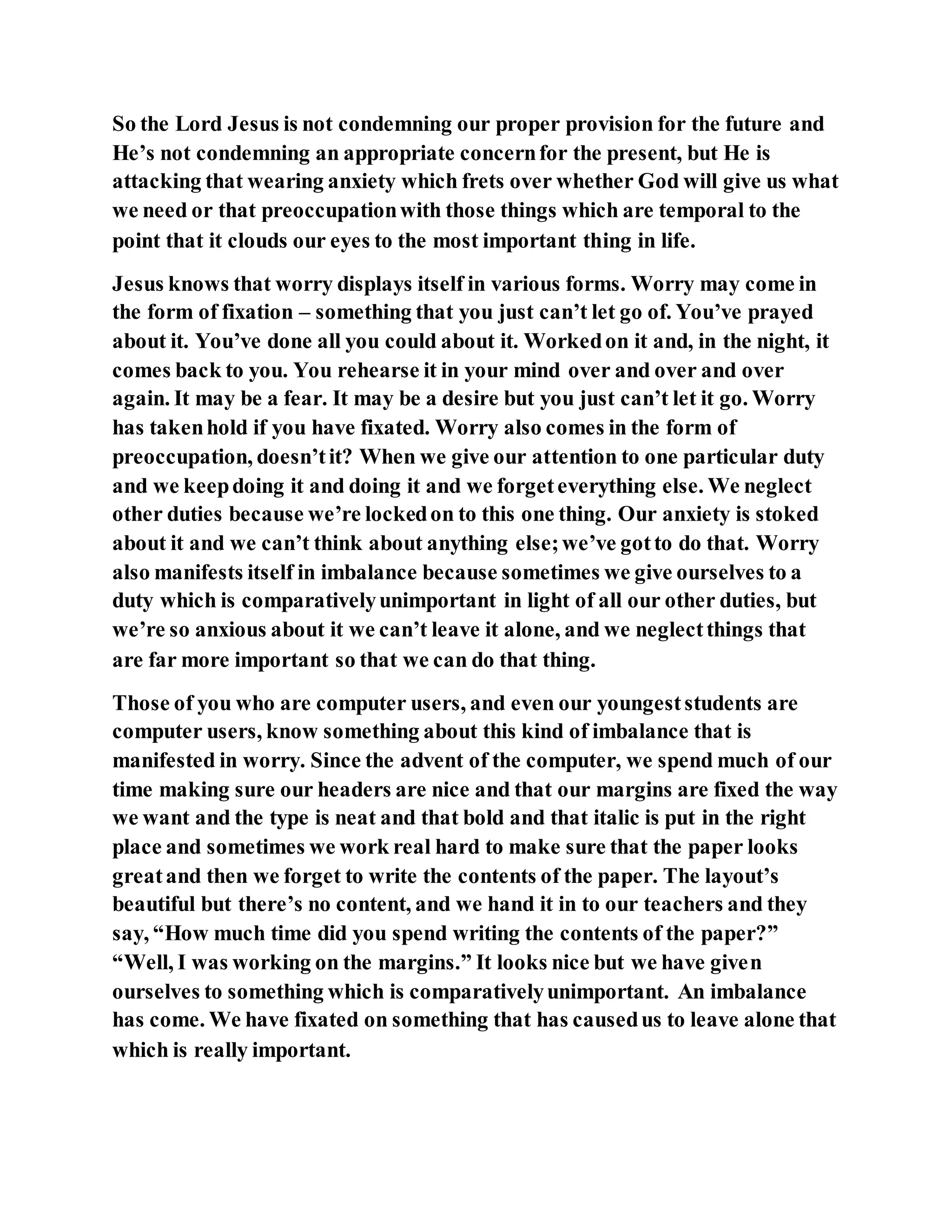
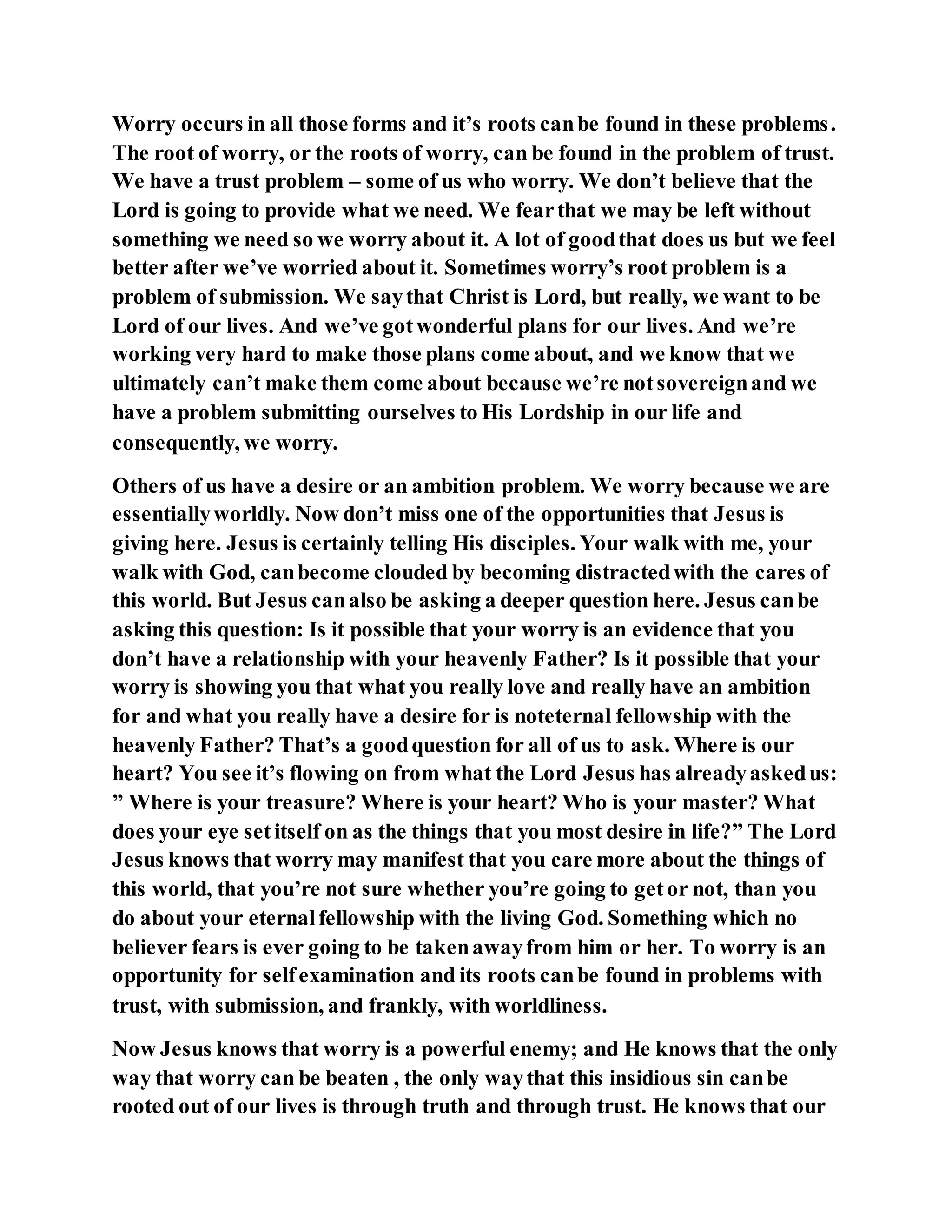

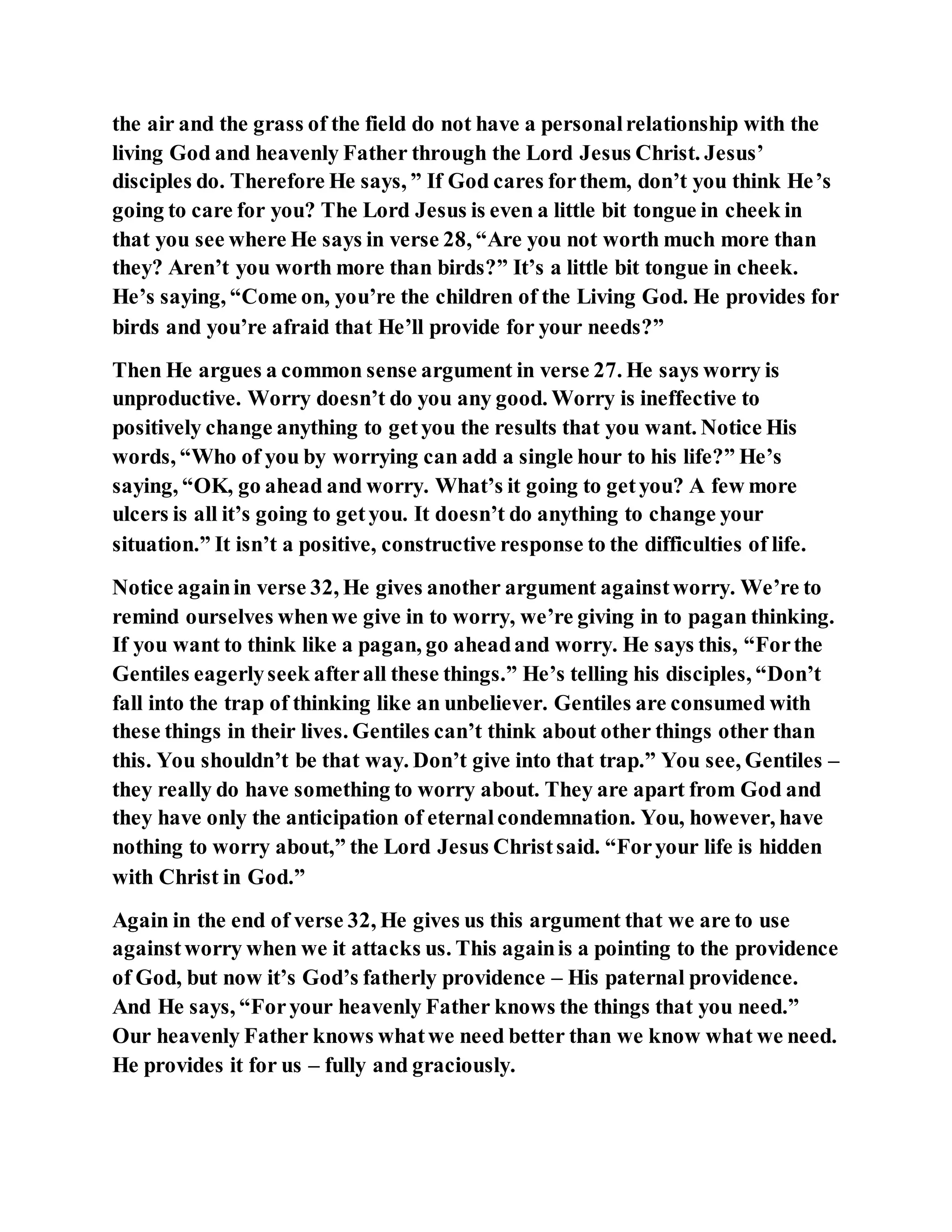


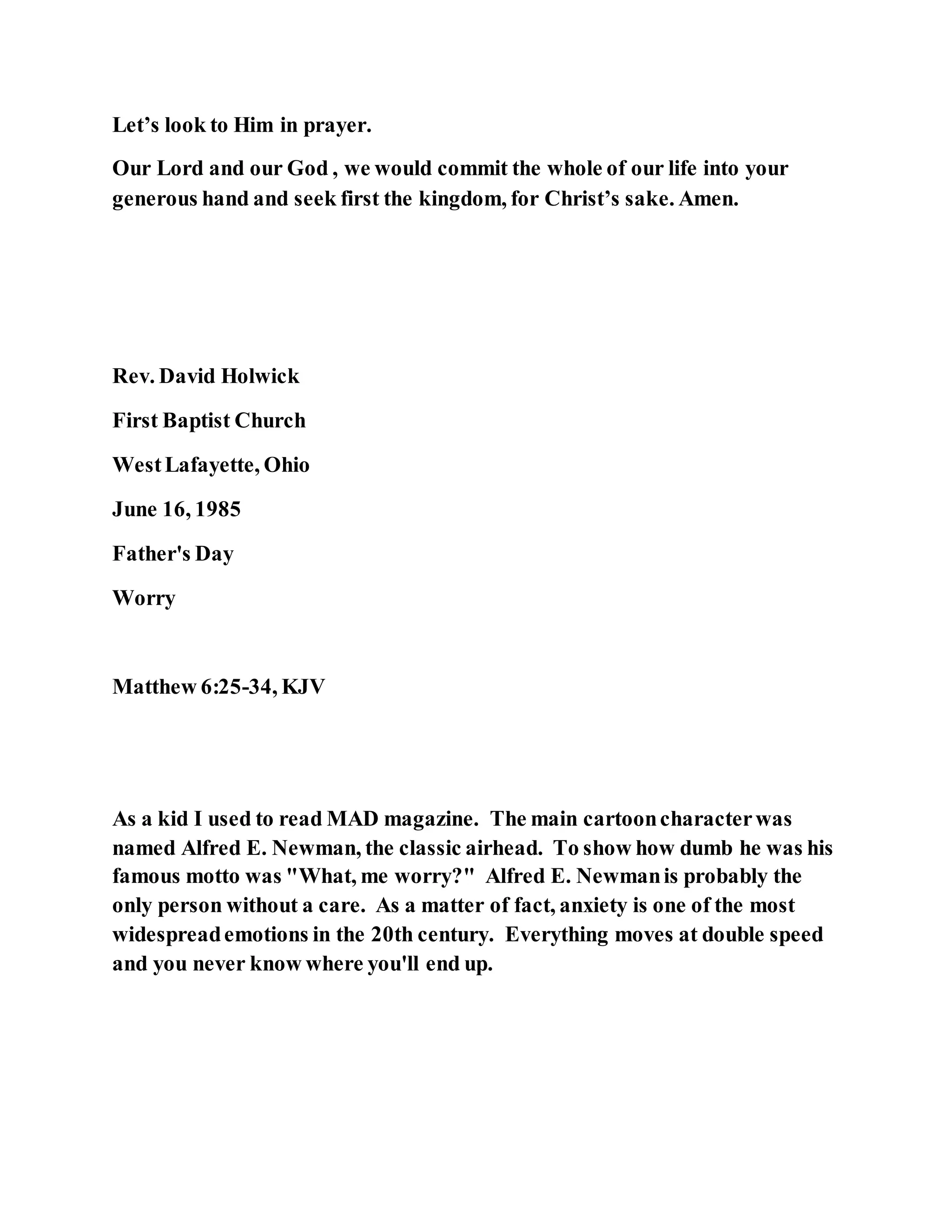


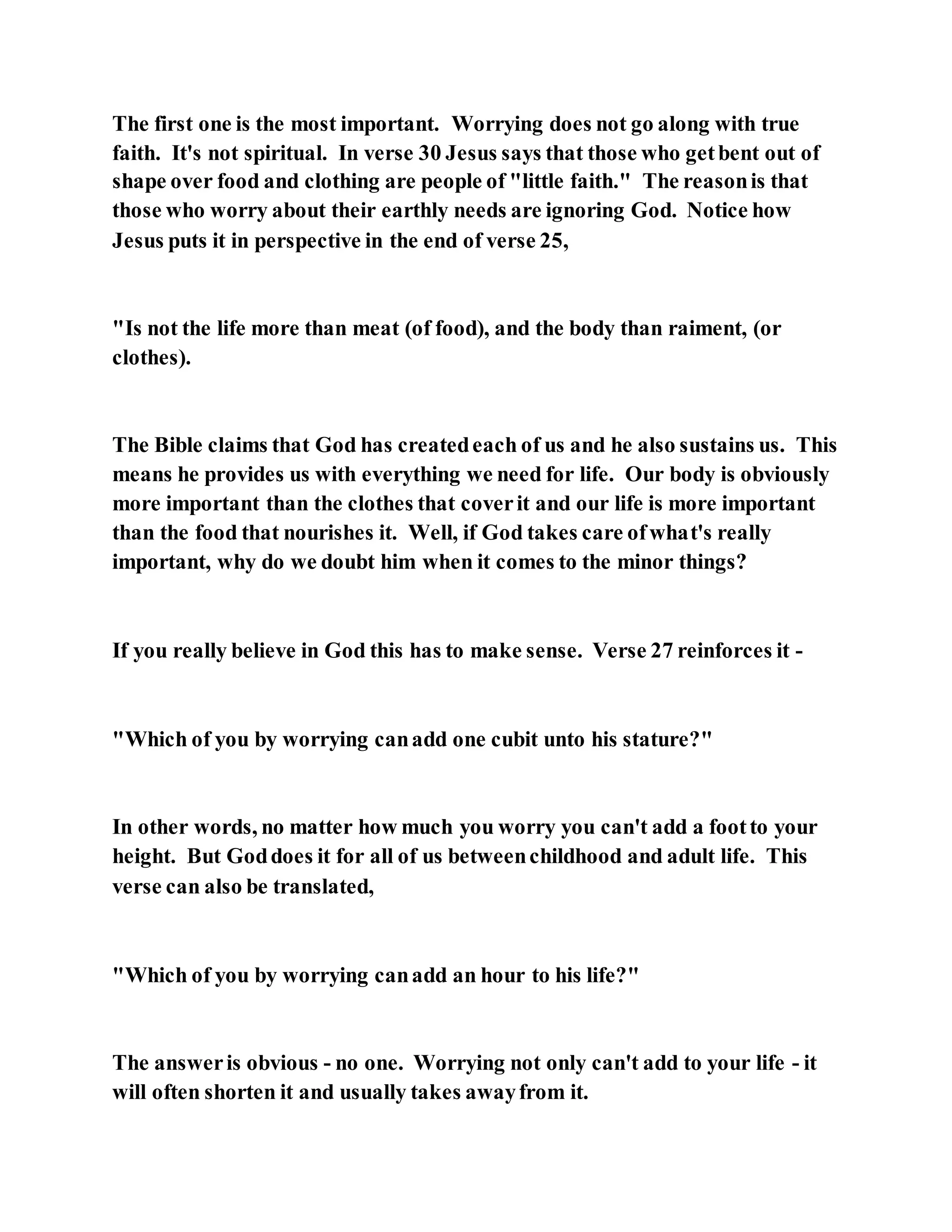

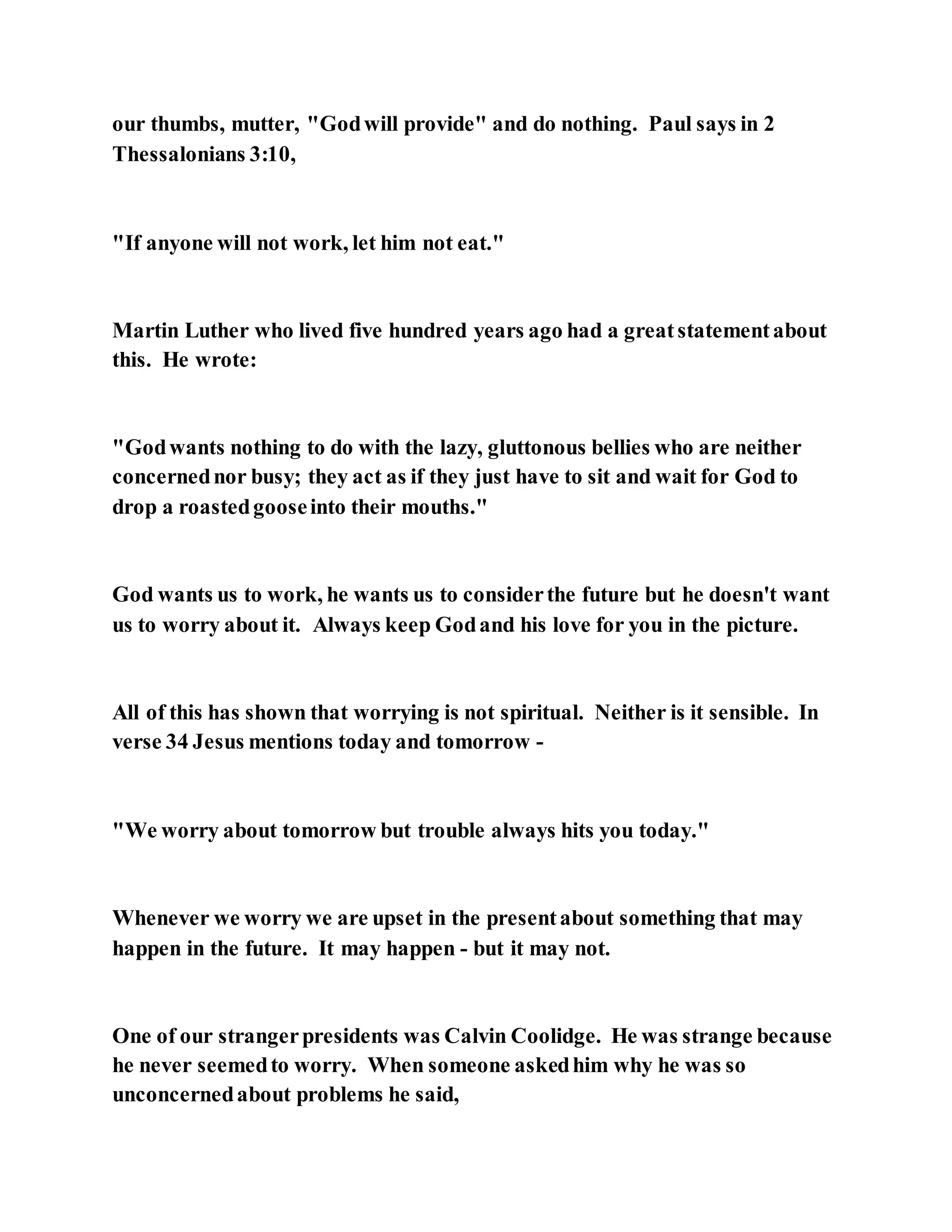
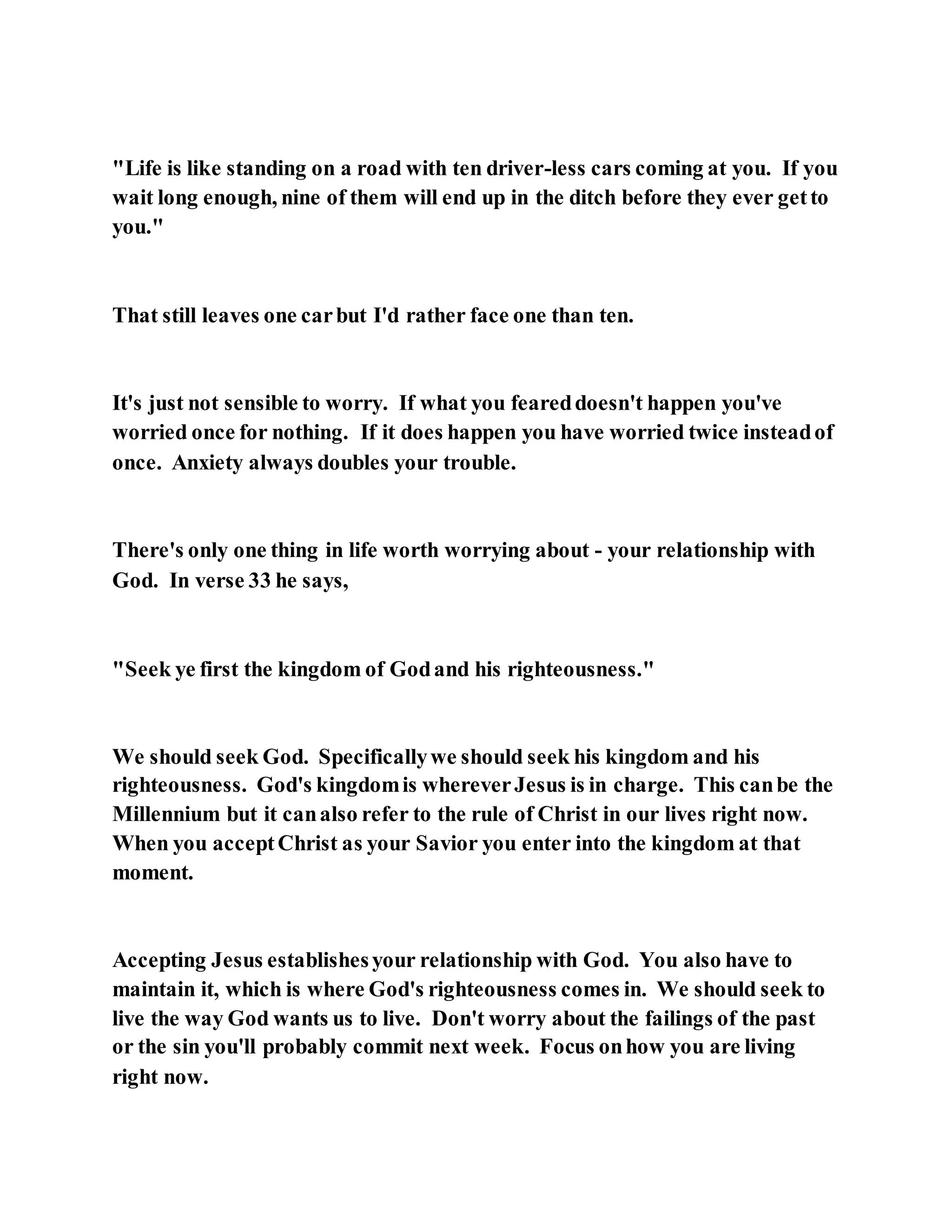
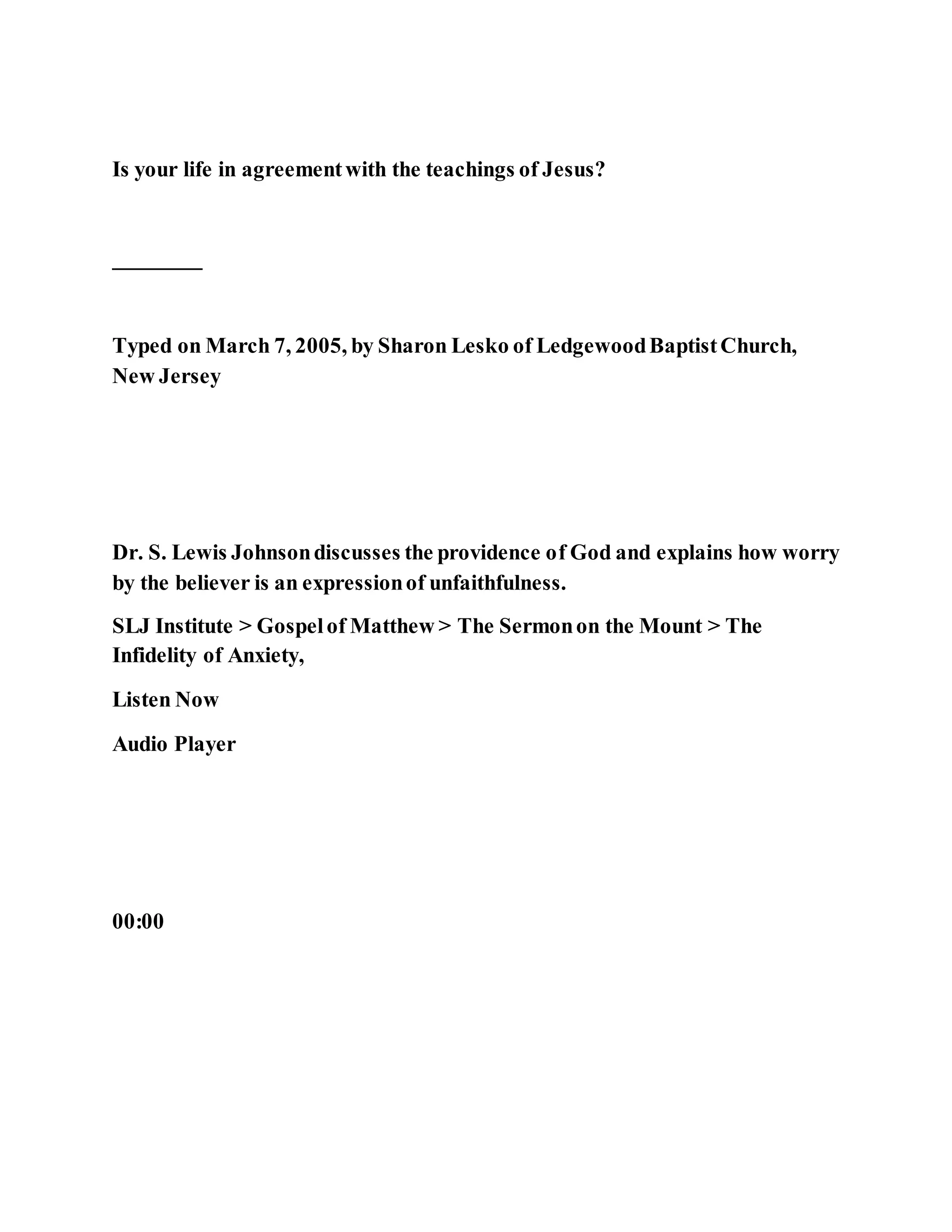

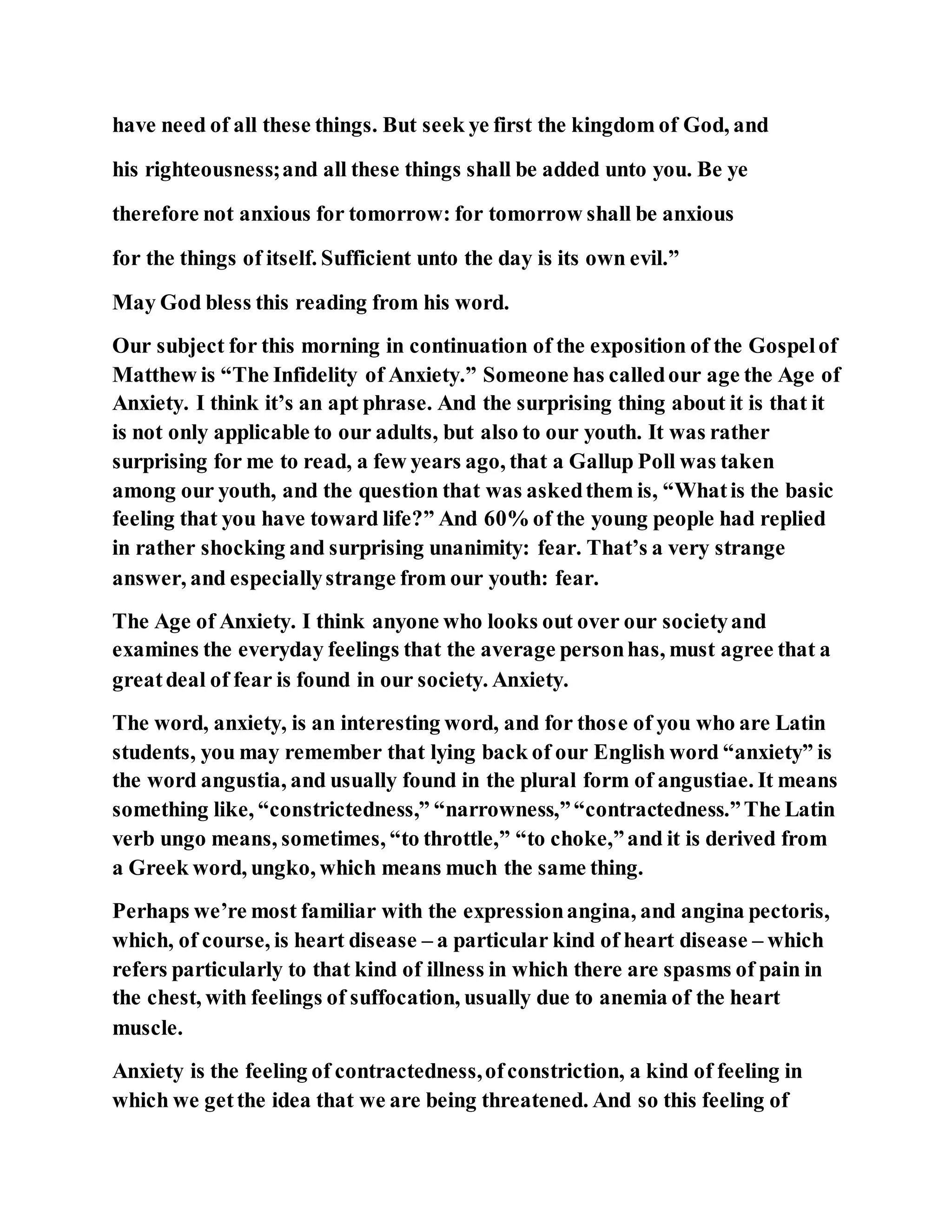
![anxiety is this indefinite sense ofbeing threatened. And, strikingly – as most of
us know who have experienced anxiety – it is not so much the object that is
important, but the feeling itself. And often, the feeling so overshadows the
reasons forit, that it’s difficult for us to evenexplain the reasons forour
anxiety.
It’s probable that this fear or anxiety is not to be interpreted as a fear of
death. I do not think that our age is characterizedby a fear of death. Some of
you who may be interestedin this subject – the older you get, the more
interestedin it you become [laughter] – know that at the present time there is
an unusual interest in death, and in many cases, anapparently honestattempt
by many people to deal with the problems of death.
Many books have been written in the past few years on the subject of how to
deal with death, and written by men who are totally unbelievers, and some
women as well, so that I do think that our age is an age in which the fearof
death has become much more of a problem than it usually is. All men are
characterizedaccording to the Scriptures by fear of death, but we have seen
evidences in our societythat it is not so much a fear of death as a fear of life
that is a reasonfor our anxiety. The Buddhists in Vietnam who made
themselves living torches without any kind of Christian hope illustrate for us
the factthat men may not be fearful of the experience of death itself, even
though they do not have Christian faith.
I think it’s a striking thing, too, that in our age we do not have the sense of
spiritual reality that we used to have. One of the outstanding German
theologians, Helmut Tielicke, has said that in the case of Luther, “That
medieval monk was filled with the anxiety of guilt in the presence ofthe divine
judge, and this wrung from his lips the question, ‘How can I find a gracious
God?’” But today, it’s the fearof the appalling and unfathomable contentions
of life that grips men.
Now, of course, I would be very happy if our age were an age in which men
were gripped by the same thing with which Luther was gripped, because it is
of the greatestimportance that we realize that God is a judge, and that we all
face him someday. And the fact that Luther was so impressed with this fact](https://image.slidesharecdn.com/jesuswasabirdwatcher-200703143708/75/Jesus-was-a-bird-watcher-99-2048.jpg)
![and so gripped with it, and so stirred by it, that he was brought to his
tremendous experience through seeking to find a gracious God, is itself
incentive, it seems, for everyone who does not have this fear to seek the
answerto the question, “How canI find a gracious God?”
But it’s shocking, to say the least, that people should be so disturbed in our
day by the lesserevils, the contingencies oflife. And so, it’s the fear of the
contingencies, the fear of the things of life, that have gripped our society,
which is perhaps insight into the shallownessofour thinking. I think this is
best caughtand most beautifully caught in one wise comment, “I’m not so
much afraid of the end of the world as I am the end of the month.” [Laughter]
All of us know that anxiety, but it’s a sad thing that that grips us more than
the factthat the time is coming when societyand life as we know it is going to
end, and men are going to be faced with the fact of a God who judges.
Now, amid the hopeless solutions of the world, there stands the Christian good
news. The Christian goodnews does not ignore the problem, nor does it deal
with it as science does, leading inevitably to the nihilism of a Jean-PaulSatre.
But it deals with it in the light of divine revelation, and in the divine revelation
– the goodnews of the GospelofJesus Christ – we have that which deals with
man’s guilt, and we have that which deals with man’s anxiety.
The Apostle Paul puts it very beautifully in speaking ofguilt, for he says, “By
him, Jesus Christ, all that believe are justified from all things from which he
could not be justified by the law of Moses. Thatbeautifully expresses the
answerto the problem of guilt. The problem of guilt is solvedin the death of
our Lord Jesus Christ, for it is there that he took our guilt, the took our
condemnation, and it is possible for everyone of us, sitting in this room to have
the sense offreedom from guilt and condemnation.
But then, having said that, the Bible so beautifully and particularly in the New
Testament– although this is not absent from the Old Testamentalso –
expresses the freedom that we have from anxiety in that little phrase which
occurs so often: “fearnot.” Fearnot; these are the words that deal specifically
with the question of anxiety, and they deal with the problem of the
contingencies oflife. Now this is the answerto the tranquilizers: fear not.](https://image.slidesharecdn.com/jesuswasabirdwatcher-200703143708/75/Jesus-was-a-bird-watcher-100-2048.jpg)


![It’s been brought home to me so vividly, recently in the hospital. In fact, we
have a young man now, in his twenties, still in the hospital, and his life was
hanging by a thread. His heart actuallystopped beating four times a week
ago. You know, we canbe very anxious about the things we put on, about the
food that we eat, about the clothing; what we drink. But so far as the beating
of the heart is concerned, there isn’t anything we can do about it. We have to
trust God for that.
As a matter of fact, the Bible speaks ofGod as the God in whose hands thy
breath. You are not sure of drawing any breath exceptthe one you are
drawing right now, for the rest of them, you have to trust God. And so, you sit
before me as men and women of faith, even though it may be unwitting faith.
Now you see, the thing the Lord Jesus is saying is, why are you anxious for life
– what you’re eating, what you’re drinking, what you’re putting on – when
you must depend upon God for that which is the fundament thing: the life
itself; the body itself. So, if you must depend upon him for that, can he not be
depended upon for the other little things, the contingenciesoflife?
Now I know what you’re thinking. You’re thinking if, those people to whom
our Lord was speaking had to live in the 20th Century, they’d discoverit was
not so easy, what with all of the things that we have to put up with. They
didn’t have Washington to contend with. No, they didn’t. They had Rome to
contend with, and I’d rather have Washington. And I’m willing to go on
record for that. [Laughter] I would rather contend with Washingtonthan
Rome, for eventhe simple man had to pay 40% of his income in taxes. And
there’s some of you in this audience who do not have to pay 40% of your
income in taxes. They had excessive taxation. They had all the problems that
we have plus, in addition, many other problems that we do not have. And yet,
the Lord Jesus’words are, “Be not anxious for your life, what ye shall eat,
what ye shall drink, or what you shall put on.”
Now, having stated the principle, he argues it. And, after all, you might expect
a preacherto have seven reasons. Ifhe doesn’t have sevenreasons, he’llhave
three. But sevenis better, because that’s the number of perfection, so we are
taught. So I want to, briefly, in the next ten or fifteen minutes, speak about](https://image.slidesharecdn.com/jesuswasabirdwatcher-200703143708/75/Jesus-was-a-bird-watcher-103-2048.jpg)

![are the closestthing to perpetual motion that I have ever observedin all my
life.
I know this is a sign of my age. Whenyou get old, you are interested in two
things: the garden and the birds. [Laughter] These are two definite
characteristicsofold age. Ask a young person about the birds. He doesn’t
know one bird from another. Birds are all birds to him. But ask an older
person. They not only know the birds. They know the differences, they know
their habits, they’ve been sitting out on the patio observing them. And, also,
they garden. Ask a young personabout plants – they don’t know anything
about plants – unless they’ve been brought up on the farm.
Now birds are constantlyactive. In the first place, they’re up long before I am.
When I get up, they’ve already been working a goodwhile. I remember
contending with the sparrows around my house when they wantedto build a
nest in a blind just opposite my desk. And all I had to do was to raise the
window and reachout and pull the blind to in order for their nests to fall to
the ground. This went on for a long time. And they were always up before I
was. When I came into the study, I could hear them. They were already there.
This was the struggle:Dr. Johnsonversus the whole sparrow population
[laughter], DartcrestAvenue – a road.
And, the birds, they’re constantlyengagedin activity. All that they do, it’s
amazing. I have been constantlyamazed at how they are just always active,
caring for their young, building their nests, teaching bird culture to the little
birds. And one thing you’ll notice about the birds is they’ll never sit on a limb
and open their mouth toward heaven expecting God or some unknown power
to drop a worm in their mouths. Always observing, always working.
Now the striking thing the Lord Jesus says here is that these birds, they have
no incentive to idleness, but they are a beautiful lessonto us of what God our
Father desires to do for us. For he adds, “Are not ye better than they?” We’re
much better in the sight of God, much more precious to him than the birds,
although not a one of them falls to the ground that our heavenly Father is
aware of. So the argument from nature, they work – they constantly work –](https://image.slidesharecdn.com/jesuswasabirdwatcher-200703143708/75/Jesus-was-a-bird-watcher-105-2048.jpg)



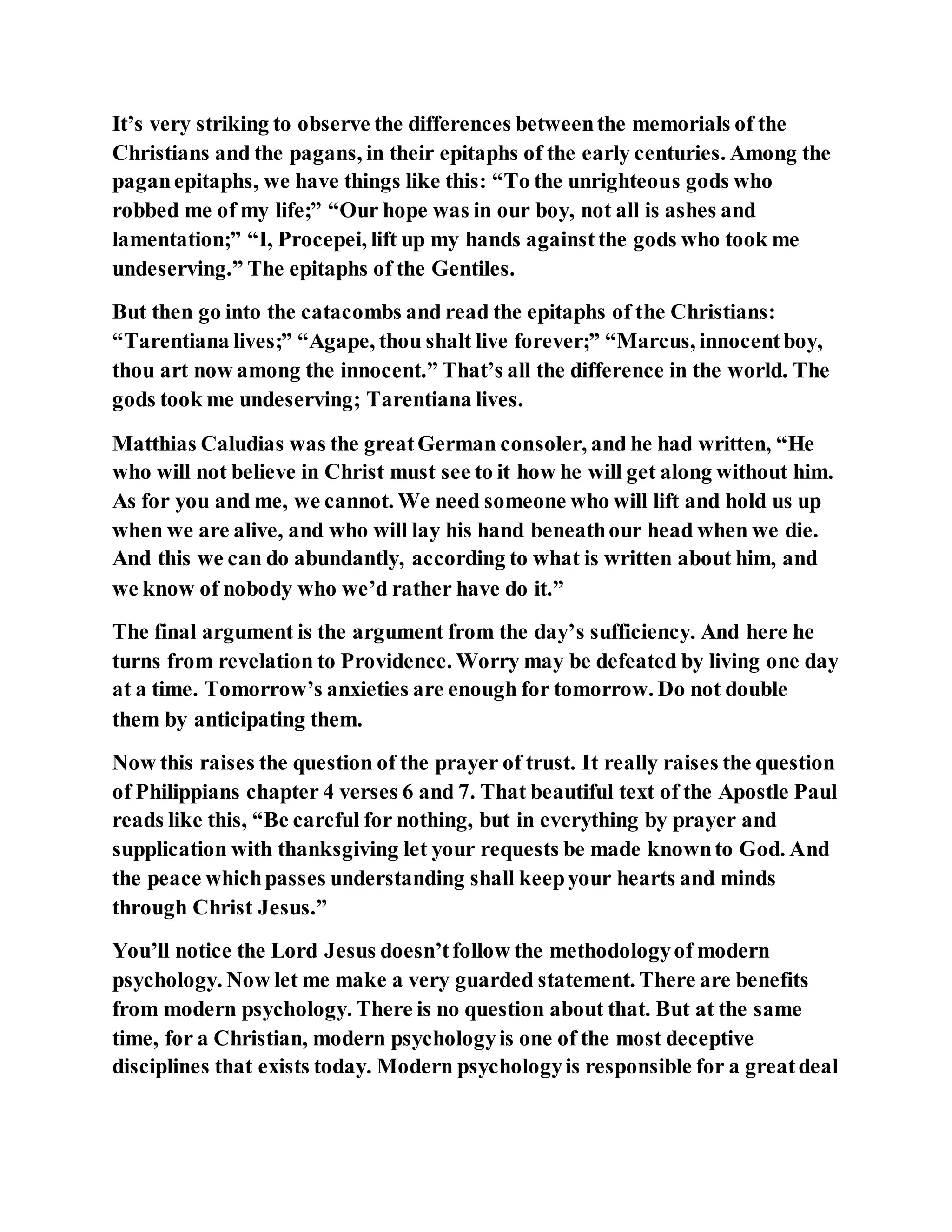
![of the lack of trust that exists in Christians. Now, I’m referring to those who
have become enamoredof modern psychology.
Modern psychologyis, essentially, a discipline that leads to trust in humanity
rather than in God. I do not deny that there have been some interesting and
some worthwhile things that have come to our attention through modern
psychology. But modern psychologyis a very dangerous discipline for
Christians who do not understand its true nature.
Now having saidthat, I want you to notice the Lord Jesus does not say, “Stop
worrying; pull yourself together.” In the first place, that’s useless, becauseit’s
impossible. We cannot stop worrying. That’s the very thing about worrying
that we cannot handle because worrying is the activity of the mind and the
heart that we cannot control. And furthermore, that’s bad modern
psychology. That would be repression. The Lord Jesus does notsay, “Stop
worrying; it may never happen.” That’s popular psychology. I’ve even seen
that among Christians. No need to worry about that because it may not
happen, after all, it’s only something that you have in your mind, and why
worry about something that may not happen. That’s of no help whatsoeverto
me. Do you know why? Becauseit may happen. [Laughter] It may. That’s
popular psychology:don’t worry about it, because it may not happen. But it
may. As a matter of fact, it’s biblical to saythat it may. In fact, it does happen.
Job said, “Forthe thing which I greatly feared is come upon me.” It came.
There’s an anecdote I read just yesterday. It said, if you worry, always do
your worrying in advance, otherwise youwill miss most of your chances.
[Laughter] Well that’s humorous, but it’s not right. There’s a sense in which
many things that we don’t worry about come to pass, but there’s a sense in
which some of them do – and that’s the thing that disturbs me. Some of them
do.
What’s the Christian method? Why, the Christian method is take them to the
Lord. Be careful for nothing, but in everything by prayer and supplication by
Thanksgiving let your requests be made knownunto God. And the peace of
God which passethall understanding shall keep your minds and hearts
through Christ Jesus. Yousee, the greatpromise of the word of God is that we](https://image.slidesharecdn.com/jesuswasabirdwatcher-200703143708/75/Jesus-was-a-bird-watcher-110-2048.jpg)
![cannot controlour minds and our hearts and those thoughts that grip us in
our anxiety, but God can! That’s the truth of the word of God. He can do it.
And not only that, but as they are brought to him, he will do it—shall keep
your minds and hearts.
The Psalmistsaid, “I laid down and slept”—allofus canlay down with sleep,
but that’s another matter; he said, “I laid down and slept, for the Lord
sustainedme.” It is the answerto the tranquilizers.
SatchelPaige was one of the greatpitchers in baseballof about twenty years
ago—infact, for about thirty or forty years. He was one of the really, truly
greatpitchers but unable to pitch in the big leagues, andsome of you may
remember that finally Mr. Paige made the big leagues whenhe was really past
his prime, and he was still pretty good. He has a little philosophy of life – he
still goes aroundpushing baseball – and he gives eachboy that comes to him
his card, and on the back are his rules for a happy life. They are, number one,
avoid fried meats which angry up the blood. Two, if your stomachdisputes
you, lie down and pacify it with coolthoughts. Three, keepthe juices flowing
by jangling around gently as you move. Some of us have no problem with
that; we don’t jog, we jiggle [laughter]. Go very light on vices such as carrying
on in society;the socialramble ain’t restful. Avoid running at all times. And
finally, don’t look back, something may be gaining on you. [Laughter]
The answers to worry according to Scripture are this simple matter of taking
things to a sovereignGod, and counting upon him to meet all of our needs in
his ownsovereignpower. And I want you to especiallyremember this, that he
does do it! It’s not a question of making him do it, of doing something so he
will do it. But he does it, as these are brought to him.
Some of us geta little magazine and last week there was a note in it about
Oral Roberts and healing. Someone askedMr. Roberts, “Why is it that not
everyone is healed in your healing meetings?” He said, “Well, sometimes God
acts sovereignly.” [Laughter] Well, the glory of the Christian gospelis that he
always acts sovereignly, and he does his will.
The Lord Jesus restatesthe principle in verse 33. And may I sum up by saying
simply this, that worry is needless. It’s blind. It refuses the lessons oflife. It’s](https://image.slidesharecdn.com/jesuswasabirdwatcher-200703143708/75/Jesus-was-a-bird-watcher-111-2048.jpg)
![wicked. It does not empty tomorrow of its sorrows, but it does empty today of
its strength. The secretoftranquility is trust. There is an old Christian cliché:
When we’re worrying, we’re not trusting; when we’re trusting, we’re not
worrying. And that’s generally true.
I think that if we were to look at the whole matter and finally come down to
the greatestillustrationof all, it would be the illustration of our Lord Jesus
Christ. There is no one who more beautifully illustrates the tranquility of trust
than the Lord Jesus. Throughoutall of his life – and he most beautifully
illustrates it in the last moments when hanging on the cross – in the midst of
the greatestdesolationand dereliction, he cries out, “My God, my God, why
hast Thou forsakenme?”
Now you’ll notice that he took his anxieties to the Lord. He didn’t throw them
out to the Gentiles and ask for an explanation from them. As a matter of fact,
he reachedback into the Old Testament, took a text from Psalm22, “My God
my God, why hast Thou forsakenme?” took that petition from the word of
God itself and offeredit to his Father in heaven. And in the midst of this
greatestdesolationand dereliction, his trust is unwavering. It is my God, my
God, why has Thou forsakenme? He let his requests be made known unto
God, and the answers came. In a moment he says, it is finished.
So, we need not look into the future as if it were a befoggedlandscape. It’s a
landscape markedout by a loving heavenly Father who cares forall of his
sons. And he who possessedthe lasthour no longerneeds to fear the next
minute. May God help us to be delivered from the guilt of sin, but the
anxieties of sin as well. Shall we stand for the benediction?
[Prayer] We are grateful to Thee, Lord, for the greatpromises of the word of
God. We thank Thee for the exhortations of the Lord Jesus, groundedas they
are in divine redemption and the possessionof a heavenly Father.
And Lord, if there is someone here who does not know this heavenly Father,
give them no rest nor peace. Give them all anxiety until they rest in him.
For Jesus’sake. Amen.](https://image.slidesharecdn.com/jesuswasabirdwatcher-200703143708/75/Jesus-was-a-bird-watcher-112-2048.jpg)






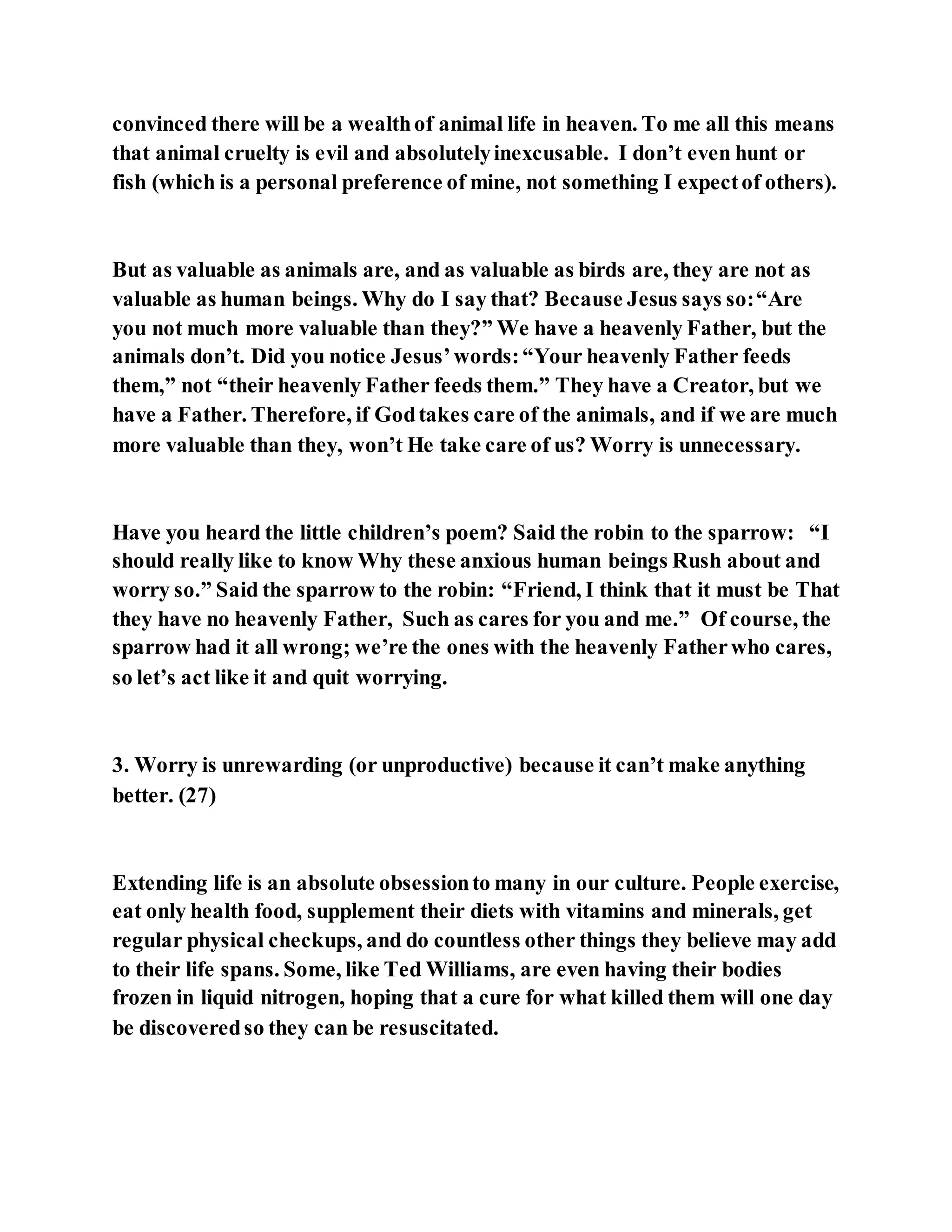
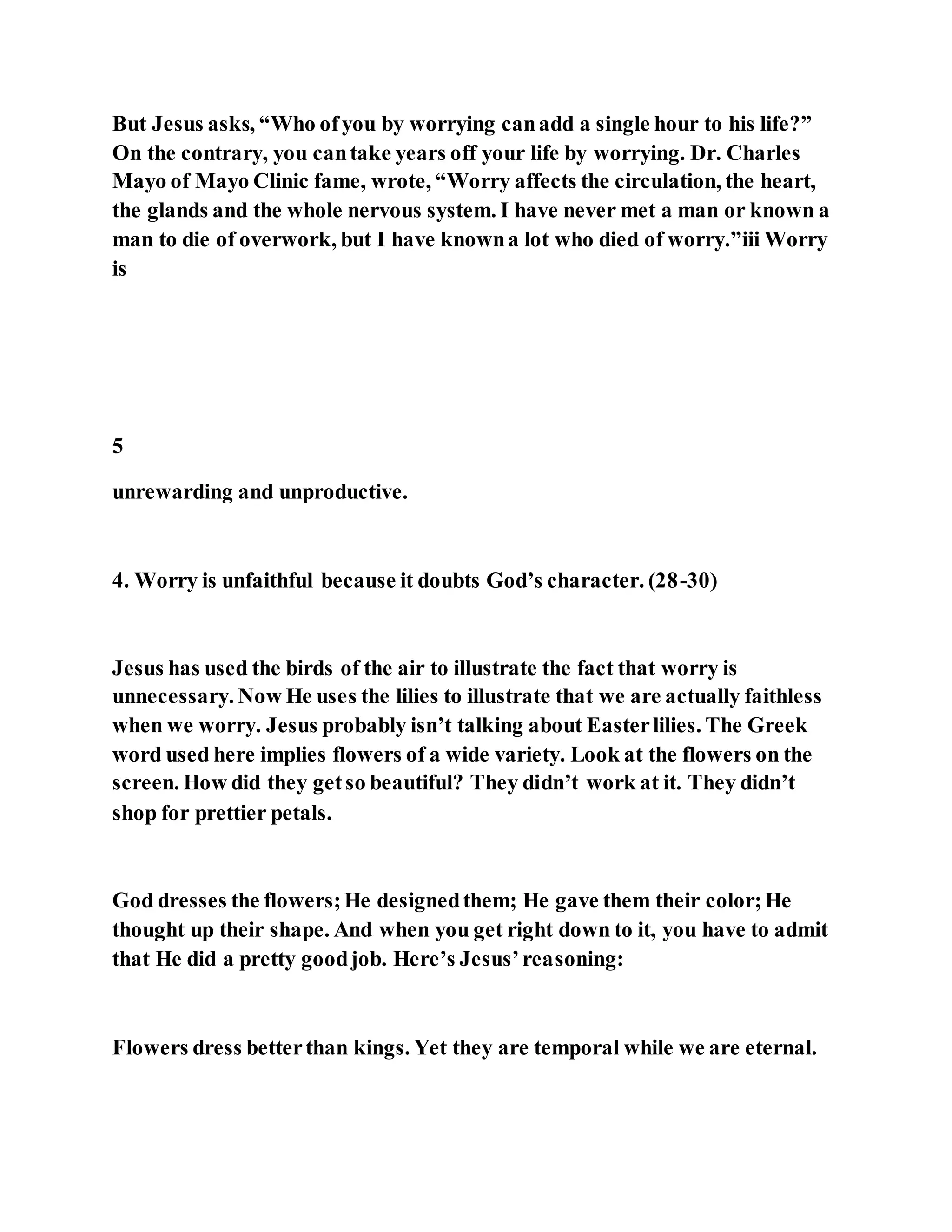


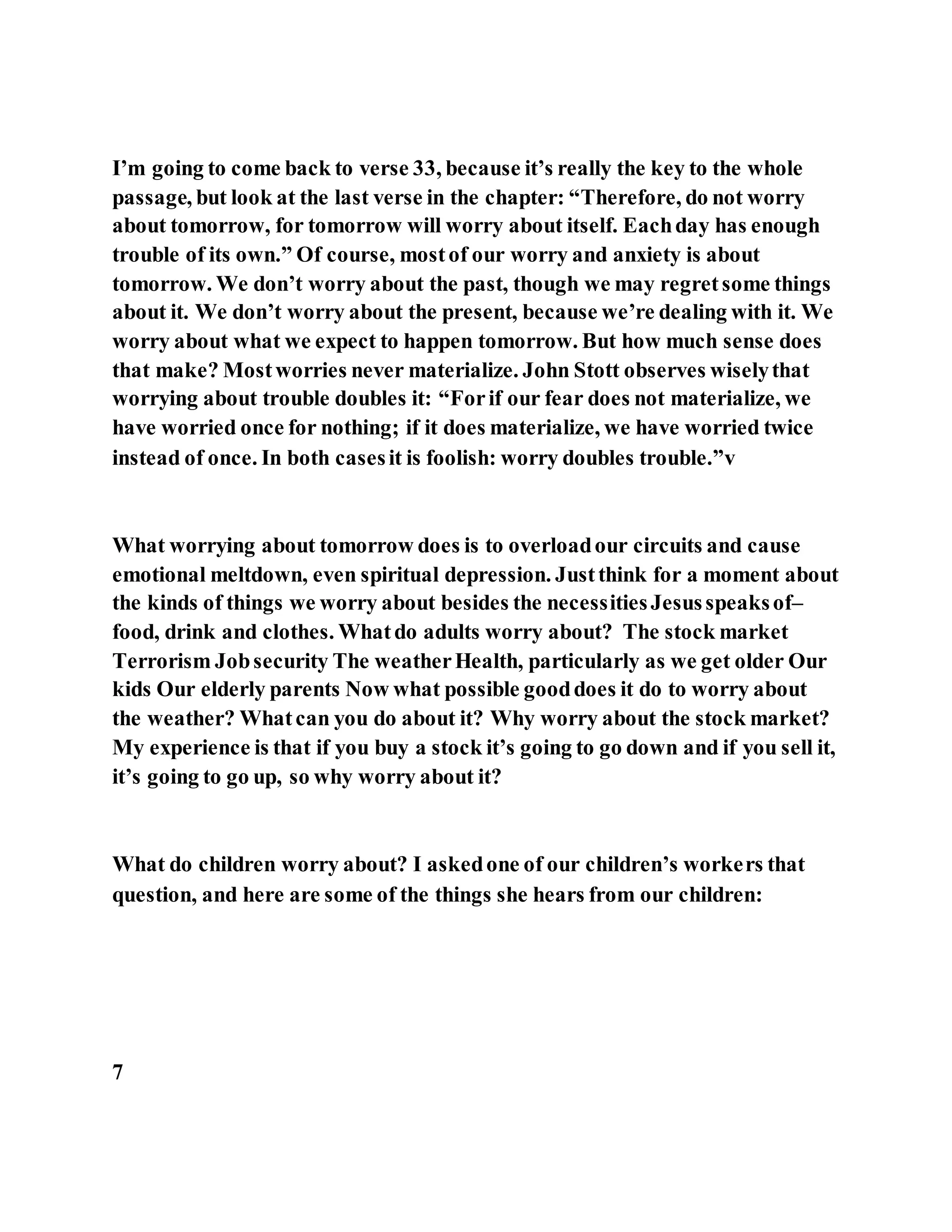

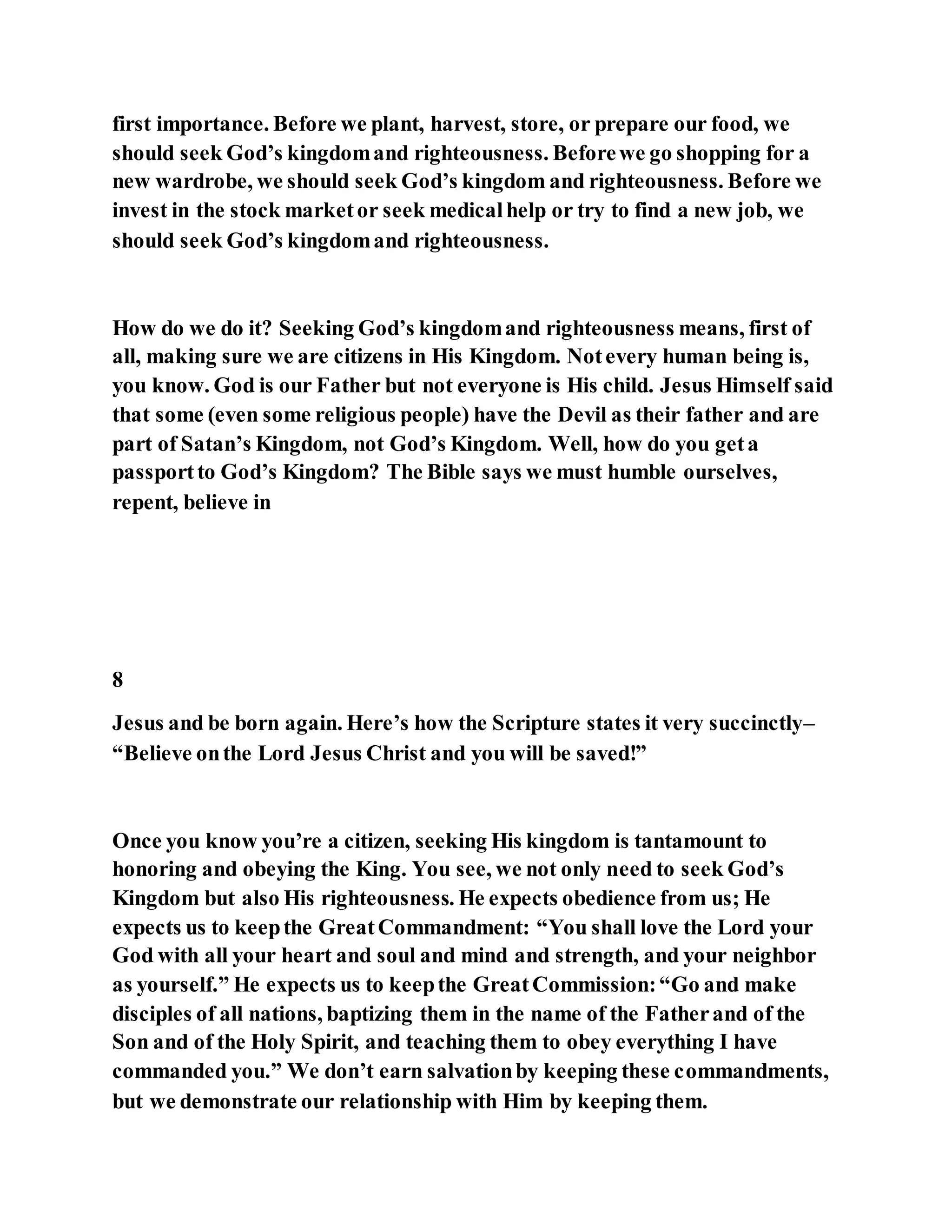

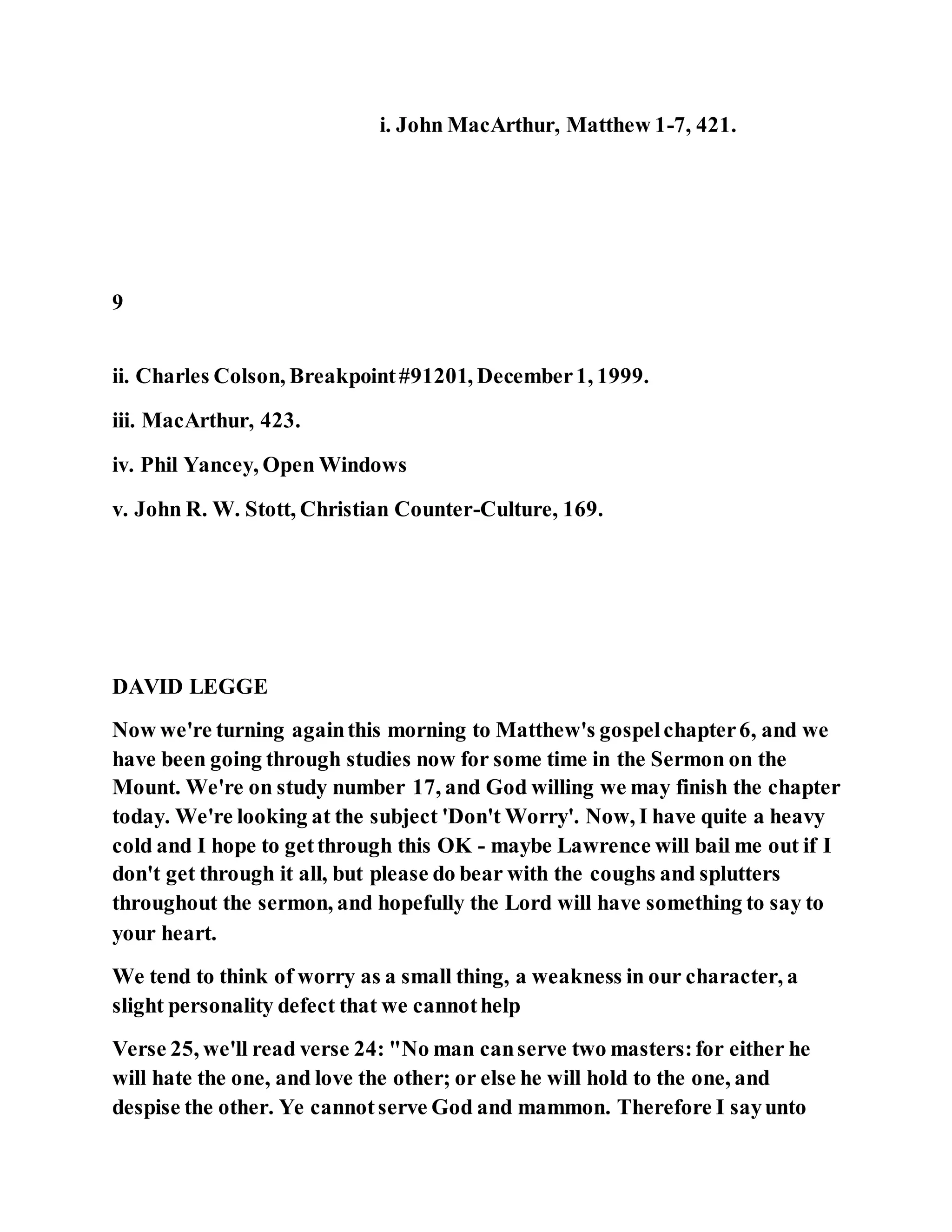

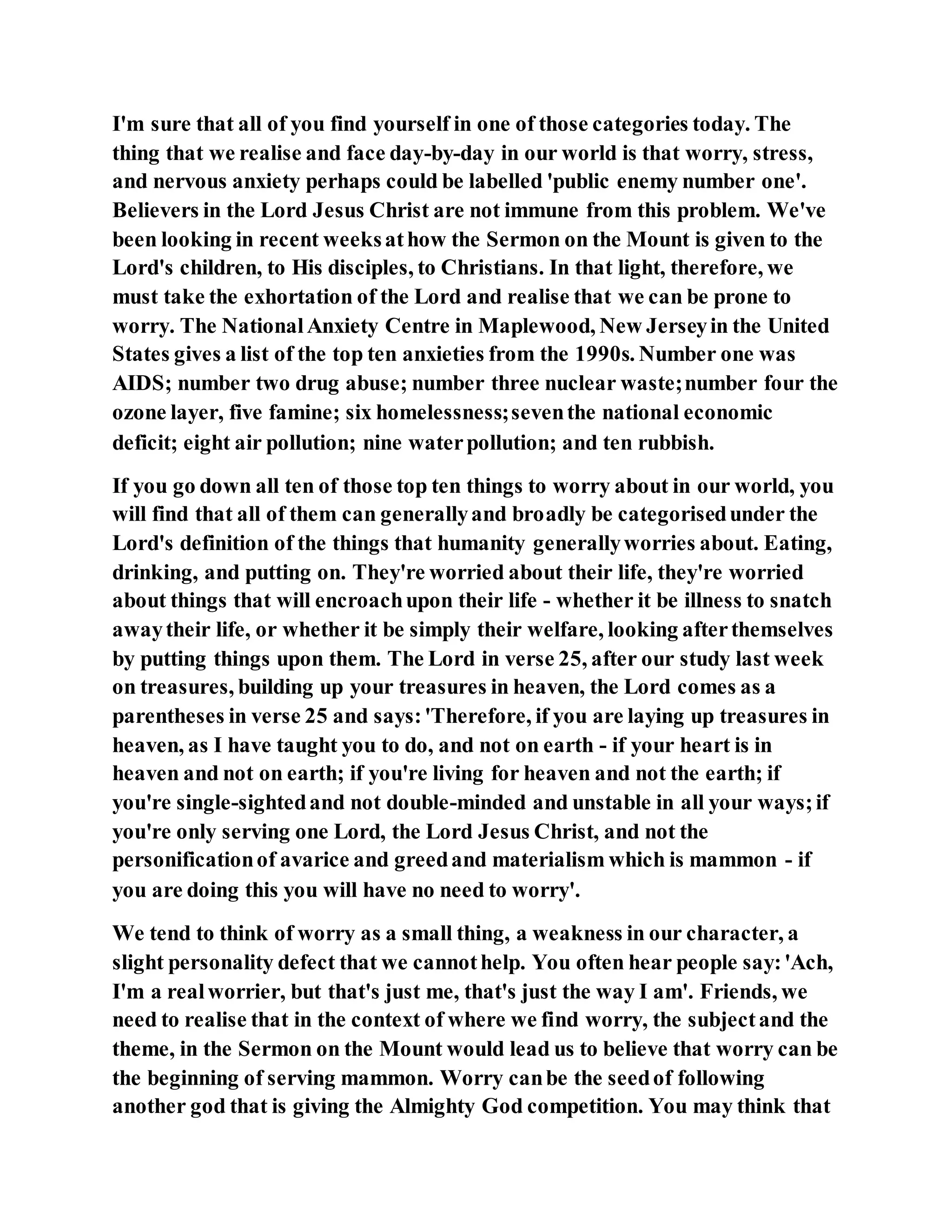

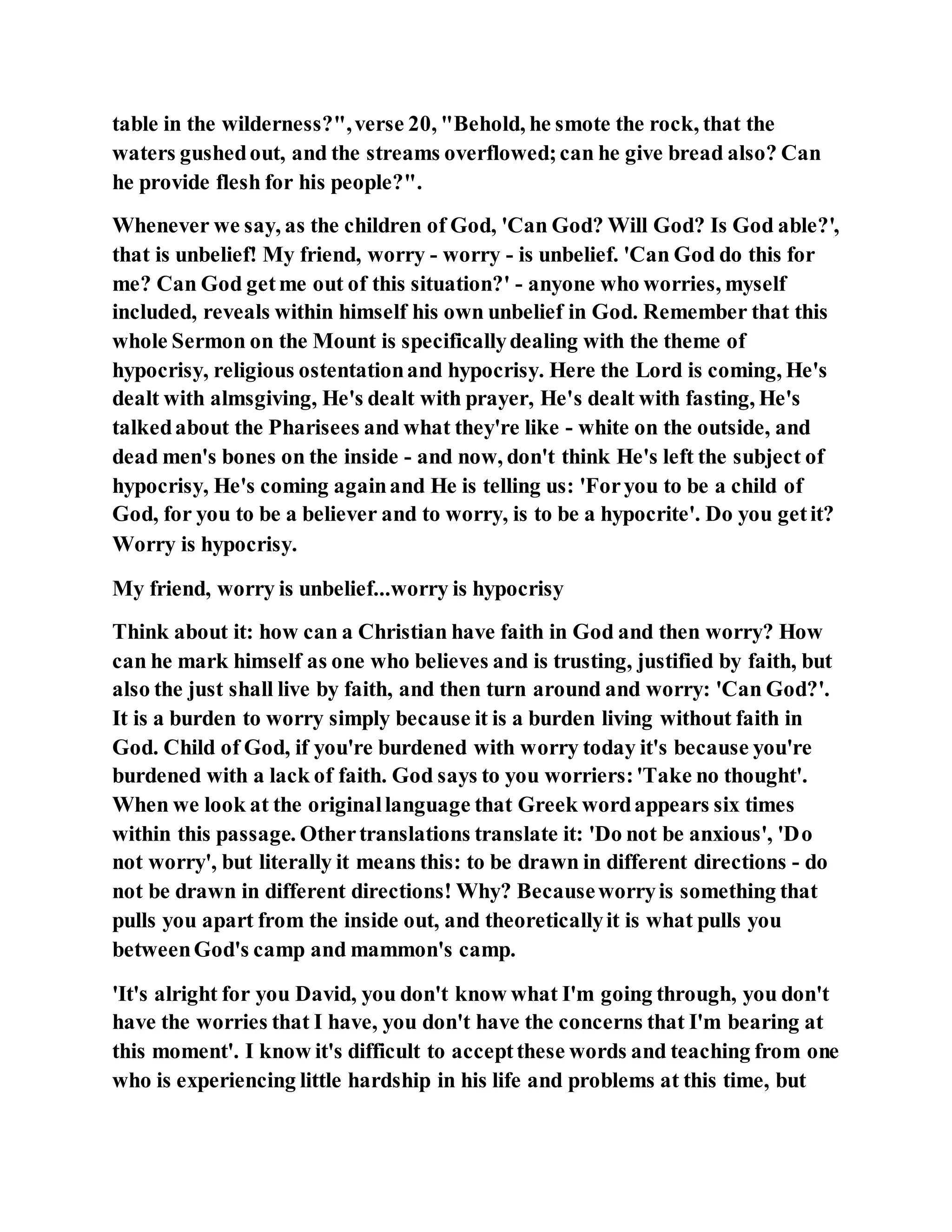
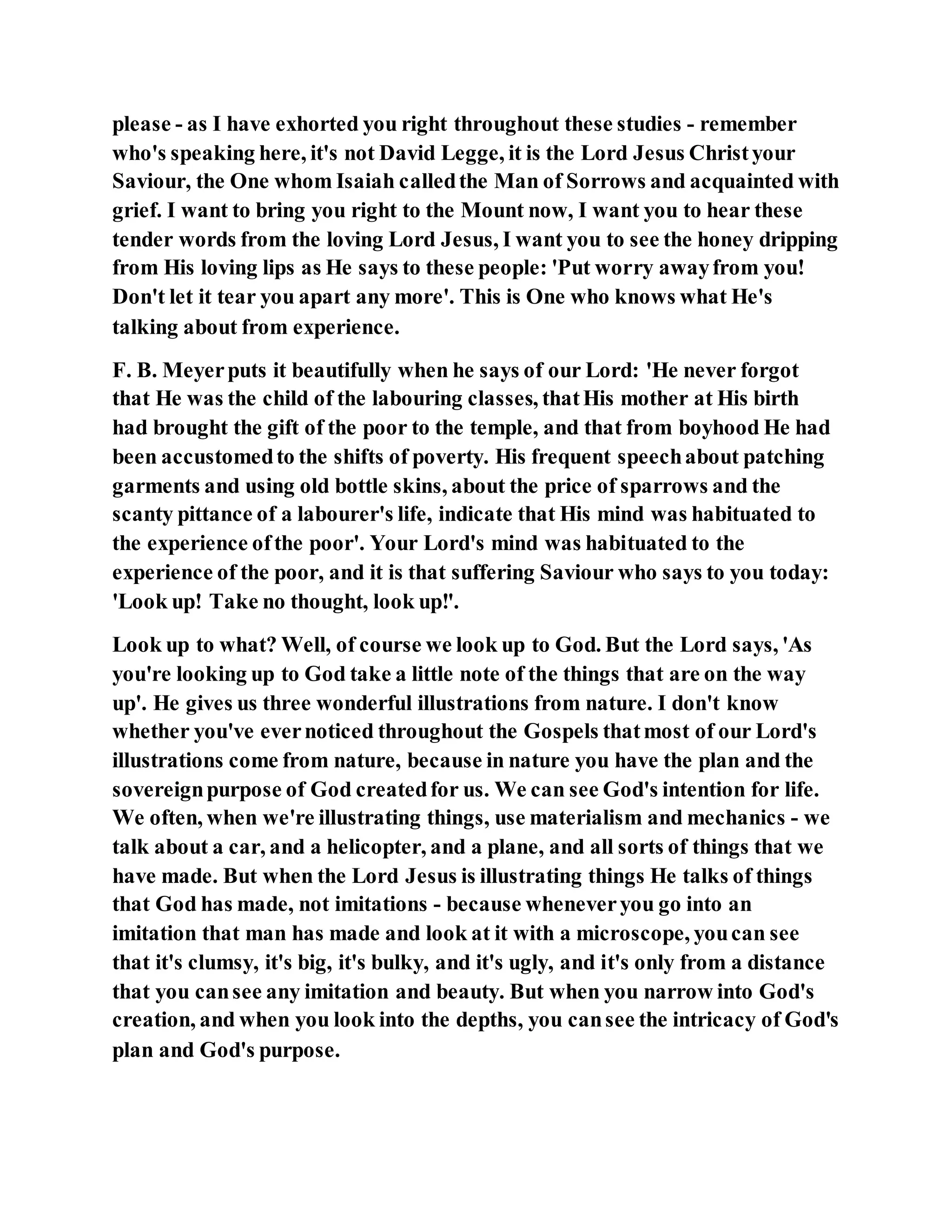
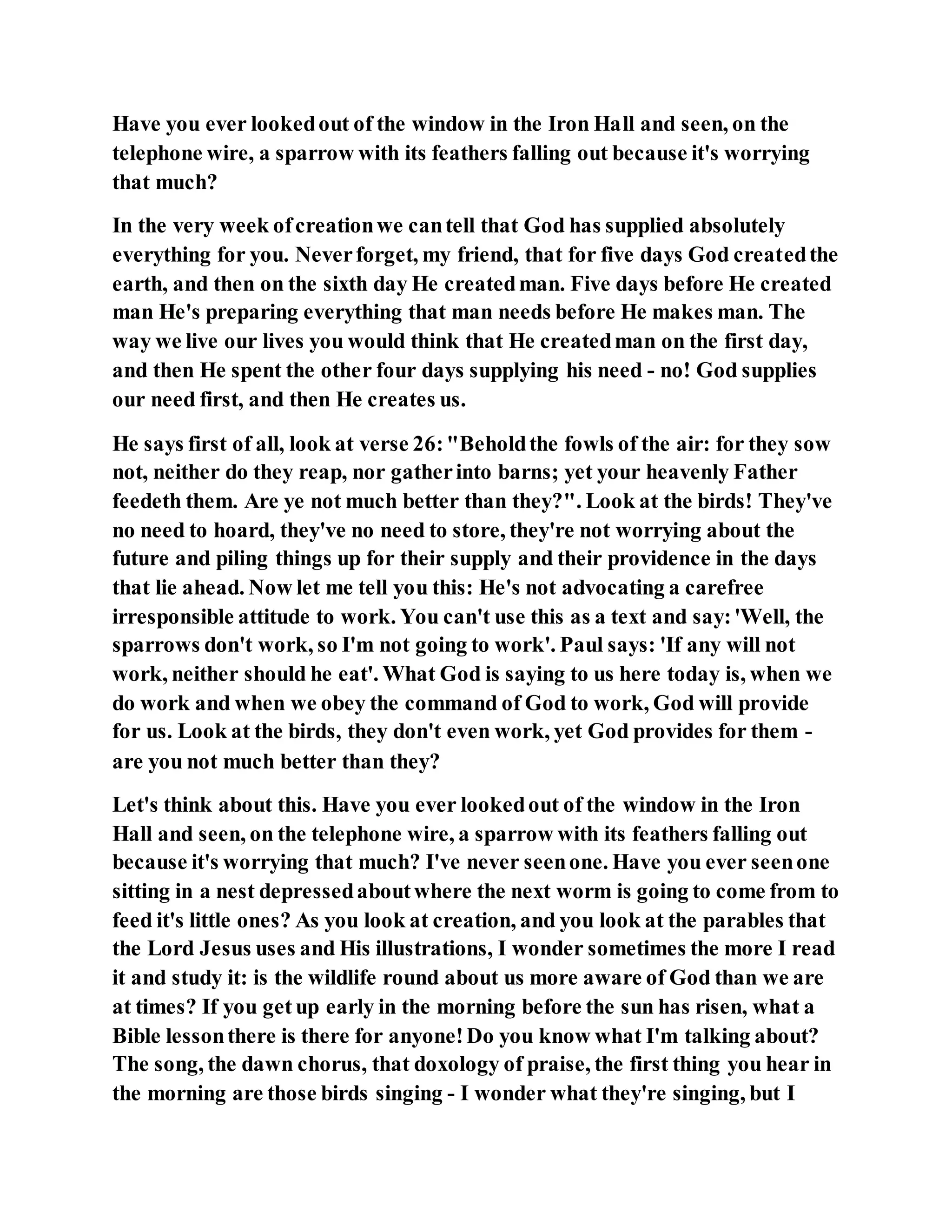

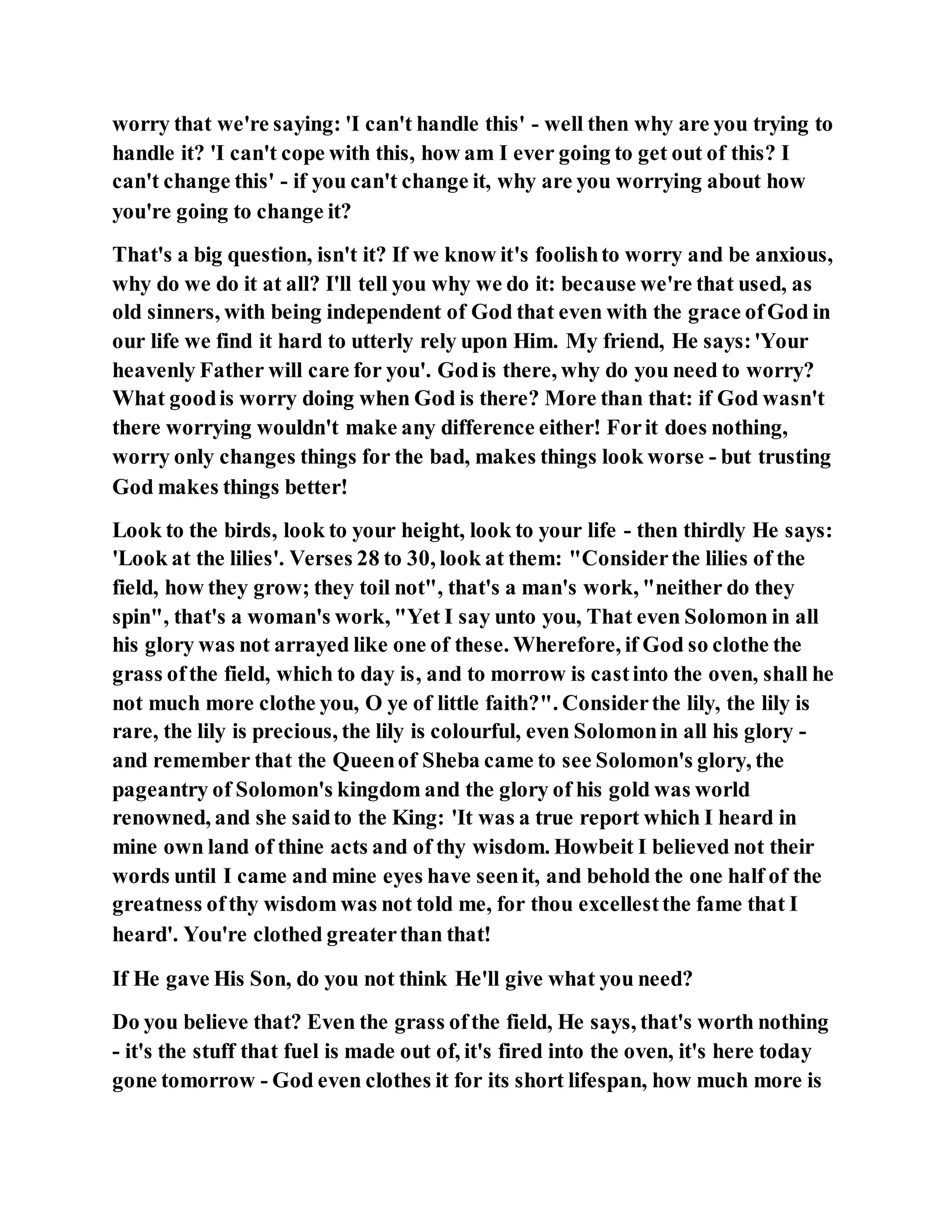


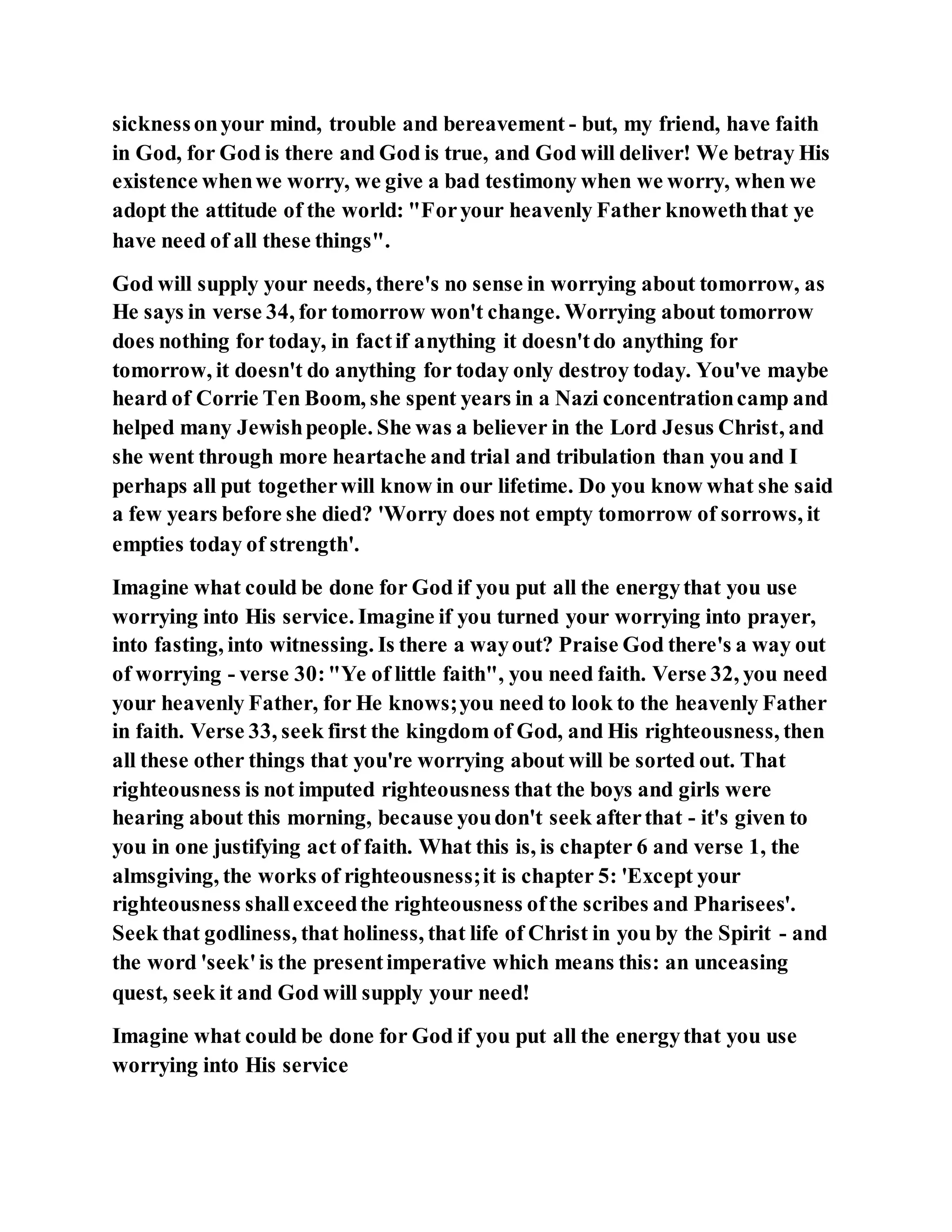
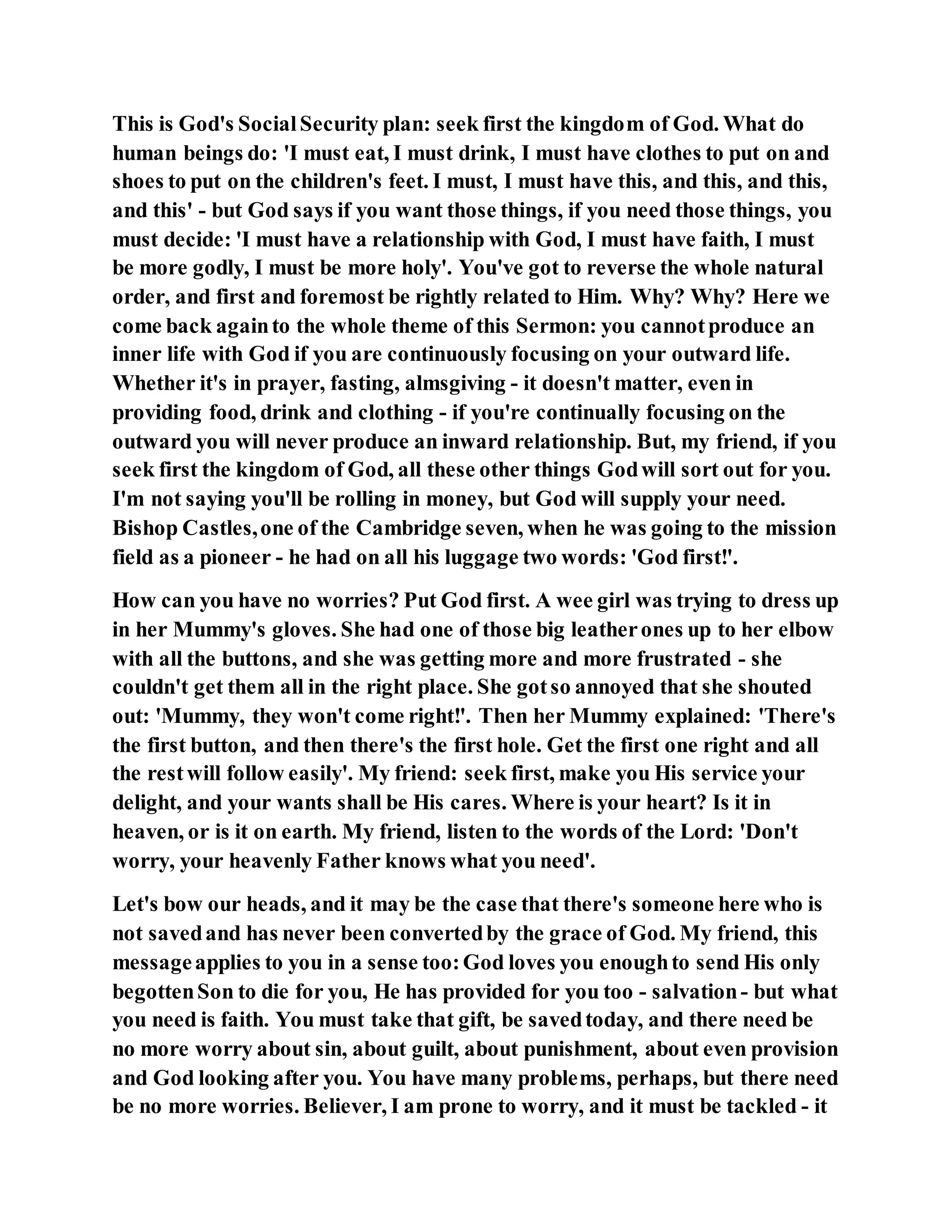



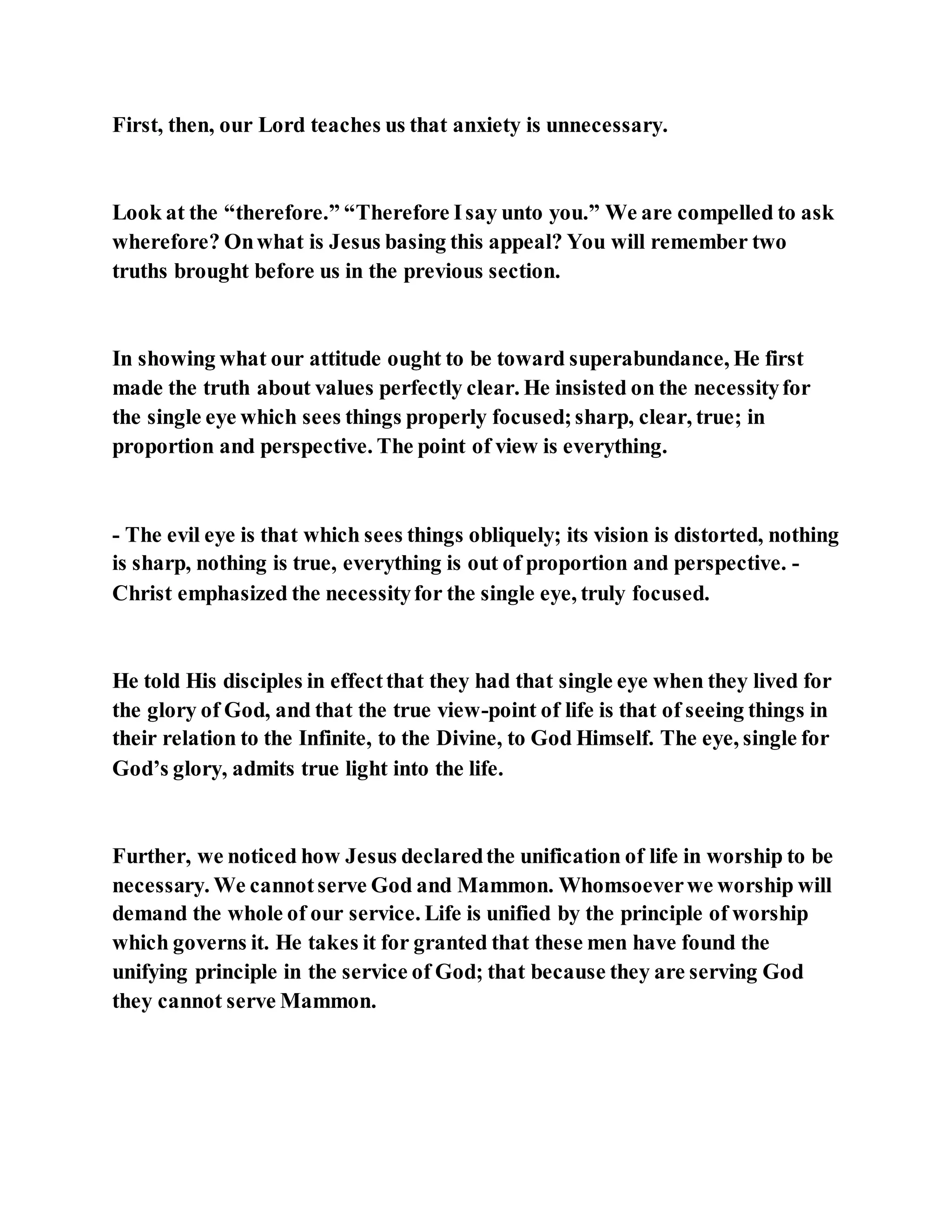

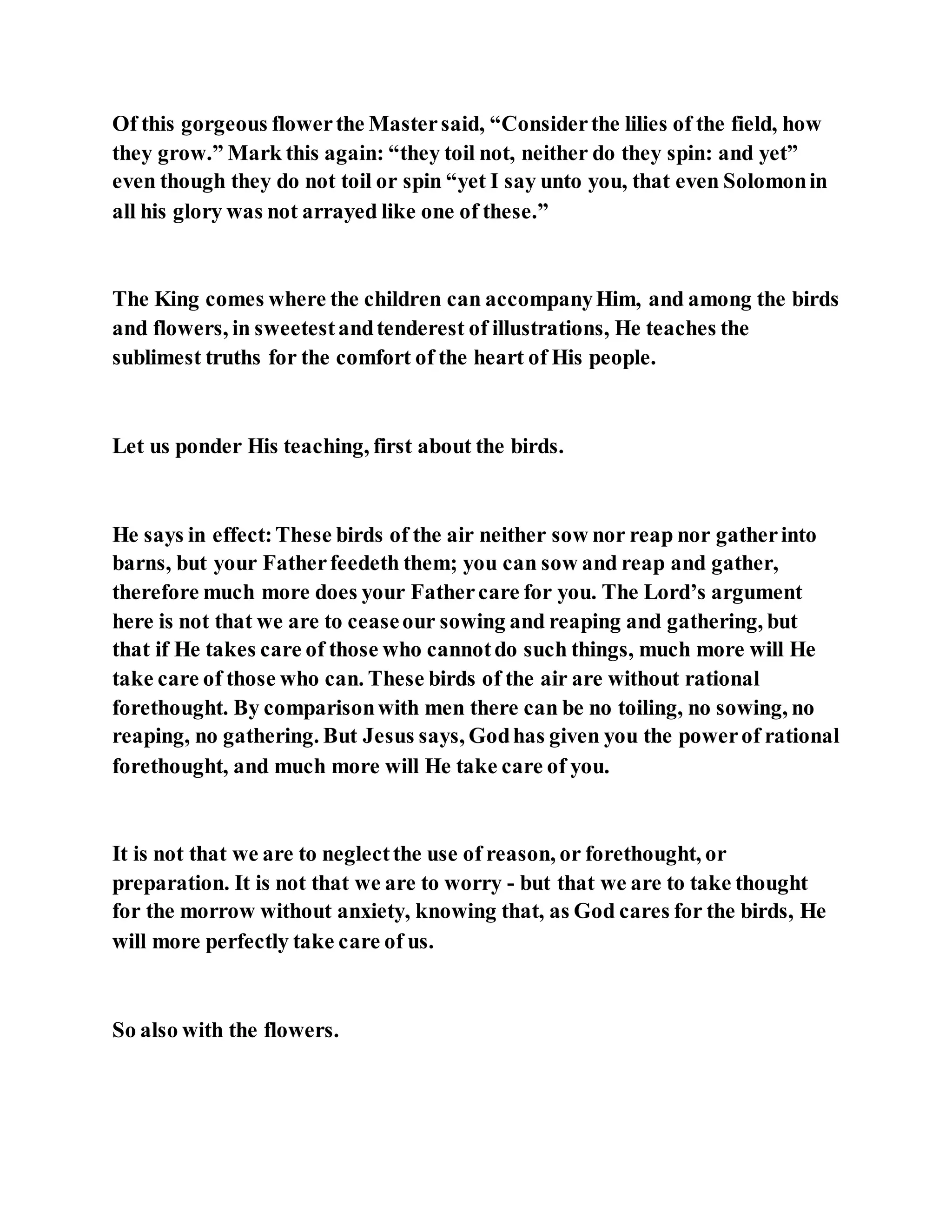

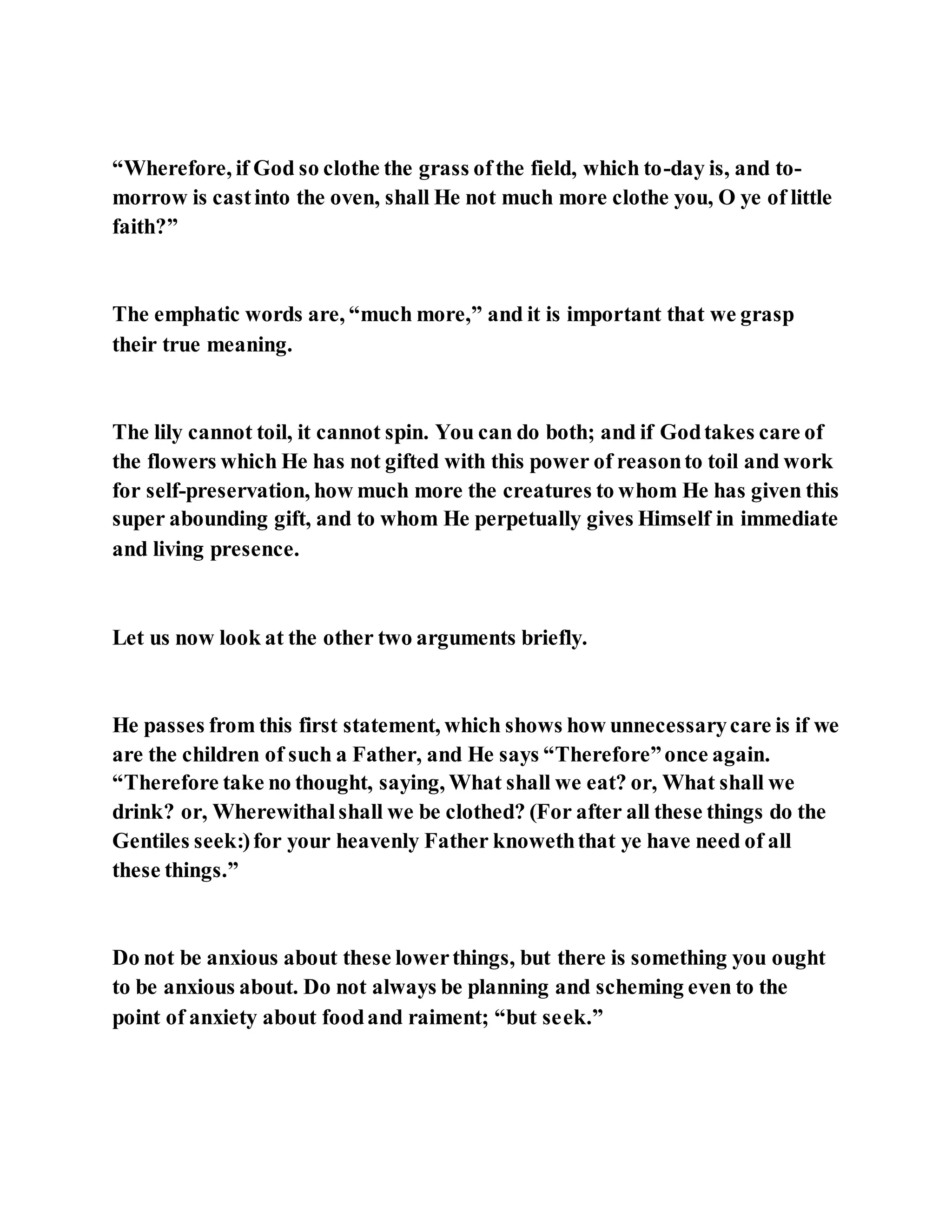
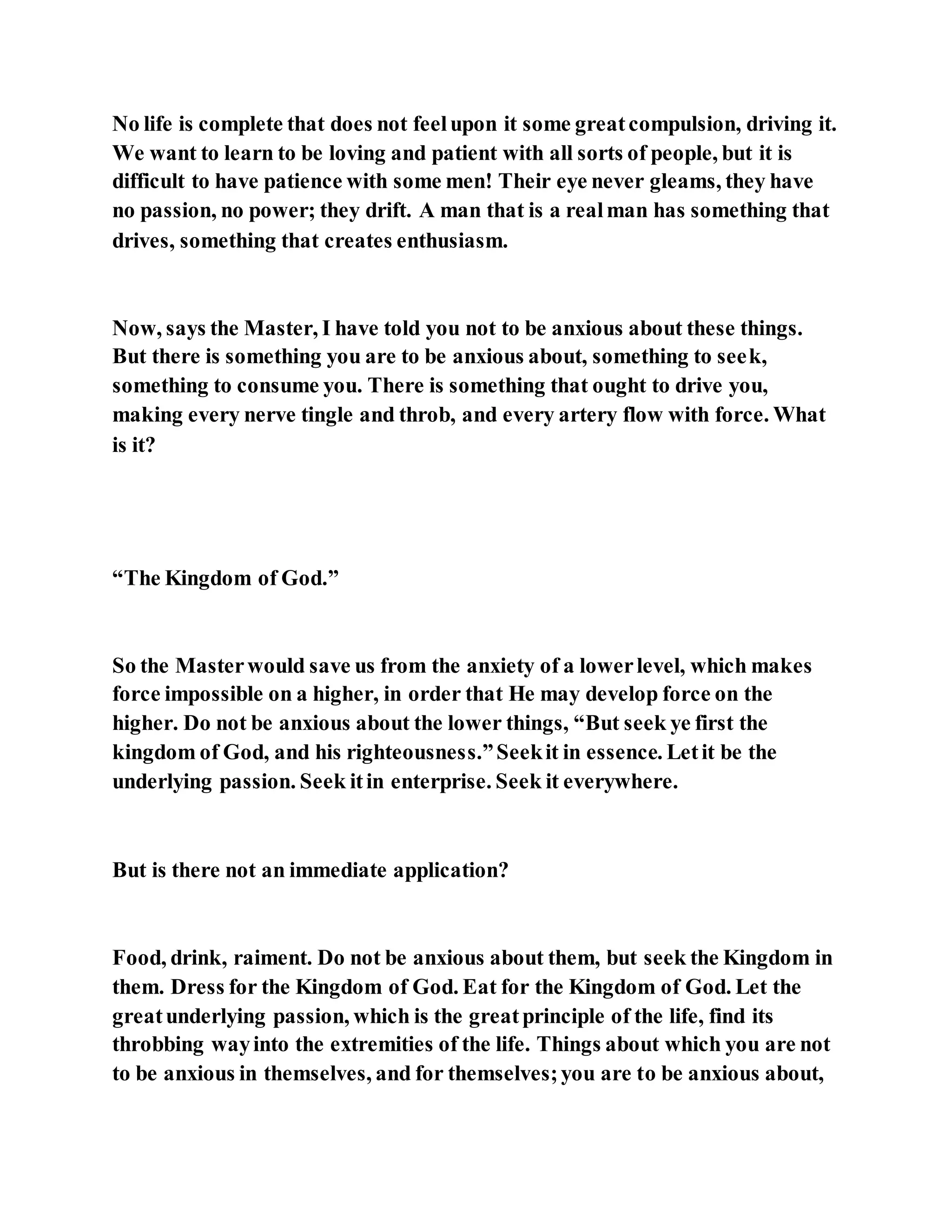
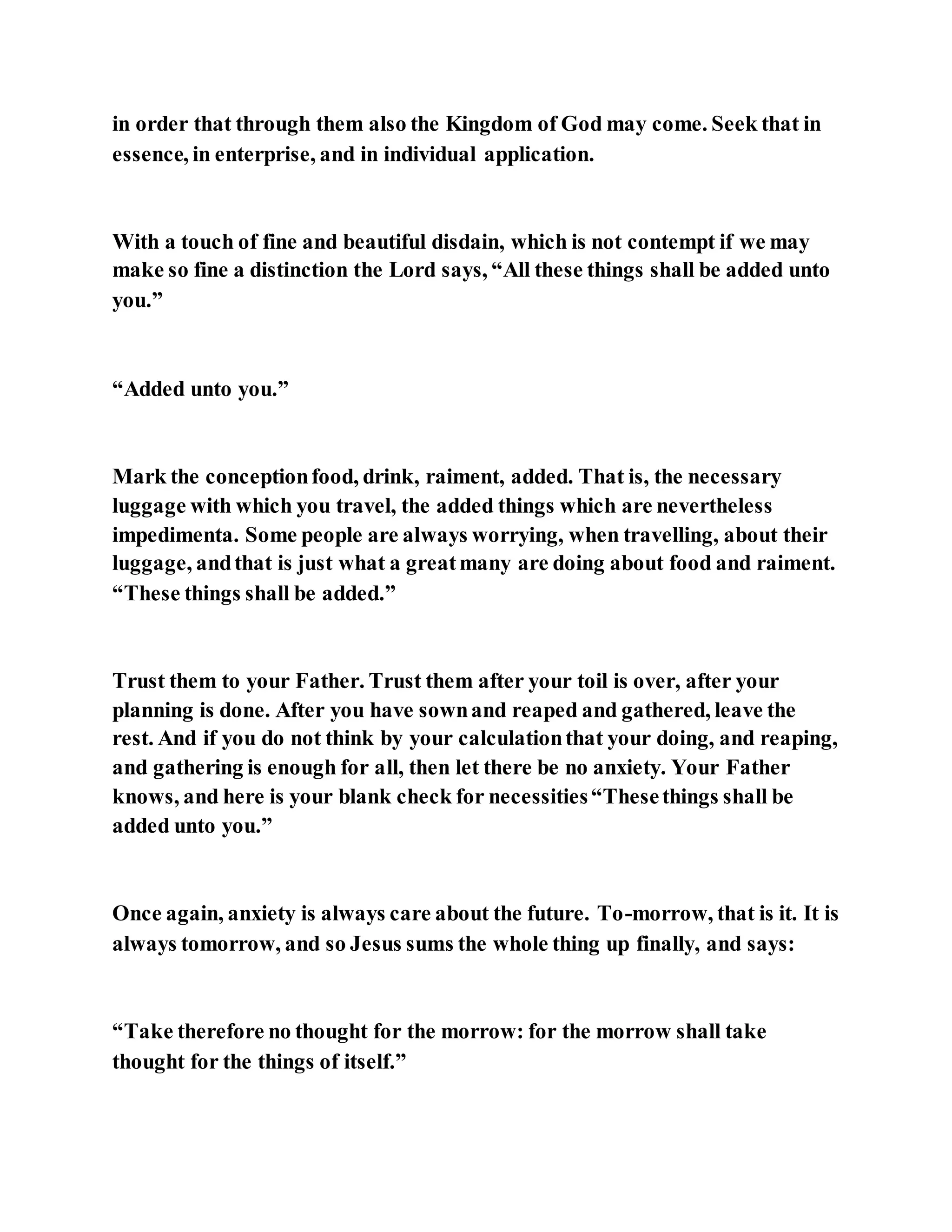
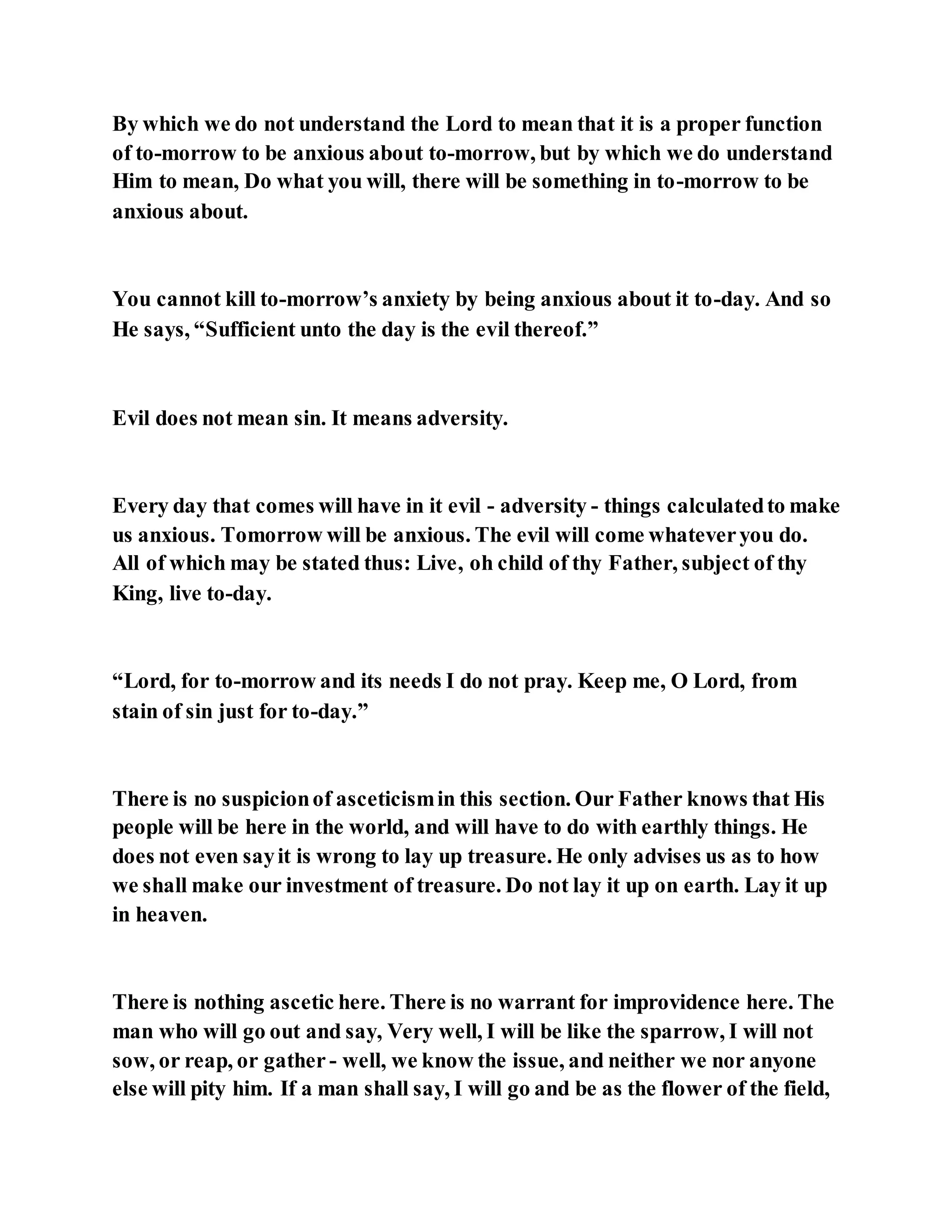

![The ancient Greeks thoughtof anxiety as worrying and tormenting cares that
belongedto human life, such as sorrow and suffering. They could rarely
conceive ofa life lived without such cares, robbing them of sleep, and driving
them to drown their cares in love or drink, hoping againsthope that they
would become numb to anxiety's blows. Yet the only way to be free from
anxiety in their thought was death [TDNT, IV, 589-590].
It seems that times have changedvery little. Anxiety has become as much a
part of life as inhaling and exhaling. Scoresofbooks have been written to help
people cope with worry. Seminars offer techniques to face the stress coming
from anxiety. An array of drugs is takenby the tons in the Westernworld in
hope of dulling anxiety's effects. Many advertisers prey upon anxieties to
increase their sales. Newscastersfoment anxiety by trying to find the most
fear-inspiring possibilities current in our world.
What is missing from all of this is a right view of God and his providential
governing overall his creation. If the omniscient and omnipotent Governor of
the universe is missing, then there is greatcause forworry!
But Jesus declaresthat it is different for kingdom citizens. Our heavenly
Father is not in absentia but faithfully exerting his might to demonstrate the
glory of his name in every detail of life. We need not be anxious if we known
God as Father. Anxiety's cure is found in the confident trust the believer
places in his heavenly Father. Can we really live differently than the world in
relationship to anxiety? Consider how Jesus Christassures us of the Father's
care.
I. A higher value](https://image.slidesharecdn.com/jesuswasabirdwatcher-200703143708/75/Jesus-was-a-bird-watcher-152-2048.jpg)

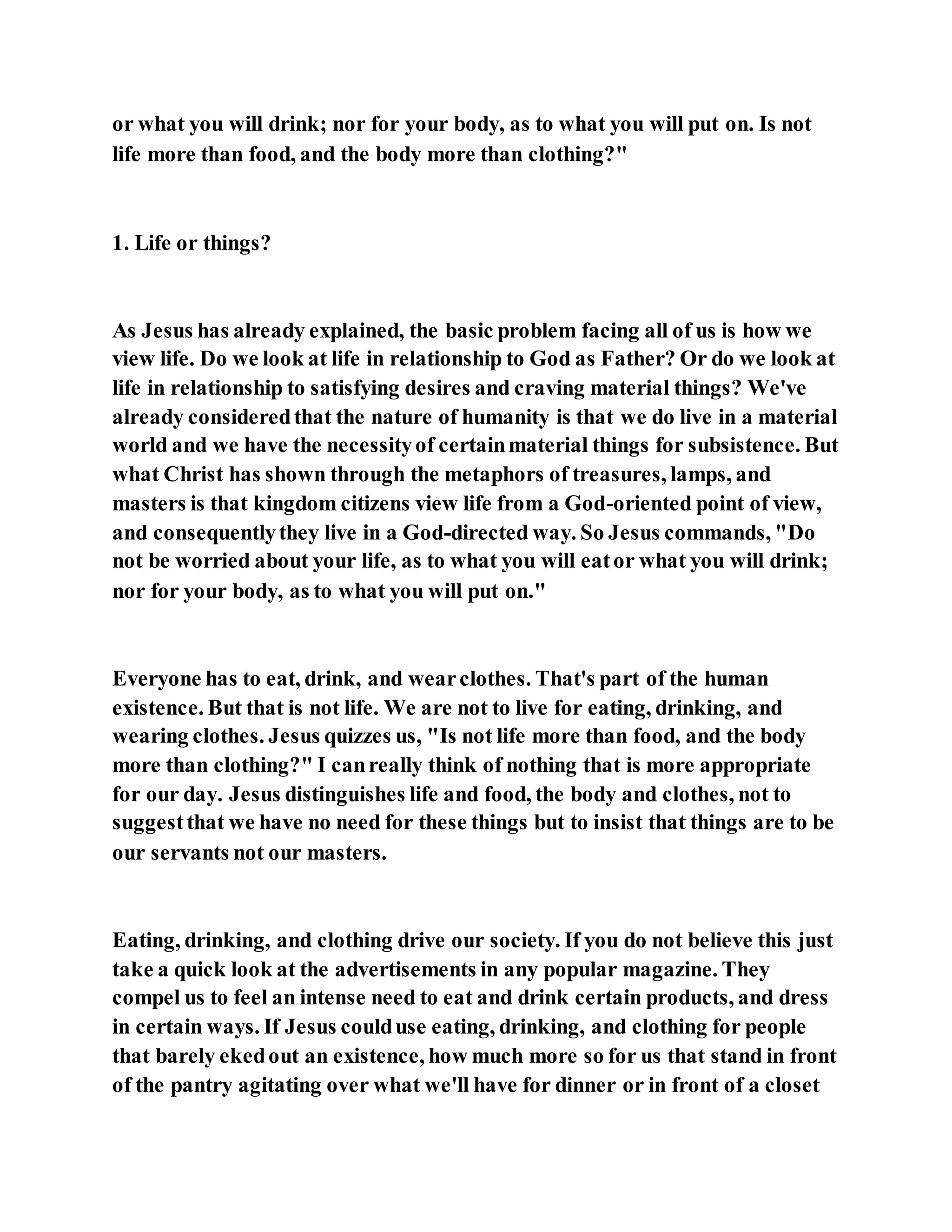
![worrying about which outfit we will wear. Things control us far more than we
would like to admit.
Again, Jesus is not commanding us to refrain from eating, drinking, and
wearing clothes. Those are necessitiesoflife. But that is just the point. So
much of our worries involve the basic necessitiesoflife. Typically, we are not
interestedin necessities as much as we are comforts, compliments, and
compulsions. We want to feel well, attract attention, and satisfy desires. So we
worry about consuming certainthings or dressing in certain ways or owning
certain products or achieving a certainstatus. All the while we forgetour
relationship to God.
Life is more valuable than food and clothing. By "life" Jesus refers to the
whole of our existence - it is life in relationship to God through Christ. Even
the natural order has a better handle on this than does humanity. "Look at
the birds [that is, give them carefulthought, take the time to look and ponder]
of the air, that they do not sow, nor reap nor gather into barns, and yet your
heavenly Father feeds them. Are you not worth much more than they?" It is
not that the birds are not actively involved in pecking seeds ordigging insects
or nibbling on the carcassofa dead animal. They must have food just like we
must. But it is our Father that cares forthem. He does not care for them as
their Father but as the God of providential rule. The value of a human far
exceeds the birds and other creatures. If God cares forthem that will perish
and go back to the dust of the earth, much more so he will care for you whom
he values enough to redeem you through the blood of his Son. So look at the
birds - considerhow God feeds them. Martin Luther makes the point in a
charming way.
You see ... he is making the birds our schoolmasters andteachers. It is a great
and abiding disgrace to us that in the Gospela helpless sparrow should
become a theologianand a preacher to the wisestof men... Wheneveryou
listen to a nightingale, therefore, you are listening to an excellentpreacher... It
is as if he were saying "I prefer to be in the Lord's kitchen. He has made](https://image.slidesharecdn.com/jesuswasabirdwatcher-200703143708/75/Jesus-was-a-bird-watcher-155-2048.jpg)
![heaven and earth, and he himself is the cook and the host. Everyday he feeds
and nourishes innumerable little birds out of his hand" [quoted by John Stott,
Christian Counter-Culture, 164].
The same is true of the wild flowers instructing us. "And why are you worried
about clothing? Observe how the lilies of the field grow;they do not toil nor
do they spin, yet I say to you that not even Solomon in all his glory clothed
himself like one of these." In the late sixties I traveled with some relatives to
Europe. My cousin, George, and I hiked all day in the mountains around
Zermatt, Switzerland. I still remember the scene as we came down from one
mountain toward the valley, when suddenly we happened upon a field of
wildflowers. I gawkedin amazement at the beauty all around. Even for a
fourteen year old it was far too beautiful to ignore. Solomonhad nothing on
these wildflowers!But all of that God-givenbeauty clothing the flowers does
not last. In the ancient world they were gathered, dried, and used to ignite a
quick, hot blaze for the clay ovens that bakedtheir bread. "But if God so
clothes the grass of the field, which is alive today and tomorrow is thrown into
the furnace, will He not much more clothe you?" Flowers do not live into
eternity yet God provides them with such beautiful clothes that
manufacturers are still trying to copy them to make silk and artificial flowers.
Will a God that gives so much attention to the detail of his creationfail to
clothe you? No wonder that our worry about the things of life brings the
rebuke, "You of little faith!"
2. God's care
The essenceofworry is two-fold: (1) we exert mental and emotional energy
for things outside our control. "And who of you by being worried canadd a
single hour to his life?" There's some question about whether the Greek
means adding a cubit (about 18 inches) to one's height or extending the length
of one's life. Worry cannot do either. The Lord can add an hour to one's life](https://image.slidesharecdn.com/jesuswasabirdwatcher-200703143708/75/Jesus-was-a-bird-watcher-156-2048.jpg)
![or a week or years, and he certainly adds a cubit betweenchildhood and
adulthood [as Stott points out, 163]. But worry cannothelp you.
But worry also (2) acts as thought God will not provide - which is unbelief.
That is why Christ chides such folly as an example of little faith persons [Gk.,
oligopistoi]. Worry means that we do not trust the Fatherto care for us as his
children. We do not believe his promises or trust in his powerto provide or
rest in the abundance of his compassiontowardus. Jesus wants us to see that
worry is not merely about us - it is about God, and our deficient view of him
as heavenly Father.
The emphasis in the Sermon on the Mount is that God is "your Father" (5:16,
45, 48; 6:1, 4, 6, 9, 15, 18). He is not a distant, cosmic Being of some powerand
ability (as in Deism and some forms of modern liberalism). He is not a force
that operates within the universe (as in New Age theology). He is not a
disinteresteddeity that tolerates our existence while he humors himself (as in
the Greek pantheonof gods). He is "your Father" that feeds the birds and
clothes the wildflowers, and who cares infinitely more for you as his child. If
he cares for temporal things how much more for you that are made in his
image, and redeemedby the blood of his Son? As a child of God you have a
higher value than the temporal elements of creation, and therefore you have
the assurancethat the Father will "much more" care for you.
II. A nobler ambition
It is one thing to acknowledgeGod's care as Father, and the need to no longer
worry, but quite another thing to apply all of this to daily life. Jesus instructs
us on how to deal with worry in our lives so that we live like kingdom citizens.](https://image.slidesharecdn.com/jesuswasabirdwatcher-200703143708/75/Jesus-was-a-bird-watcher-157-2048.jpg)
![1. Recognizing misplacedpriorities
Why is worry such a problem anyway? Again our Lord repeats his command
to not engage in worry. "Do not worry then [i.e., in light of God's care for
creationand your higher value to him], saying, 'What will we eat?'or 'What
will we drink?' or 'What will we wearfor clothing?'" He uses a verb tense
that intensifies the sense ofanxiety. You canalmost hear someone running
around the room, repetitiously crying out, 'what will we eat? What will we
drink? What will we wearfor clothing?'Those that do not know God as
Father have a reasonto be frantic about these things. For the Gentiles eagerly
seek allthese things." That is the norm for the "Gentiles" or"peoples," a
term used to refer to the unbelieving world. They have no heavenly Father to
care for them so they must resortto the futility of worry. Worry characterizes
the unbelieving - but not the kingdom citizen. Worry in a Christian detracts
from the reliability of the gospel;it makes kingdomlife appear to be no
different from the way unbelievers live.
The unbeliever spends his time thinking about how to satisfy his desires. His
priorities revolve around himself. He may indeed do some worthwhile things
in life but ultimately he pursues life without submission to God's rule. He
prioritizes his comforts, compliments, and compulsions. But he has no heart
for the Kingship of Christ over his life, and no trust in God as his heavenly
Father. So he must go it alone - and that involves worrying about satisfying
every whim.
This is where the kingdom citizen stands in sharp contrast. His priorities are
seton heavenly things rather than earthly. The light of the gospeldirects his
heart - he views life in light of the cross of Christ. His loyalty is to one master -
the Lord. In a word, his priorities are seton living like a kingdom citizen
under the rule of his King and care of his Father. Where are your priorities
placed?](https://image.slidesharecdn.com/jesuswasabirdwatcher-200703143708/75/Jesus-was-a-bird-watcher-158-2048.jpg)
![2. Believing that the Father knows
The Christian turns from worry as he believes and understands that God is
his Father. "Foryour heavenly Father knows that you need all these things,"
Jesus assuresus. It is not just as the omniscient God that he knows - though he
does, but he knows our needs as "your heavenly Father." The Greek
constructionis emphatic, "ForHe knows - He that is your Father, the
heavenly One, that you have need of all these things." There is a double
implication here. On one hand, because he is our heavenly Father he is able to
know preciselywhat we need and through the normal means that he has set in
motion in life he provides those needs. So howeverthe provisions may come
your way - whether through work, investments, retirement, gifts - the
heavenly Father knowingly provides for you.
But on the other hand, because he is "your heavenly Father" you can ask for
provisions that you need. There are those times that God will order needs in
our lives so that we might seek his face, and be reminded afreshof the
abundance of his grace towardus. When we have a need either the heavenly
Father will provide through some means according to his goodpleasure or he
will show us by denying that provision that what we perceive to be a need is a
want, and unnecessaryfor us at that point in life.
Faith in the Father's knowledge and care for us does not mean that we are to
be passive in dealing with the issues oflife. The whole contextof the Sermon
on the Mount points againstthat. Nor does it mean that we are to equate not
worrying with being carefree andunconcerned about life's needs. As Don
Carsonhas expressed, that person "needs to hear something about discipline,
self-sacrifice,and hard work, and he needs to have illegitimate worry
differentiated from these" [The Sermon on the Mount, 84]. Trusting the
Father's care does not mean that we are unconcernedabout life. ForJesus has](https://image.slidesharecdn.com/jesuswasabirdwatcher-200703143708/75/Jesus-was-a-bird-watcher-159-2048.jpg)
![already taught us that we are to pray about daily needs, "Give us this day our
daily bread."
We must also be careful that we do not construe not worrying with waiting for
God to provide without wise planning and diligent work on our part. Martin
Luther said it best, "Godwants nothing to do with the lazy, gluttonous bellies
who are neither concernednor busy; they actas if they just had to sit and wait
for him to drop a roastedgooseinto their mouth" [quoted by Stott, 165]. Not
worrying also does not mean that our physical needs are unimportant. They
are important but they are not most important. They are to serve us; not be
masters over us.
3. Applying the right focus
Instead of being like the unbelieving world that worries and carps about what
they do not have, the kingdom citizen has a different focus. "But seek firstHis
kingdom and His righteousness,and all these things will be added to you."
The way to what you need is not found by wrapping life around things, and
selfishambitions. It is found by applying your mind, energy, and priorities to
seeking the Lord and his righteousness.
There is a distinct contrastintended. "Forthe Gentiles eagerlyseek allthese
things," explained Christ. That is, the unbelieving world is consumed with
creature comforts, satisfying desires, building earthly treasures, and being
right in his own eyes. He just wants to be happy in life. So he eagerlyseeks
after temporal things. He believes that if he can accumulate enoughtemporal
things or attractenough temporal attention or satisfyenough temporal
desires, then he will be happy and enjoy life. But he never reaches thatpoint.
Though he may have points that he thinks he has reached the zenith of life, he
finds that he must continue to seek more things if he is to be satisfiedwith life.](https://image.slidesharecdn.com/jesuswasabirdwatcher-200703143708/75/Jesus-was-a-bird-watcher-160-2048.jpg)
![He has no thought to seek afterthe Lord. His life is wrapped up in the
temporal. So when things do not go as planned or hoped for, he worries and
frets. His way of life is one of anxiety.
But the kingdom citizen has a different pursuit. Both Gentiles and kingdom
citizens are seeking something. One seeks the temporal for momentary
happiness. The other seeks the Lord and the kind of righteousness that leads
to a holier life. One lives for the moment; the other lives with eternity in view.
To "seek first the kingdom of God and His righteousness"demands that all of
life be focusedon the Lord. It begins with knowing the Lord and pursuing
Him through the Scriptures. If we desire to understand the Lord and what it
means for him to be King overall of life, and gracious Rulerover every
circumstance of life, then we must go to the Word of God. We know so little of
his kingdom when we neglecthis Word. Seeking firstthe kingdom of God also
has to do with your obedience to the Word of God. You cannotand will not
seek the Lord without obedience. Martyn Lloyd-Jones points out that this
command means, "that we are to concentrate upon perfecting our
relationship to God as our heavenly Father" [The Sermon on the Mount, II,
142]. That relationship involves knowing and obeying Him.
"His righteousness"continues the use of the term that we've already seenin
the Sermonon the Mount. It is right living that flows out of being in right
relationship to the Lord through the redemptive work of Christ. "He is not
telling His hearers how to make themselves Christian," writes Lloyd-Jones,
"but He is telling them how to behave because they are Christians" [143].
"Righteousness" has to do with the way you practice the Christian life in
attitude, thought, tongue, and deed.](https://image.slidesharecdn.com/jesuswasabirdwatcher-200703143708/75/Jesus-was-a-bird-watcher-161-2048.jpg)

![2. Trust today to God's care
But what if troubles do come today? "Eachday has enough trouble [or
misfortune] of its own." You have a heavenly Fatherthat is caring for you. If
He cares enoughto feedthe birds and clothe the flowers, then surely He will
care much more for you that He calls His child. He rules over the minutest
detail confronting your life eachday. Trust Him. Meditate upon His Fatherly
care and provision for you. Believe his promises. Seek to learn all that you can
about him in the context of today with all of its troubles. And seek to practice
the kind of righteousness thatJesus has set forth in the Sermon on the Mount.
Conclusion
Worry is the undue concentrationof your thoughts and energies upon
yourself while disregarding the rule of Christ over your life. The cure for such
anxiety is found in knowing that through the grace of Godshown to you in
Jesus Christ, God is your heavenly Father. And since He is your heavenly
Father, you are to seek His kingdom as the priority of your life, and seek His
righteousness as the practice of life. Be so diligent in seeking the kingdom of
God and His righteousness that you do not have time for worry. And that's
really living like a kingdom citizen.
Permissions:You are permitted and encouragedto reproduce and distribute
this material in any format provided that you do not alter the wording in any
way and you do not charge a fee beyond the costof reproduction. For web
posting, a link to this document on our website is preferred. Any exceptions to
the above must be explicitly approved by South Woods BaptistChurch.
Please include the following statement on any distributed copy:
Copyright South Woods BaptistChurch. Website: www.southwoodsbc.org.
Used by permission as granted on web site. Questions, comments, and
suggestionsaboutour site canbe senthere.](https://image.slidesharecdn.com/jesuswasabirdwatcher-200703143708/75/Jesus-was-a-bird-watcher-163-2048.jpg)
![3175 GermantownRd. S. | Memphis, Tennessee| 38119| (901)758-1213
Copyright 2011, SouthWoods BaptistChurch, All Rights Reserved
The Cure for Anxiety
Matthew 6:25-34
November 17, 2002
The ancient Greeks thoughtof anxiety as worrying and tormenting cares that
belongedto human life, such as sorrow and suffering. They could rarely
conceive ofa life lived without such cares, robbing them of sleep, and driving
them to drown their cares in love or drink, hoping againsthope that they
would become numb to anxiety's blows. Yet the only way to be free from
anxiety in their thought was death [TDNT, IV, 589-590].
It seems that times have changedvery little. Anxiety has become as much a
part of life as inhaling and exhaling. Scoresofbooks have been written to help
people cope with worry. Seminars offer techniques to face the stress coming
from anxiety. An array of drugs is takenby the tons in the Westernworld in
hope of dulling anxiety's effects. Many advertisers prey upon anxieties to
increase their sales. Newscastersfoment anxiety by trying to find the most
fear-inspiring possibilities current in our world.
What is missing from all of this is a right view of God and his providential
governing overall his creation. If the omniscient and omnipotent Governor of
the universe is missing, then there is greatcause forworry!](https://image.slidesharecdn.com/jesuswasabirdwatcher-200703143708/75/Jesus-was-a-bird-watcher-164-2048.jpg)

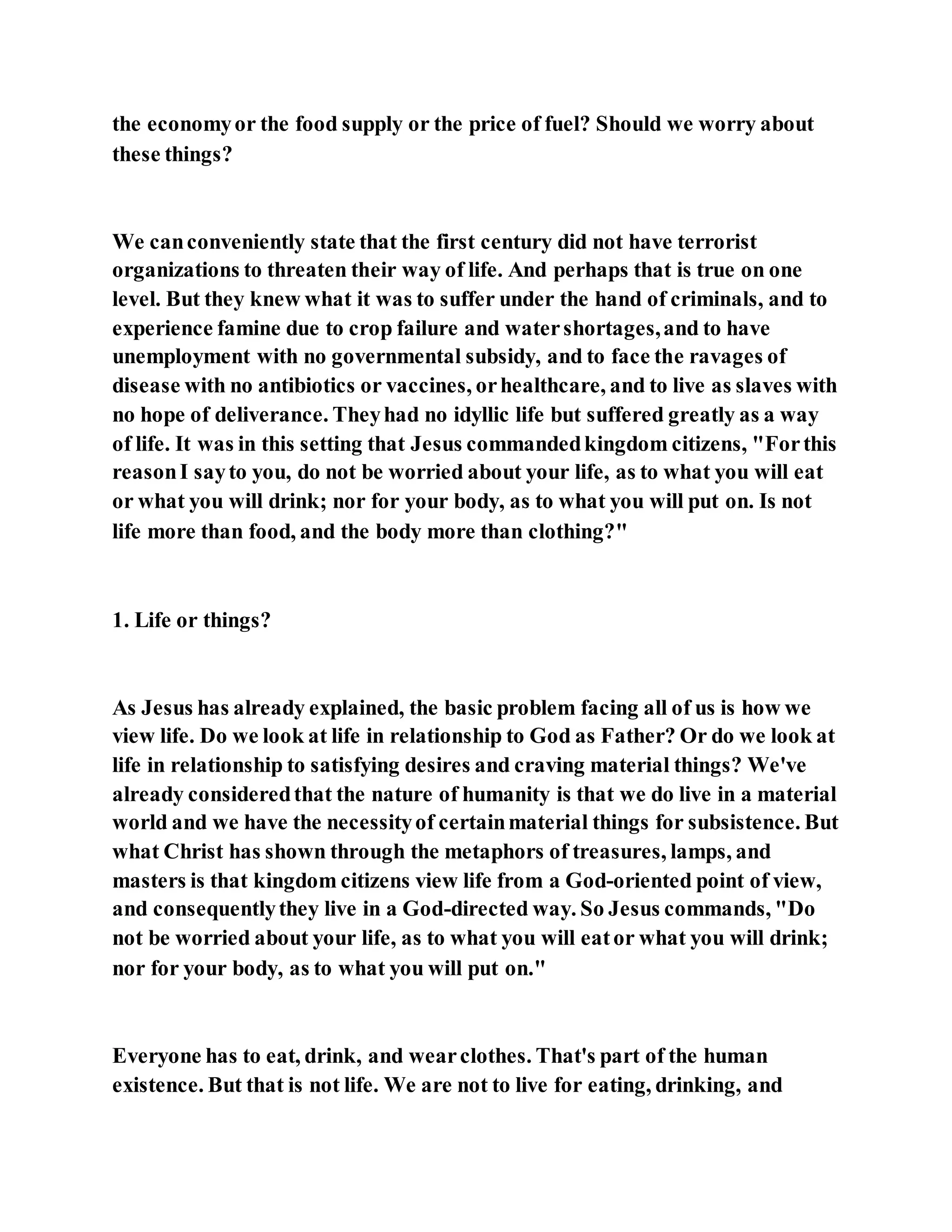
![wearing clothes. Jesus quizzes us, "Is not life more than food, and the body
more than clothing?" I canreally think of nothing that is more appropriate
for our day. Jesus distinguishes life and food, the body and clothes, not to
suggestthat we have no need for these things but to insist that things are to be
our servants not our masters.
Eating, drinking, and clothing drive our society. If you do not believe this just
take a quick look at the advertisements in any popular magazine. They
compel us to feel an intense need to eat and drink certain products, and dress
in certain ways. If Jesus coulduse eating, drinking, and clothing for people
that barely ekedout an existence, how much more so for us that stand in front
of the pantry agitating over what we'll have for dinner or in front of a closet
worrying about which outfit we will wear. Things control us far more than we
would like to admit.
Again, Jesus is not commanding us to refrain from eating, drinking, and
wearing clothes. Those are necessitiesoflife. But that is just the point. So
much of our worries involve the basic necessitiesoflife. Typically, we are not
interestedin necessities as much as we are comforts, compliments, and
compulsions. We want to feel well, attract attention, and satisfy desires. So we
worry about consuming certainthings or dressing in certain ways or owning
certain products or achieving a certainstatus. All the while we forgetour
relationship to God.
Life is more valuable than food and clothing. By "life" Jesus refers to the
whole of our existence - it is life in relationship to God through Christ. Even
the natural order has a better handle on this than does humanity. "Look at
the birds [that is, give them carefulthought, take the time to look and ponder]
of the air, that they do not sow, nor reap nor gather into barns, and yet your
heavenly Father feeds them. Are you not worth much more than they?" It is
not that the birds are not actively involved in pecking seeds ordigging insects](https://image.slidesharecdn.com/jesuswasabirdwatcher-200703143708/75/Jesus-was-a-bird-watcher-167-2048.jpg)
![or nibbling on the carcassofa dead animal. They must have food just like we
must. But it is our Father that cares forthem. He does not care for them as
their Father but as the God of providential rule. The value of a human far
exceeds the birds and other creatures. If God cares forthem that will perish
and go back to the dust of the earth, much more so he will care for you whom
he values enough to redeem you through the blood of his Son. So look at the
birds - considerhow God feeds them. Martin Luther makes the point in a
charming way.
You see ... he is making the birds our schoolmasters andteachers. It is a great
and abiding disgrace to us that in the Gospel a helpless sparrow should
become a theologianand a preacher to the wisestof men... Wheneveryou
listen to a nightingale, therefore, you are listening to an excellentpreacher... It
is as if he were saying "I prefer to be in the Lord's kitchen. He has made
heaven and earth, and he himself is the cook and the host. Everyday he feeds
and nourishes innumerable little birds out of his hand" [quoted by John Stott,
Christian Counter-Culture, 164].
The same is true of the wild flowers instructing us. "And why are you worried
about clothing? Observe how the lilies of the field grow;they do not toil nor
do they spin, yet I say to you that not even Solomon in all his glory clothed
himself like one of these." In the late sixties I traveled with some relatives to
Europe. My cousin, George, and I hiked all day in the mountains around
Zermatt, Switzerland. I still remember the scene as we came down from one
mountain toward the valley, when suddenly we happened upon a field of
wildflowers. I gawkedin amazement at the beauty all around. Even for a
fourteen year old it was far too beautiful to ignore. Solomonhad nothing on
these wildflowers!But all of that God-givenbeauty clothing the flowers does
not last. In the ancient world they were gathered, dried, and used to ignite a
quick, hot blaze for the clay ovens that bakedtheir bread. "But if God so
clothes the grass of the field, which is alive today and tomorrow is thrown into
the furnace, will He not much more clothe you?" Flowers do not live into
eternity yet God provides them with such beautiful clothes that
manufacturers are still trying to copy them to make silk and artificial flowers.](https://image.slidesharecdn.com/jesuswasabirdwatcher-200703143708/75/Jesus-was-a-bird-watcher-168-2048.jpg)
![Will a God that gives so much attention to the detail of his creationfail to
clothe you? No wonder that our worry about the things of life brings the
rebuke, "You of little faith!"
2. God's care
The essenceofworry is two-fold: (1) we exert mental and emotional energy
for things outside our control. "And who of you by being worried canadd a
single hour to his life?" There's some question about whether the Greek
means adding a cubit (about 18 inches) to one's height or extending the length
of one's life. Worry cannot do either. The Lord can add an hour to one's life
or a week or years, and he certainly adds a cubit betweenchildhood and
adulthood [as Stott points out, 163]. But worry cannothelp you.
But worry also (2) acts as thought God will not provide - which is unbelief.
That is why Christ chides such folly as an example of little faith persons [Gk.,
oligopistoi]. Worry means that we do not trust the Fatherto care for us as his
children. We do not believe his promises or trust in his powerto provide or
rest in the abundance of his compassiontowardus. Jesus wants us to see that
worry is not merely about us - it is about God, and our deficient view of him
as heavenly Father.
The emphasis in the Sermon on the Mount is that God is "your Father" (5:16,
45, 48; 6:1, 4, 6, 9, 15, 18). He is not a distant, cosmic Being of some powerand
ability (as in Deism and some forms of modern liberalism). He is not a force
that operates within the universe (as in New Age theology). He is not a
disinteresteddeity that tolerates our existence while he humors himself (as in
the Greek pantheonof gods). He is "your Father" that feeds the birds and
clothes the wildflowers, and who cares infinitely more for you as his child. If
he cares for temporal things how much more for you that are made in his](https://image.slidesharecdn.com/jesuswasabirdwatcher-200703143708/75/Jesus-was-a-bird-watcher-169-2048.jpg)
![image, and redeemedby the blood of his Son? As a child of God you have a
higher value than the temporal elements of creation, and therefore you have
the assurancethat the Father will "much more" care for you.
II. A nobler ambition
It is one thing to acknowledgeGod's care as Father, and the need to no longer
worry, but quite another thing to apply all of this to daily life. Jesus instructs
us on how to deal with worry in our lives so that we live like kingdom citizens.
1. Recognizing misplacedpriorities
Why is worry such a problem anyway? Again our Lord repeats his command
to not engage in worry. "Do not worry then [i.e., in light of God's care for
creationand your higher value to him], saying, 'What will we eat?'or 'What
will we drink?' or 'What will we wearfor clothing?'" He uses a verb tense
that intensifies the sense ofanxiety. You canalmost hear someone running
around the room, repetitiously crying out, 'what will we eat? What will we
drink? What will we wearfor clothing?'Those that do not know God as
Father have a reasonto be frantic about these things. For the Gentiles eagerly
seek allthese things." That is the norm for the "Gentiles" or"peoples," a
term used to refer to the unbelieving world. They have no heavenly Father to
care for them so they must resortto the futility of worry. Worry characterizes
the unbelieving - but not the kingdom citizen. Worry in a Christian detracts
from the reliability of the gospel;it makes kingdomlife appear to be no
different from the way unbelievers live.
The unbeliever spends his time thinking about how to satisfy his desires. His
priorities revolve around himself. He may indeed do some worthwhile things](https://image.slidesharecdn.com/jesuswasabirdwatcher-200703143708/75/Jesus-was-a-bird-watcher-170-2048.jpg)

![abundance of his grace towardus. When we have a need either the heavenly
Father will provide through some means according to his goodpleasure or he
will show us by denying that provision that what we perceive to be a need is a
want, and unnecessaryfor us at that point in life.
Faith in the Father's knowledge and care for us does not mean that we are to
be passive in dealing with the issues oflife. The whole contextof the Sermon
on the Mount points againstthat. Nor does it mean that we are to equate not
worrying with being carefree andunconcerned about life's needs. As Don
Carsonhas expressed, that person "needs to hear something about discipline,
self-sacrifice,and hard work, and he needs to have illegitimate worry
differentiated from these" [The Sermon on the Mount, 84]. Trusting the
Father's care does not mean that we are unconcernedabout life. ForJesus has
already taught us that we are to pray about daily needs, "Give us this day our
daily bread."
We must also be careful that we do not construe not worrying with waiting for
God to provide without wise planning and diligent work on our part. Martin
Luther said it best, "Godwants nothing to do with the lazy, gluttonous bellies
who are neither concernednor busy; they actas if they just had to sit and wait
for him to drop a roastedgooseinto their mouth" [quoted by Stott, 165]. Not
worrying also does not mean that our physical needs are unimportant. They
are important but they are not most important. They are to serve us; not be
masters over us.
3. Applying the right focus
Instead of being like the unbelieving world that worries and carps about what
they do not have, the kingdom citizen has a different focus. "But seek firstHis
kingdom and His righteousness,and all these things will be added to you."](https://image.slidesharecdn.com/jesuswasabirdwatcher-200703143708/75/Jesus-was-a-bird-watcher-172-2048.jpg)

![relationship to God as our heavenly Father" [The Sermon on the Mount, II,
142]. That relationship involves knowing and obeying Him.
"His righteousness"continues the use of the term that we've already seenin
the Sermonon the Mount. It is right living that flows out of being in right
relationship to the Lord through the redemptive work of Christ. "He is not
telling His hearers how to make themselves Christian," writes Lloyd-Jones,
"but He is telling them how to behave because they are Christians" [143].
"Righteousness" has to do with the way you practice the Christian life in
attitude, thought, tongue, and deed.
It is as though our Lord tells us, 'You concentrate onseeking the rule of God
over your life and the practice of his righteousness, and let him concentrate on
providing for you': "and all these things will be added to you."
III. A better way
Instead of worrying about the many details of life, Jesus tells us that we are to
concentrate onseeking to know more and more of his rule over our lives, and
the practice of his righteousness as we grow in holiness. He is to be our
priority and concern. Do you live like that? Or do you give an occasional
glance God' way, and then fret about life? There is a better way.
1. Leave tomorrow in God's hands
Anxiety is really fretfulness over what has not taken place. It is a concern
about tomorrow while living in the today. But Jesus commands us, "So do not
worry about tomorrow;for tomorrow will care for itself. Eachday has](https://image.slidesharecdn.com/jesuswasabirdwatcher-200703143708/75/Jesus-was-a-bird-watcher-174-2048.jpg)
![enough trouble of its own." We canbe sure that troubles will come our way;
that's just part of life. But none of us know what they will be, how intense they
will come, or when they will come. To worry over what has not happened is a
total waste ofmental and emotionalenergy - and more than that, it is a
categoricaldenialof God as your heavenly Fatherand His wise, gracious,
purposeful rule over your life.
So leave tomorrow in God's hands. You will likely have to discipline your
thoughts to be able to do this. You will need to give yourself reminders along
the wayto trust the Lord with your thoughts. Tomorrow belongs to the Lord.
You concentrate onseeking the Lord's kingdom and righteousness today.
2. Trust today to God's care
But what if troubles do come today? "Eachday has enough trouble [or
misfortune] of its own." You have a heavenly Fatherthat is caring for you. If
He cares enoughto feedthe birds and clothe the flowers, then surely He will
care much more for you that He calls His child. He rules over the minutest
detail confronting your life eachday. Trust Him. Meditate upon His Fatherly
care and provision for you. Believe his promises. Seek to learn all that you can
about him in the context of today with all of its troubles. And seek to practice
the kind of righteousness thatJesus has set forth in the Sermon on the Mount.
Conclusion
Worry is the undue concentrationof your thoughts and energies upon
yourself while disregarding the rule of Christ over your life. The cure for such
anxiety is found in knowing that through the grace of Godshown to you in
Jesus Christ, God is your heavenly Father. And since He is your heavenly](https://image.slidesharecdn.com/jesuswasabirdwatcher-200703143708/75/Jesus-was-a-bird-watcher-175-2048.jpg)

![farthings, and not one of them is forgottenbefore God? But even the very
hairs of your head are all numbered. Fearnot therefore: ye are of more value
than many sparrows.”
The Bible says that God cares and watches everybird. Jesus saidin Luke
12:6 that NOT ONE OF THEM IS FORGOTTEN. Jesus tells us this so that
we will realize the extent to which God cares, for even the number of hairs on
our head are numbered by God. Think about that!!! If God keeps track of the
number of hairs on your head, do you think He has missed the malicious
people who have hurt you, cheatedyou, lied about you, and done evil against
you? Not a chance!Hopefully you're not the abusive and evil one. Jesus said
in Matthew 12:36 that men will give accounton Judgment Day even for the
words they speak. Goddoesn't miss anything and nothing is a small matter to
God. The Bible tells us not to fearmankind; but rather, to FEAR God Whose
eyes are upon the evil and the good.
The Bible teaches respectforanimals and life. In the law of Moses, God
forbade anyone from harming birds in a nest if it was in their way. Isn't God
wonderful...
Deuteronomy 22:6-7, “If a bird's nestchance to be before thee in the way in
any tree, or on the ground, whether they be young ones, or eggs,and the dam
[mother] sitting upon the young, or upon the eggs,thou shalt not take the dam
[mother] with the young. But thou shalt in any wise let the dam [mother] go,
and take the young to thee; that it may be well with thee, and that thou mayest
prolong thy days.”
When I read this Scripture passage Iimmediately thought about pregnant
fish, and how they are often releasedto give birth to more fish. It very likely
could be that God wanted the mother bird to be able to reproduce again, and
demanded that she be releasedinto the wild. I think that makes the most
sense, but I am not sure. Whether that's what this passage means ornot, it is
certainly the ethical(right) thing to do to respectmotherhood, whether it be
human or animal. I do think that is what this Scripture is teaching, respectfor
reproduction in life. Look at all the endangeredspecies in the world today,
and how many birds and animals are extinct. It would certainly make sense](https://image.slidesharecdn.com/jesuswasabirdwatcher-200703143708/75/Jesus-was-a-bird-watcher-177-2048.jpg)



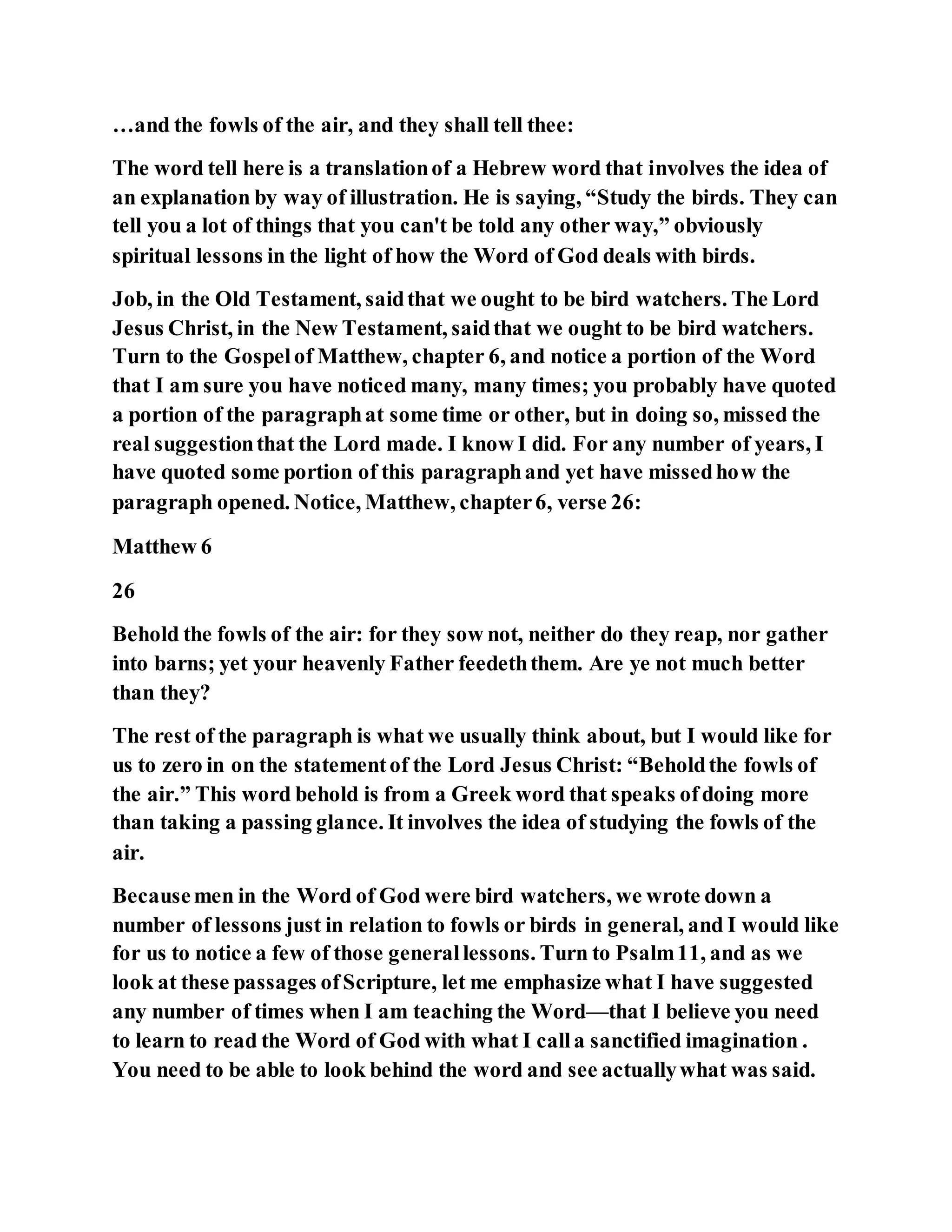
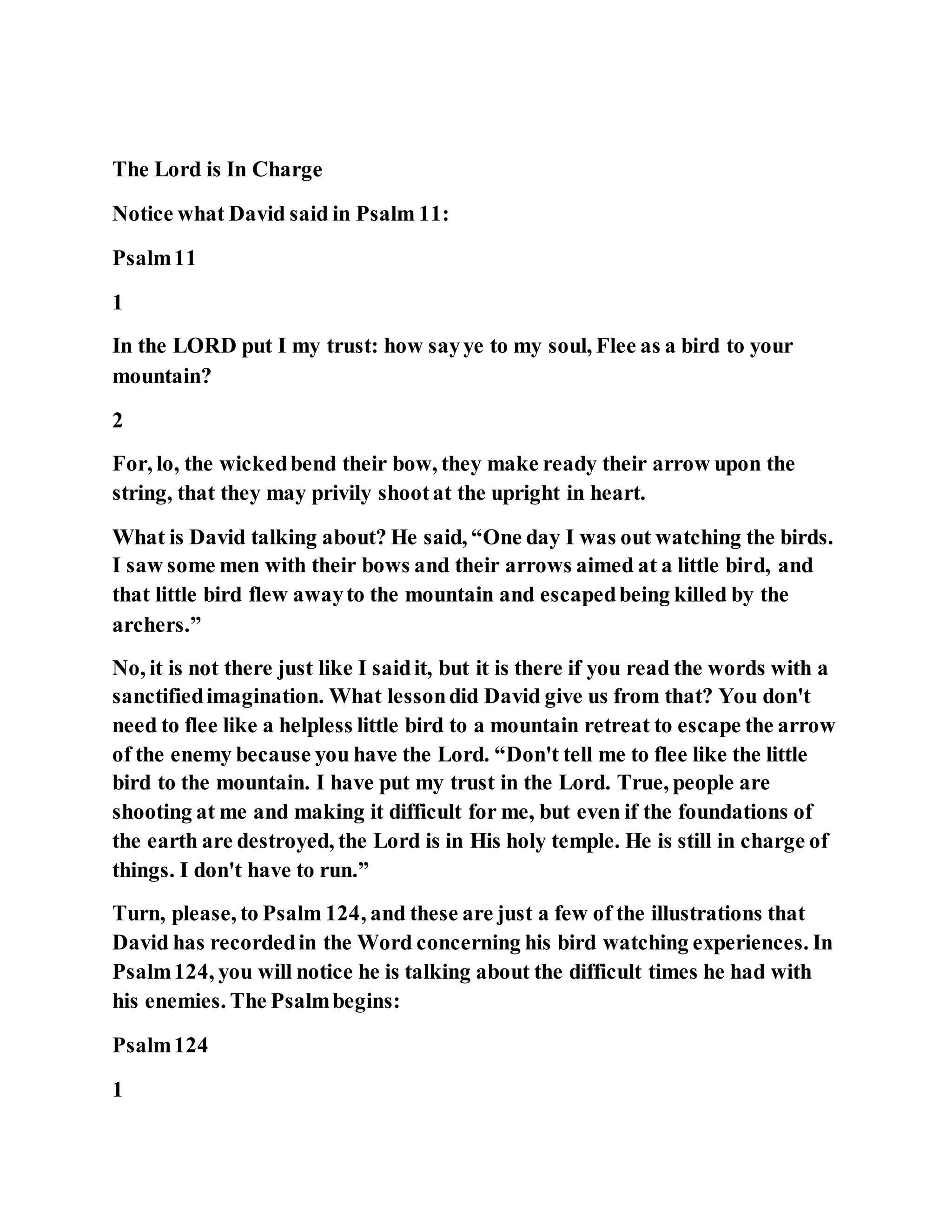


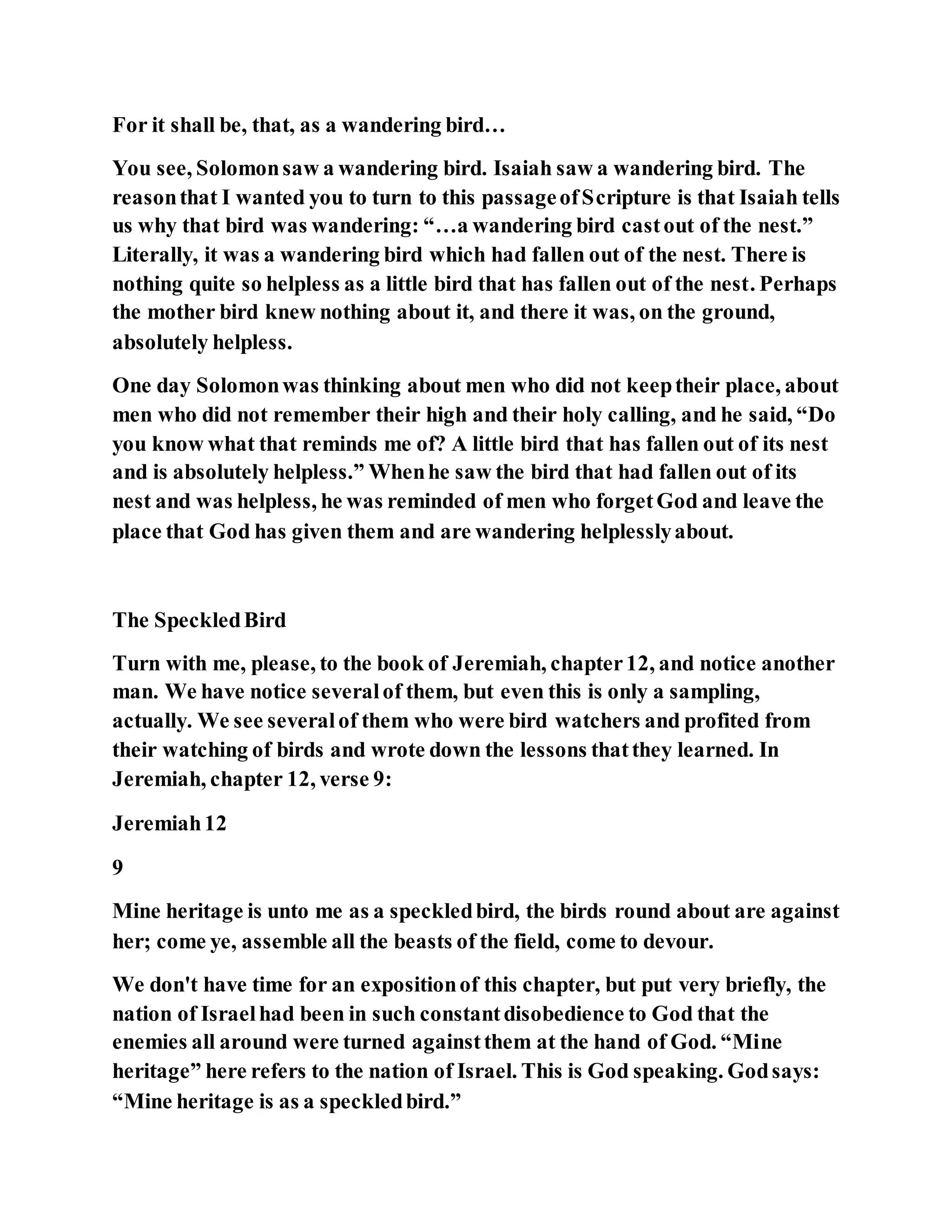
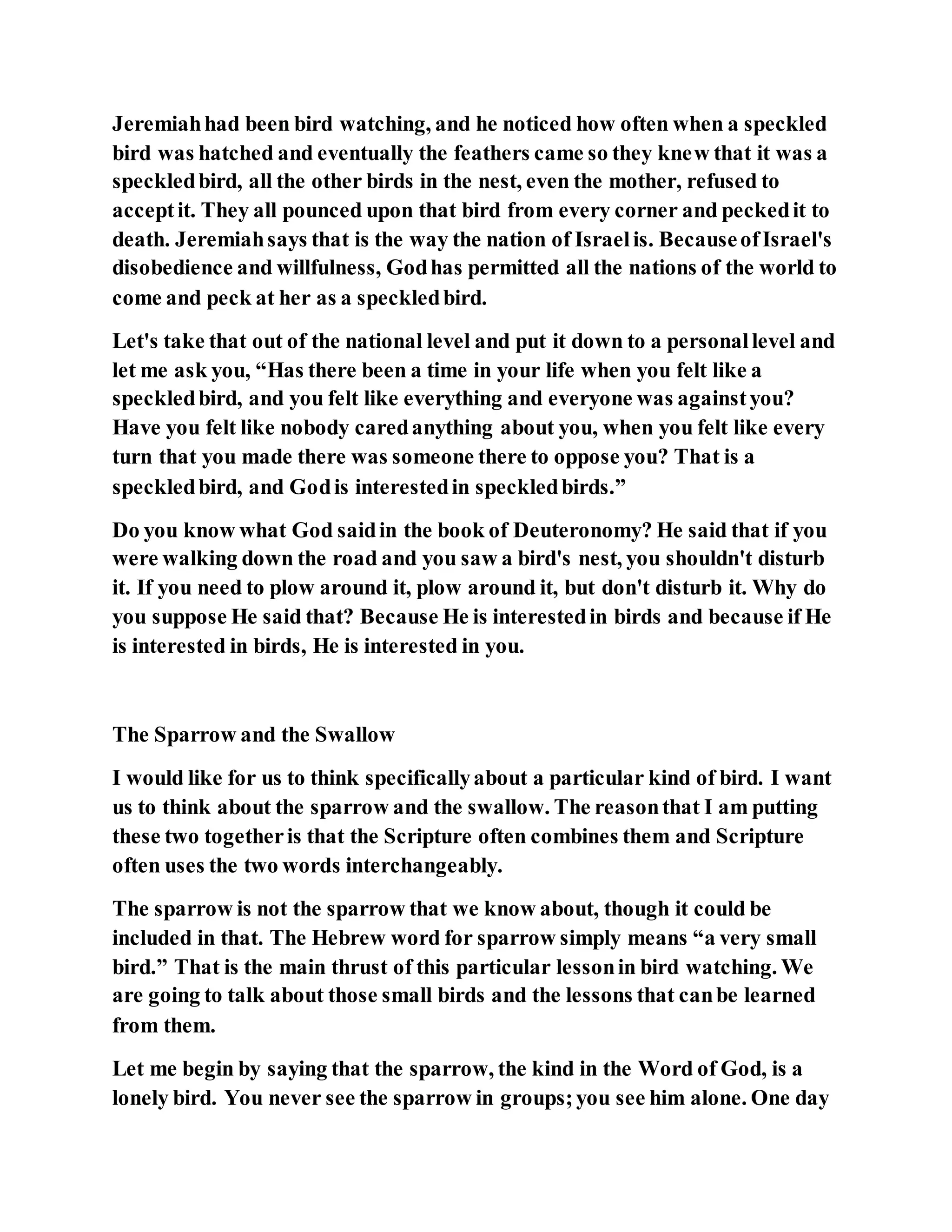
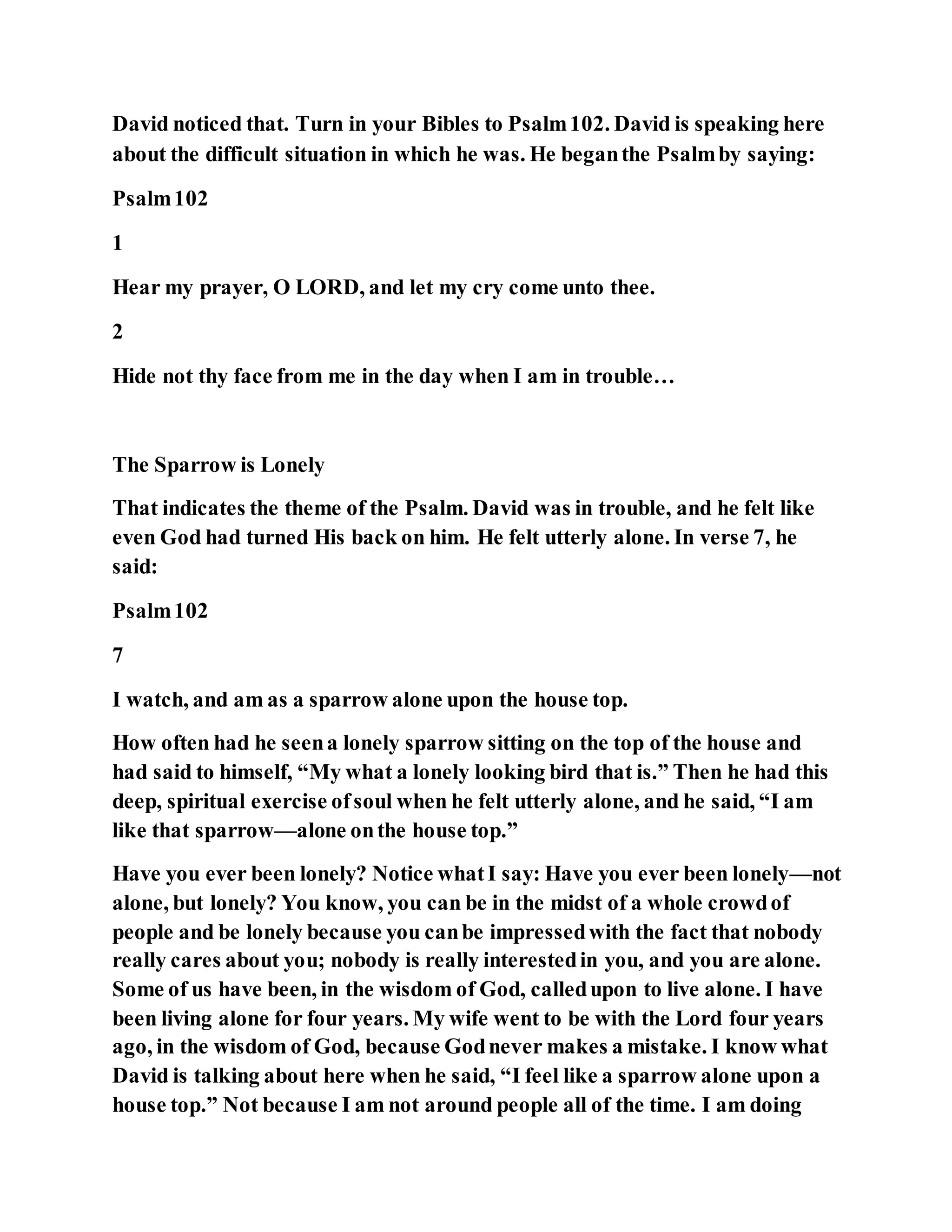
![this sort of thing all of the time. I am around people, and I love to be around
people; but there is a loneliness that some people are called upon to go
through that makes you think about this sparrow upon the house top, and I
have felt that way many, many times.
We must recognize that sometimes when we feel alone, we don't need to. Turn
in your Bibles to Romans, chapter 11. Sometimes we feellike that sparrow—
alone upon the house top because we are more interestedin ourselves and in
our own sorrows than we are in fact. In chapter11 of the book of Romans,
Paul is emphasizing the fact that Godis not through with the nation of Israel,
that He still has another plan; but he says, “Sometimes youpeople feelthat
way.” Notice in verse 2:
Romans 11
2
God hath not castawayhis people which he foreknew. Wotye not what the
scripture saith of Elias [that is Elijah] ? how he maketh intercessionto God
againstIsraelsaying,
3
Lord, they have killed thy prophets, and digged down thine altars; and I am
left alone, and they seek my life.
Sometimes, because we are lopsidedin our view of things, we can feel that we
are alone, that nobody else is interestedin the things of God or living for Him.
Of course, you know the rest of the story. Look at verse 4:
Romans 11
4
But what saith the answerof God unto him? I have reserved to myself seven
thousand men, who have not bowed the knee to the image of Baal.
Let's recognize that it is possible for us to feellike we are alone when we are
not; but having stated that and eliminated that possibility, let me remind you
of a passageofScripture found in Hebrews, chapter 13. Just as certainly as I](https://image.slidesharecdn.com/jesuswasabirdwatcher-200703143708/75/Jesus-was-a-bird-watcher-188-2048.jpg)




![A Sparrow is Valuable
One last thing about the sparrow. The sparrow is a valuable bird. As I make
that statement, you have every right to question it. A valuable bird, yes, but
[listen closely]not to man, but to God. Turn, please, to Matthew, chapter 10,
and notice what the Lord Jesus Christ has to sayabout sparrows. Iam sure
the Lord Jesus Christdid bird watching out in the open, but this particular
incident that He records is in the temple. As He went into the temple one day,
He saw a whole pile of sparrows (keepin mind we are talking about a small
bird. It could have been turtledoves, pigeons, orwhatever) with their legs tied
together, and they were being sold for a sacrifice in the temple. As He looked
at those sparrows, He said, in verse 29:“Are not two sparrows soldfor a
farthing?” That was the leastexpensive offering that anybody could make.
If we were to stop there, we would say what we ordinarily say, “What is a
sparrow? They are not worth anything at all,” but the Lord Jesus Christ said,
in the lastpart of verse 29:
Matthew 10
29
…and one of them shall not fall on the ground without your Father.
That is how valuable they are. Not one sparrow falls to the ground without
God knowing about it.
What do you think when you see a dead sparrow? Do you just kick it out of
the wayand go on? That would be a fairly normal reaction, but evidently
when the Lord Jesus Christ saw the sparrow, He said, “My Fatherknows
about that sparrow, and My Father cares aboutit.” Then notice what He says:
Matthew 10
30
But the very hairs of your head are all numbered.
31](https://image.slidesharecdn.com/jesuswasabirdwatcher-200703143708/75/Jesus-was-a-bird-watcher-193-2048.jpg)
![Fearye not therefore, ye are of more value than many sparrows.
A sparrow is so important to God that it doesn't fall to the ground without
God's knowing about it, and you are of more value than many sparrows.
Go back to Matthew, chapter 6. We glancedat it a bit earlier, and we
suggestedto you that the Lord Jesus Christ suggestedthat we do some bird
watching in the sense that in verse 26, He said:
Matthew 6
26
Behold the fowls of the air: for they sow not, neither do they reap, nor gather
into barns; yet your heavenly Father feedeththem. Are ye not much better
than they?
The word fowls here is the Greek wordfor “sparrow.” Noticeverse 27:
Matthew 6
27
Which of you by taking thought can add one cubit unto his stature?
28
And why take ye thought for raiment? Considerthe lilies of the field, how
they grow;they toil not, neither do they spin:
29
And yet I say unto you, That even Solomon in all his glory was not arrayed
like one of these.
30
Wherefore, if God so clothe the grass ofthe field, which to day is, and to
morrow is castinto the oven, shall he not much more [notice the emphasis
there] clothe you, O ye of little faith?
31](https://image.slidesharecdn.com/jesuswasabirdwatcher-200703143708/75/Jesus-was-a-bird-watcher-194-2048.jpg)
![Therefore take no thought [no anxious thought] , saying, What shall we eat?
or, What shall we drink? or, Wherewithal shall we be clothed?
32
(For after all these things do the Gentiles seek:)for your heavenly Father
knoweththat ye have need of all these things.
33
But seek ye first the kingdom of God, and his righteousness;and all these
things shall be added unto you.
34
Take therefore no thought [no anxious thought] for the morrow: for the
morrow shall take thought for the things of itself. Sufficient unto the day is the
evil thereof.
The next time that you see a sparrow, remember God is interested in that
sparrow. An eloquent preacher said one time that there is never a sparrow
dies but that God goes to its funeral. I am not that eloquent, so I don't usually
talk like that, but it impressedme—not a sparrow dies, but that Godgoes to
its funeral.
God is interested in you. The next time you see a sparrow, remember God
cares aboutyou so much more than about that sparrow.
SOURCE:Birds of the Bible #1: Sparrow
Matthew 10:28-30, “And fear not them which kill the body, but are not able to
kill the soul: but rather fear him which is able to destroyboth soul and body
in hell. Are not two sparrows soldfor a farthing? and one of them shall not
fall on the ground without your Father. But the very hairs of your head are all
numbered.”](https://image.slidesharecdn.com/jesuswasabirdwatcher-200703143708/75/Jesus-was-a-bird-watcher-195-2048.jpg)


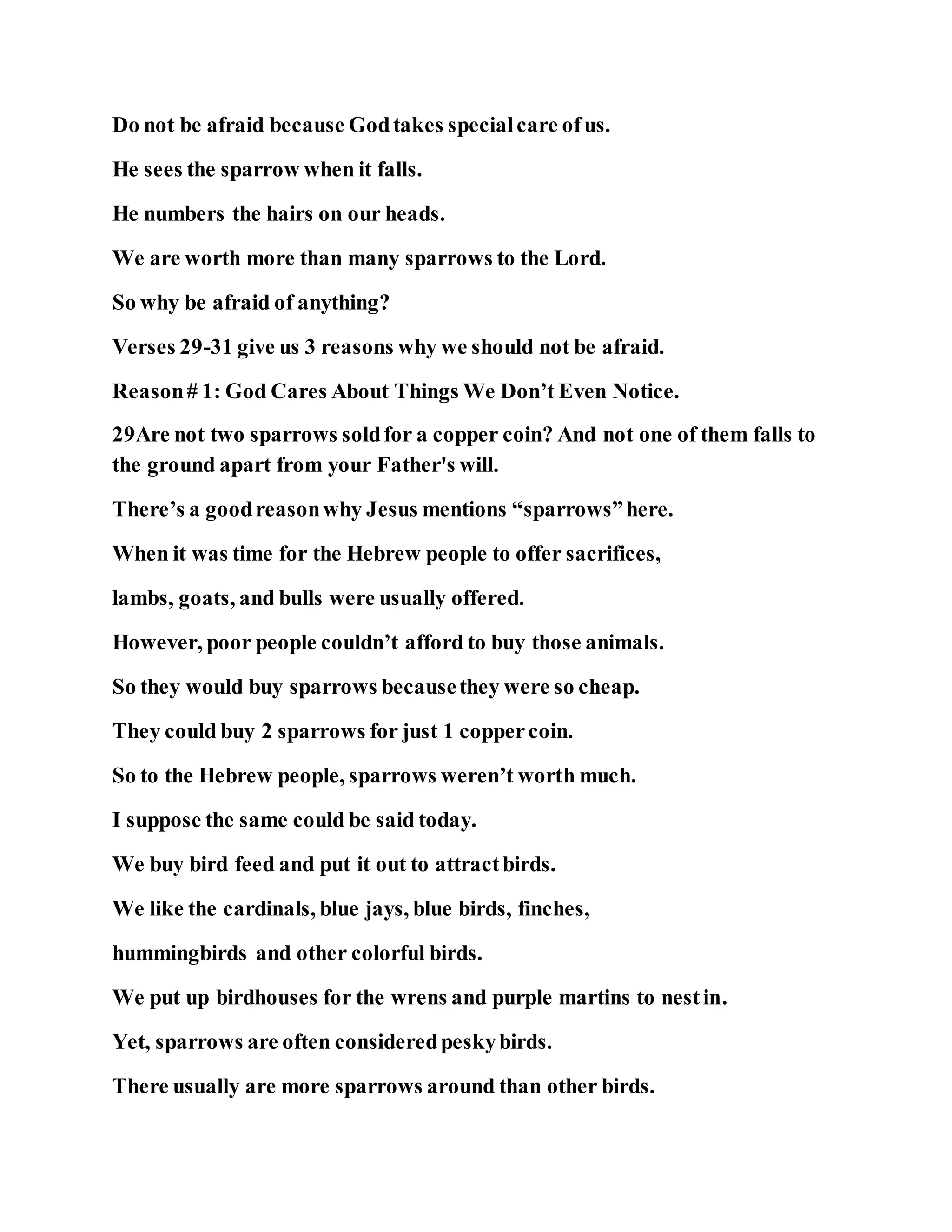

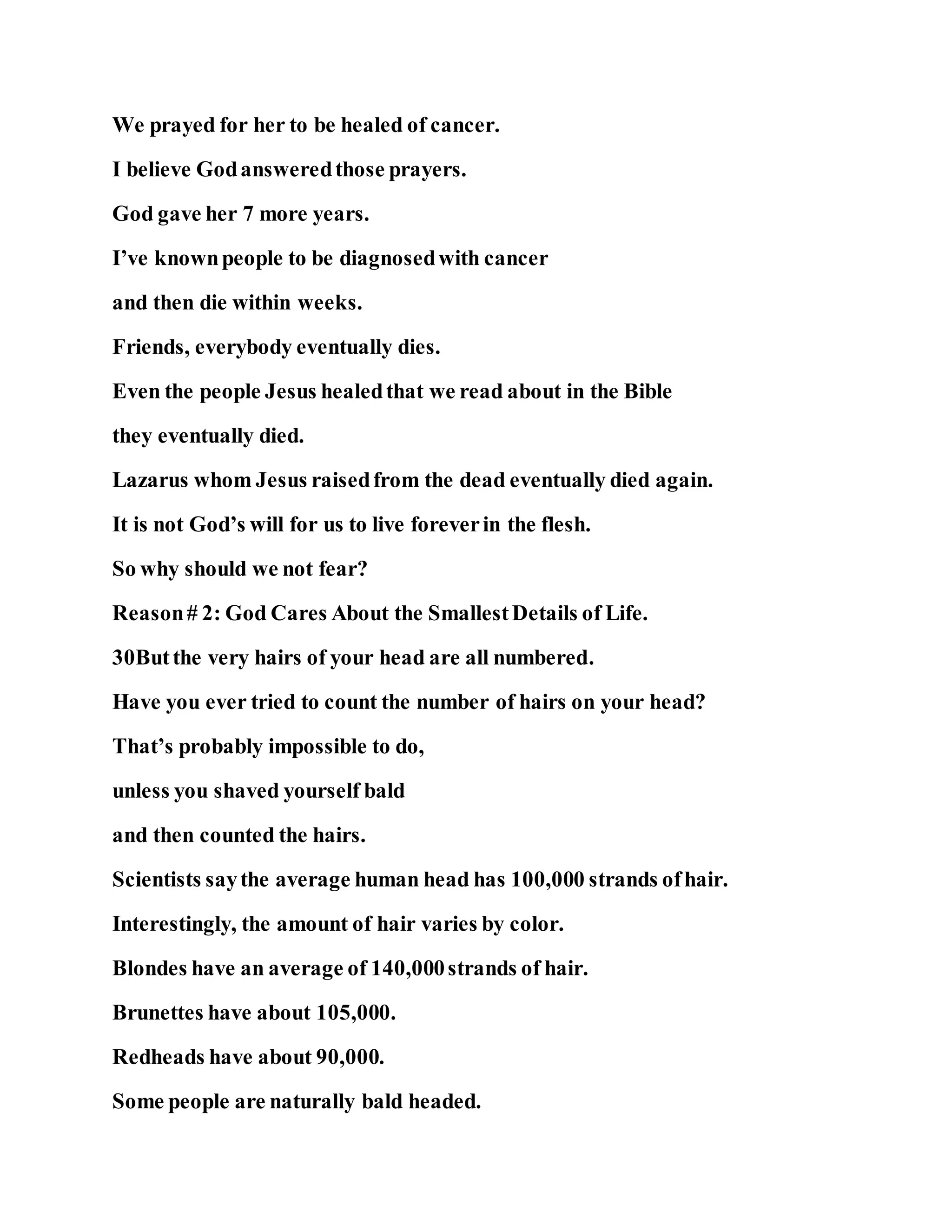



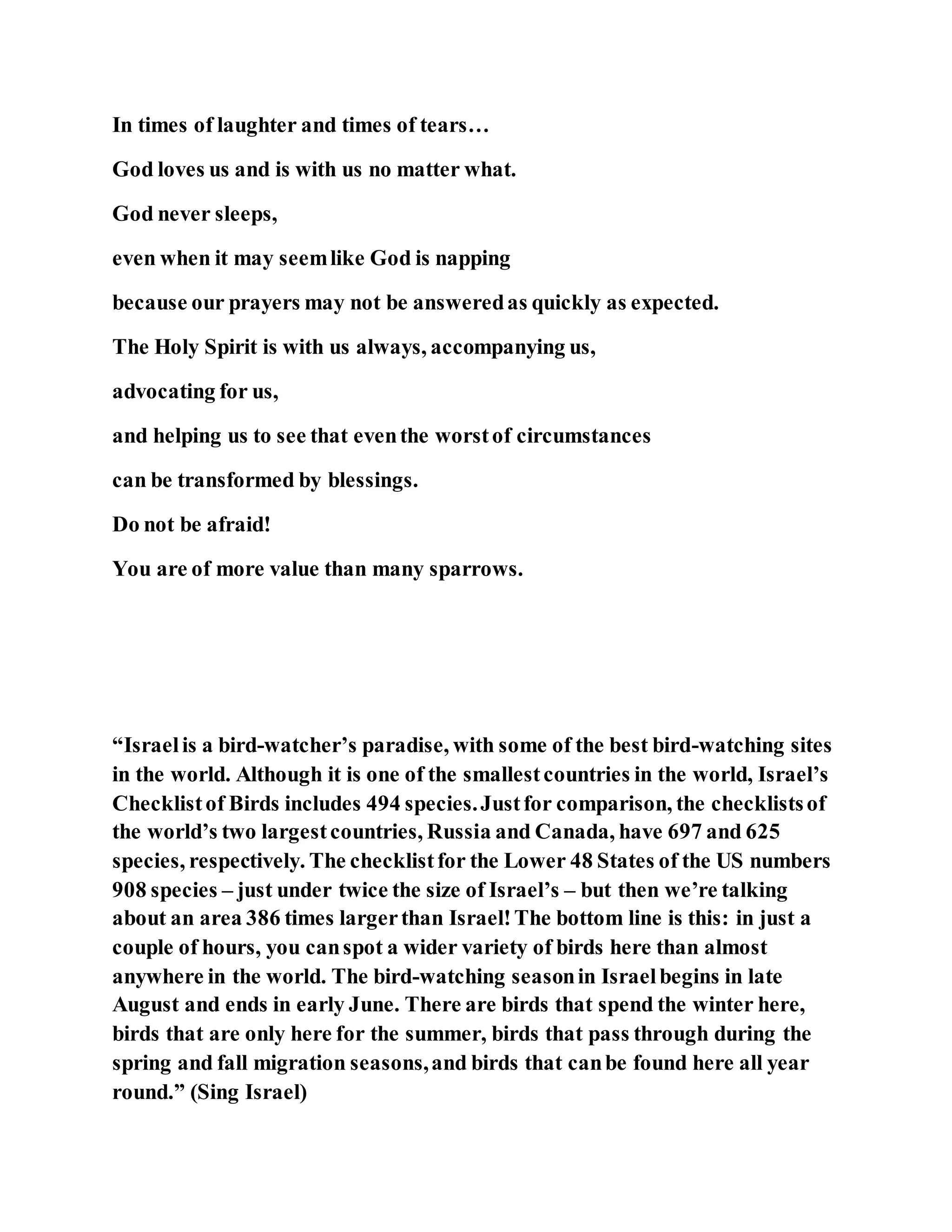

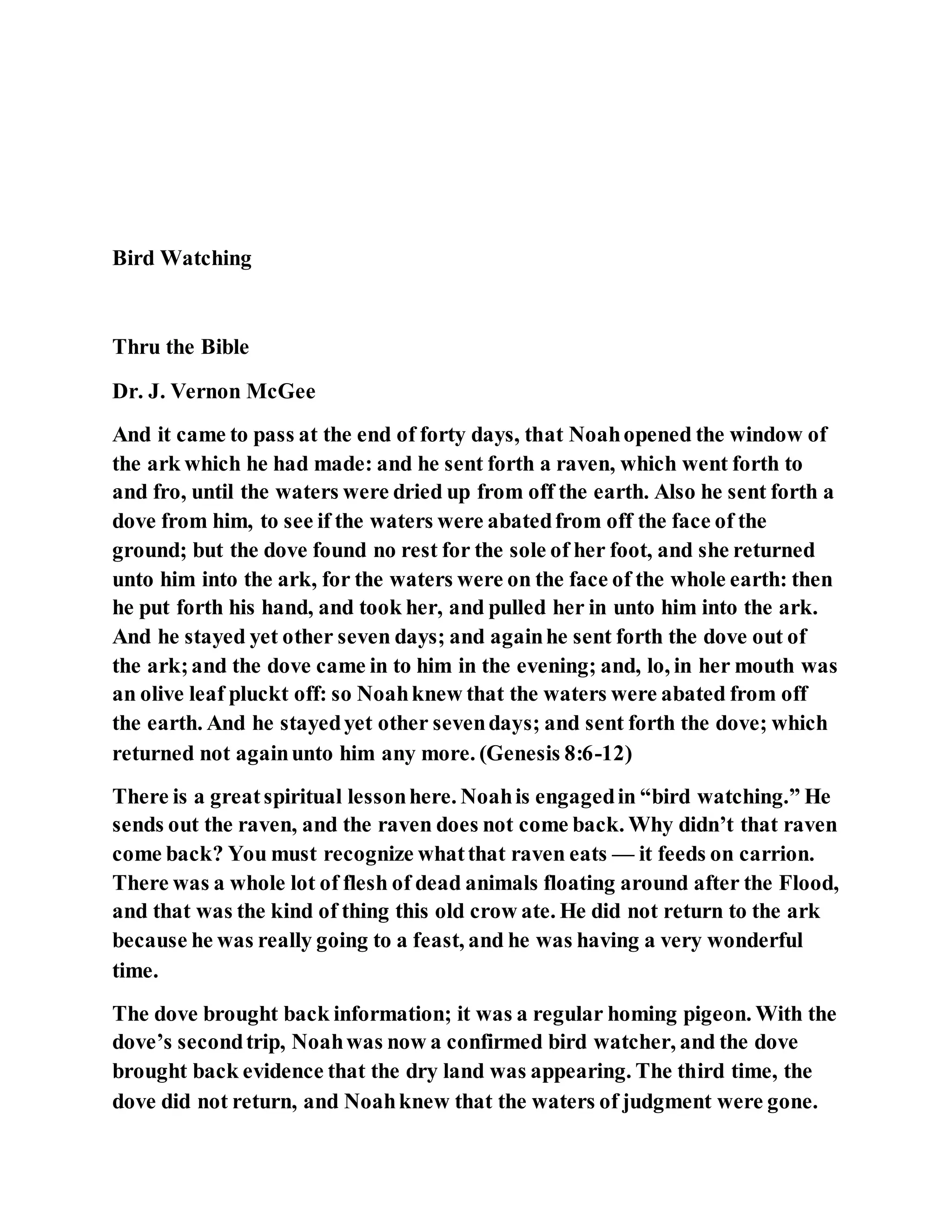


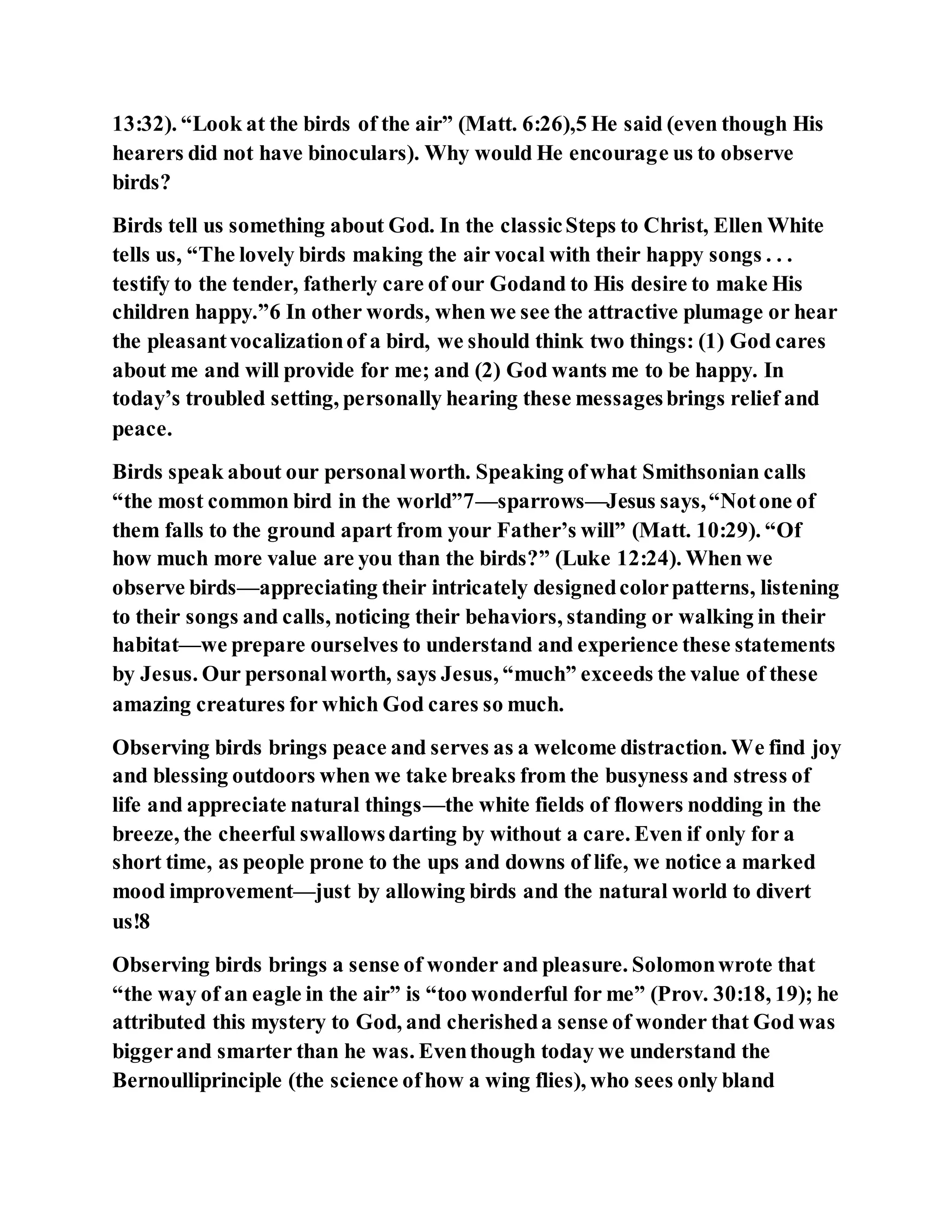



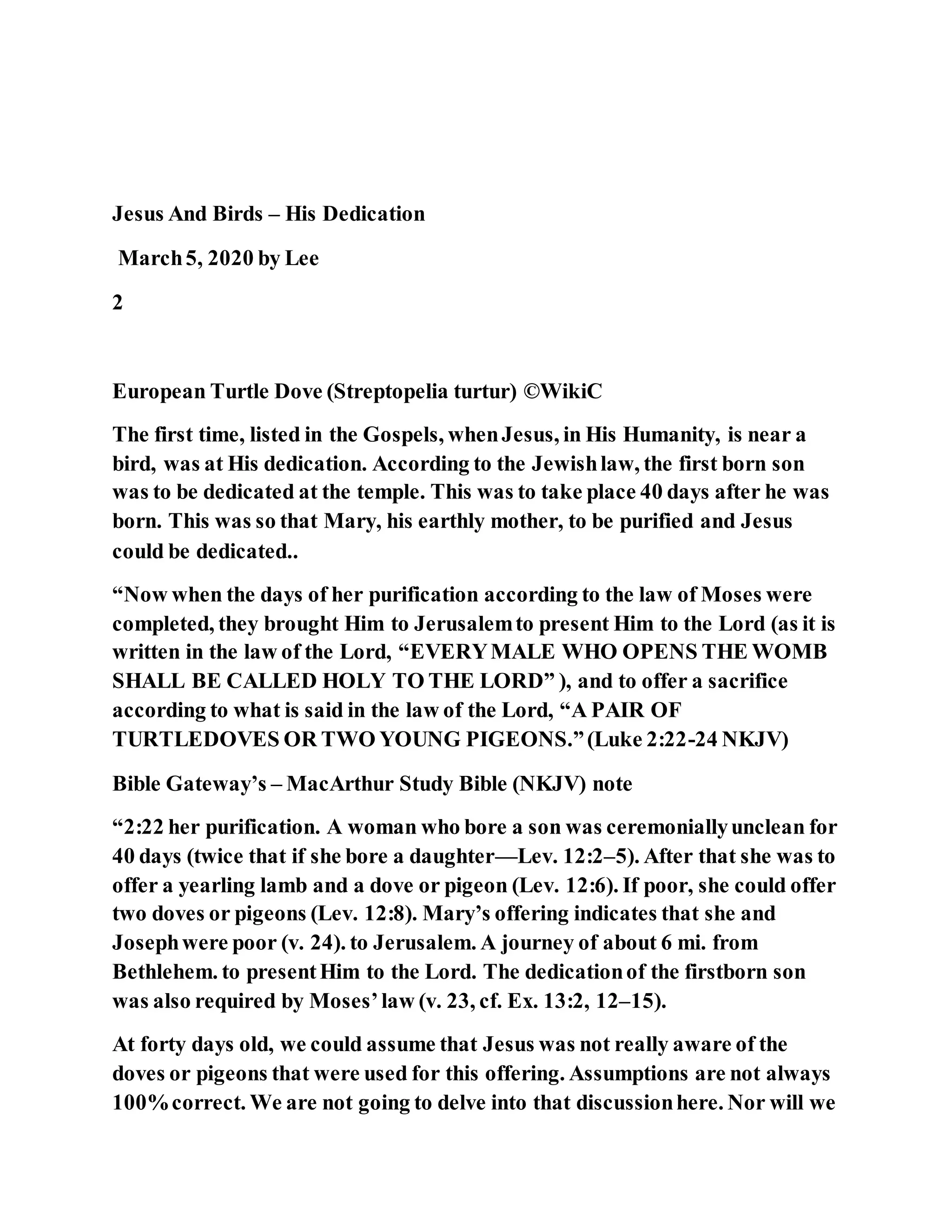

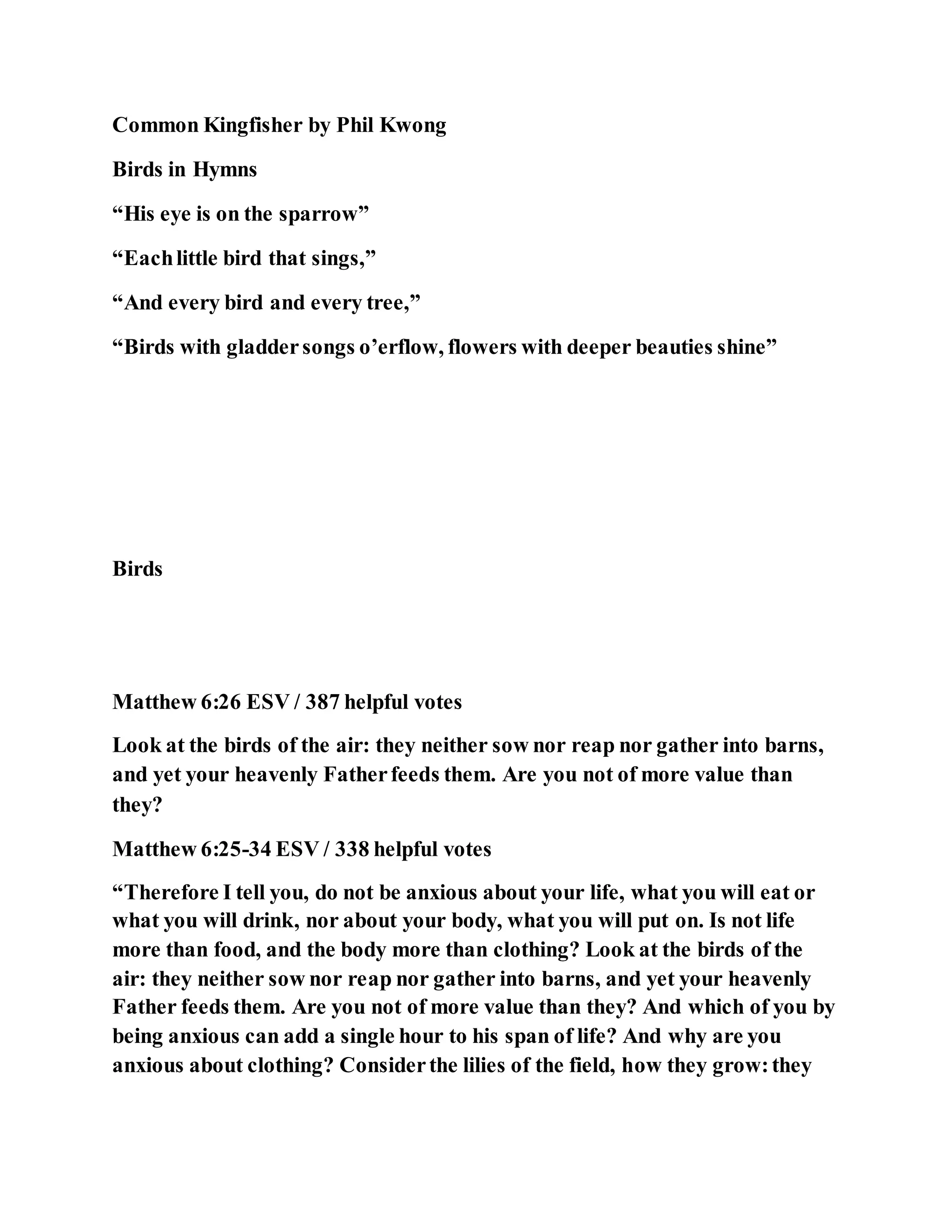

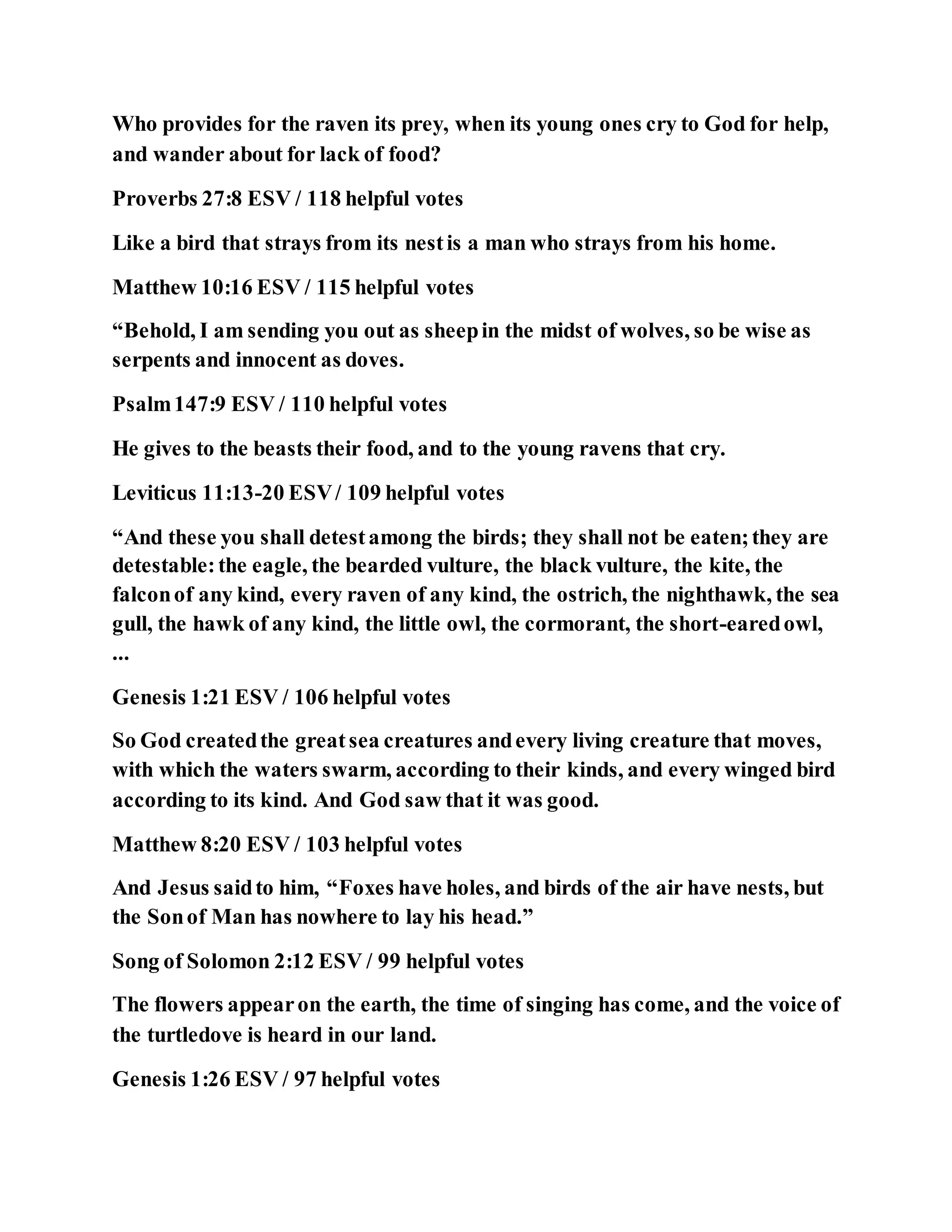
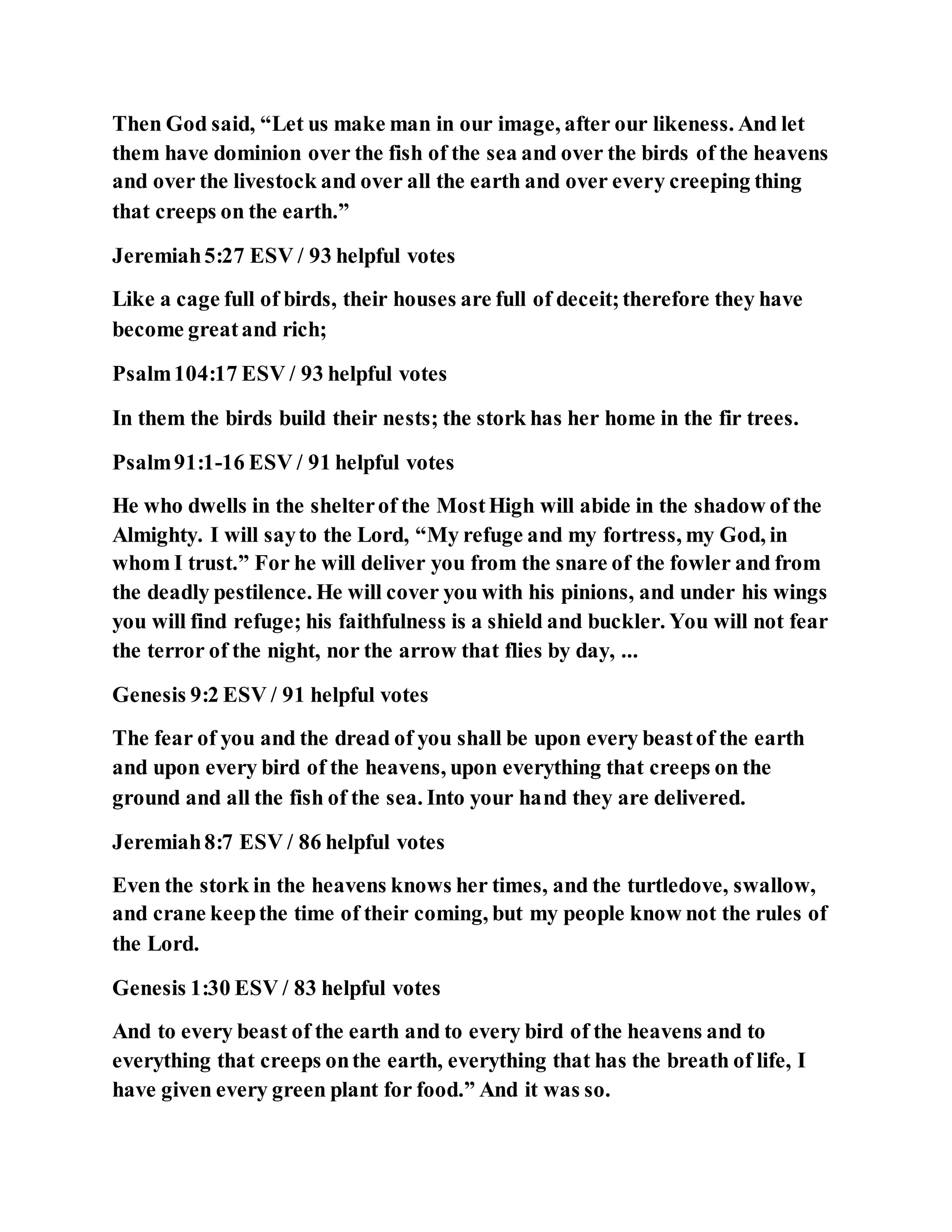




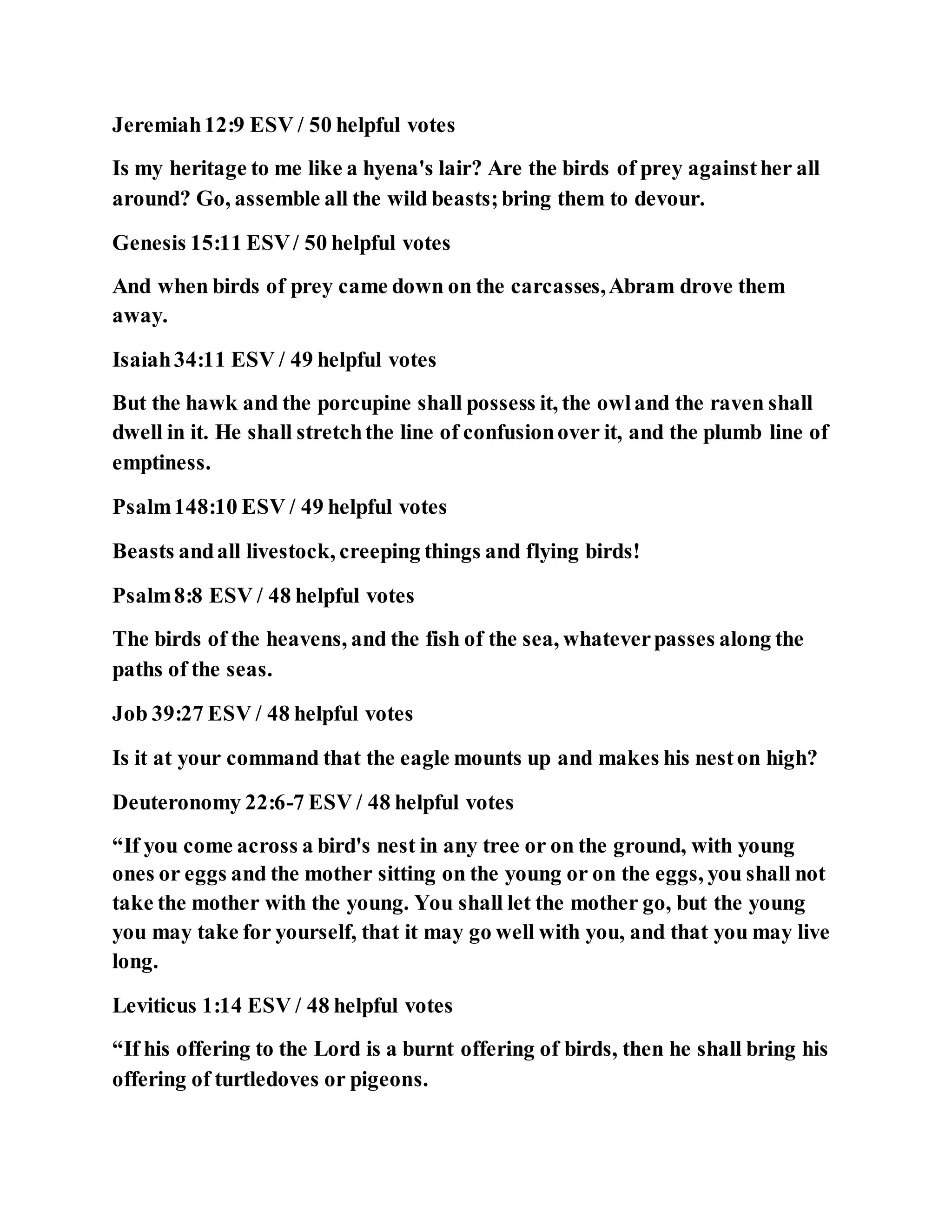
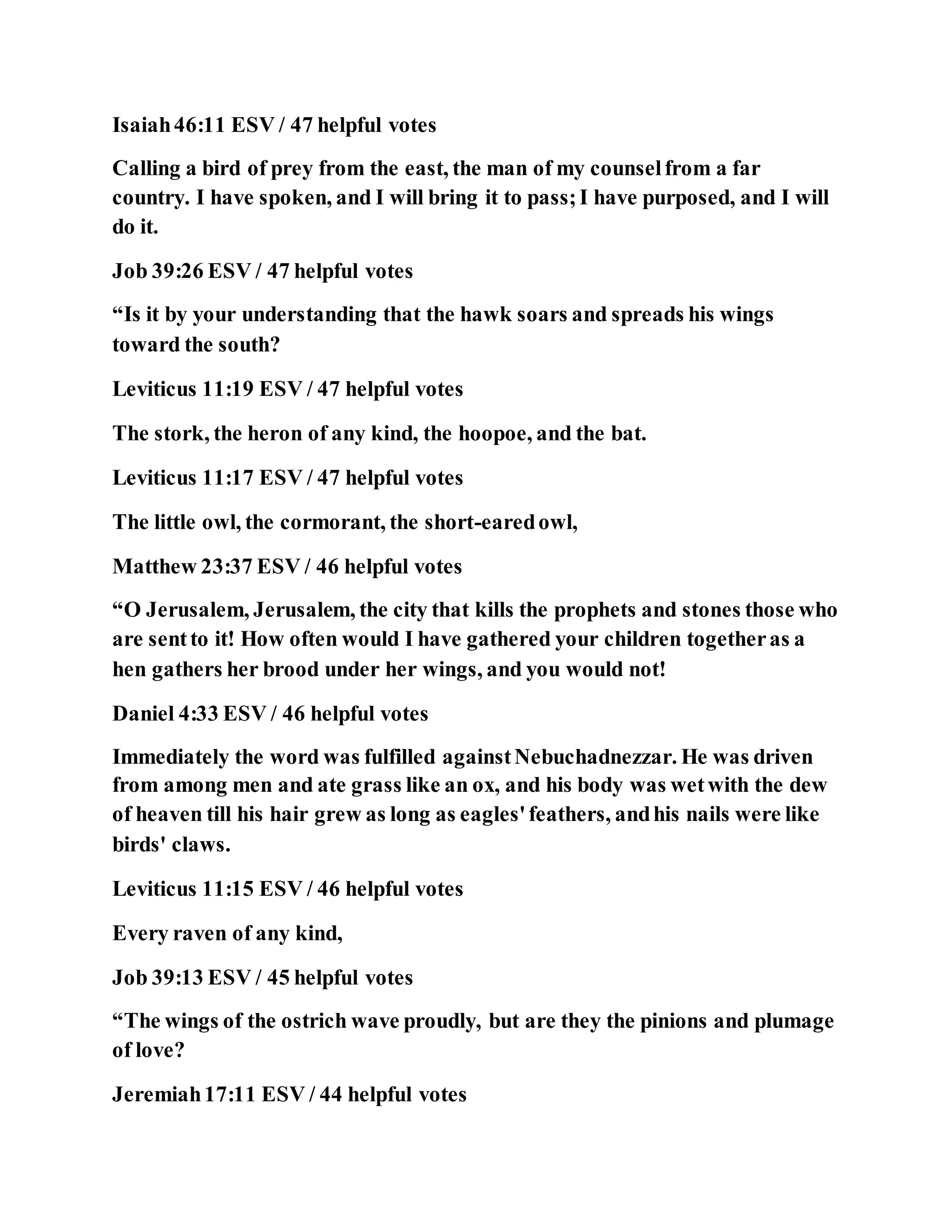


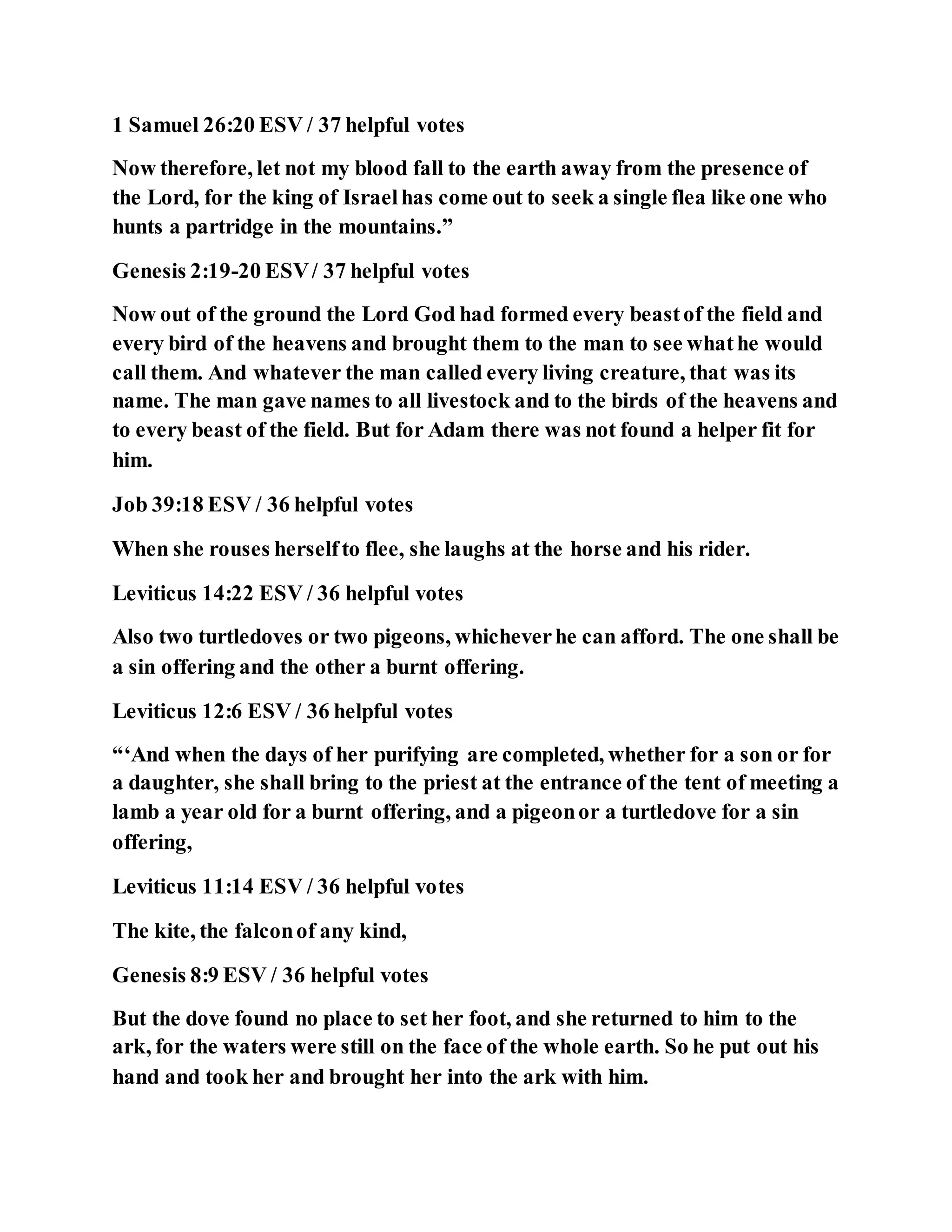
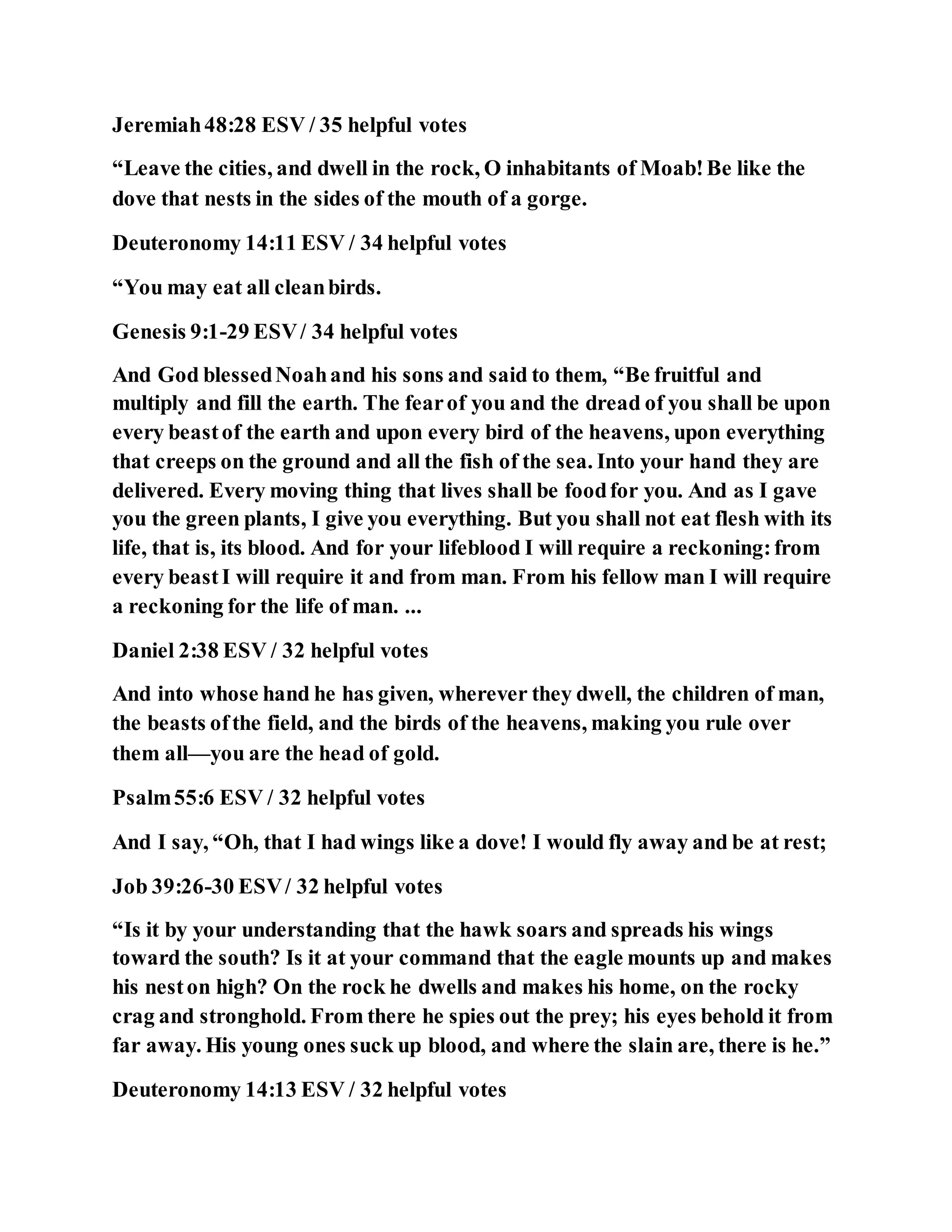
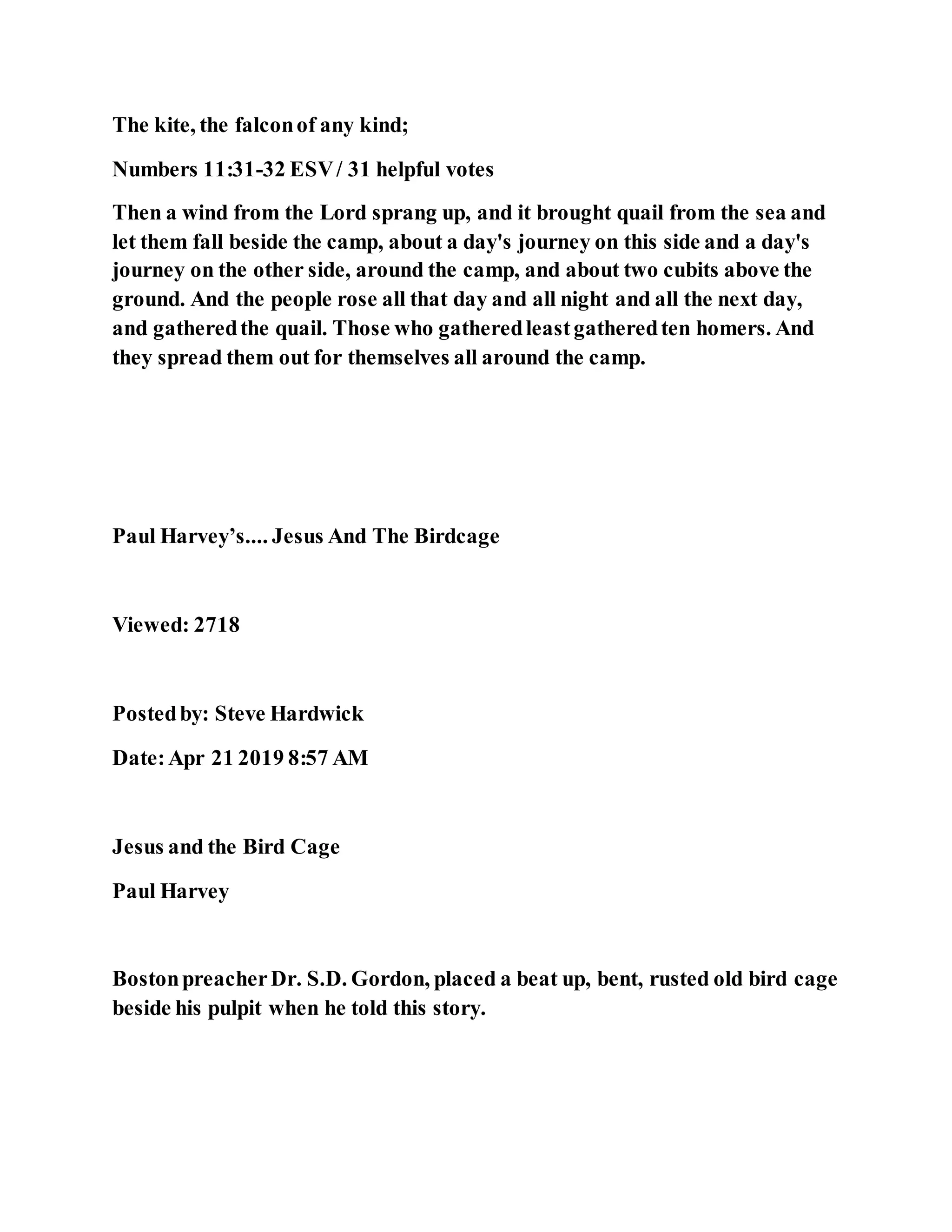


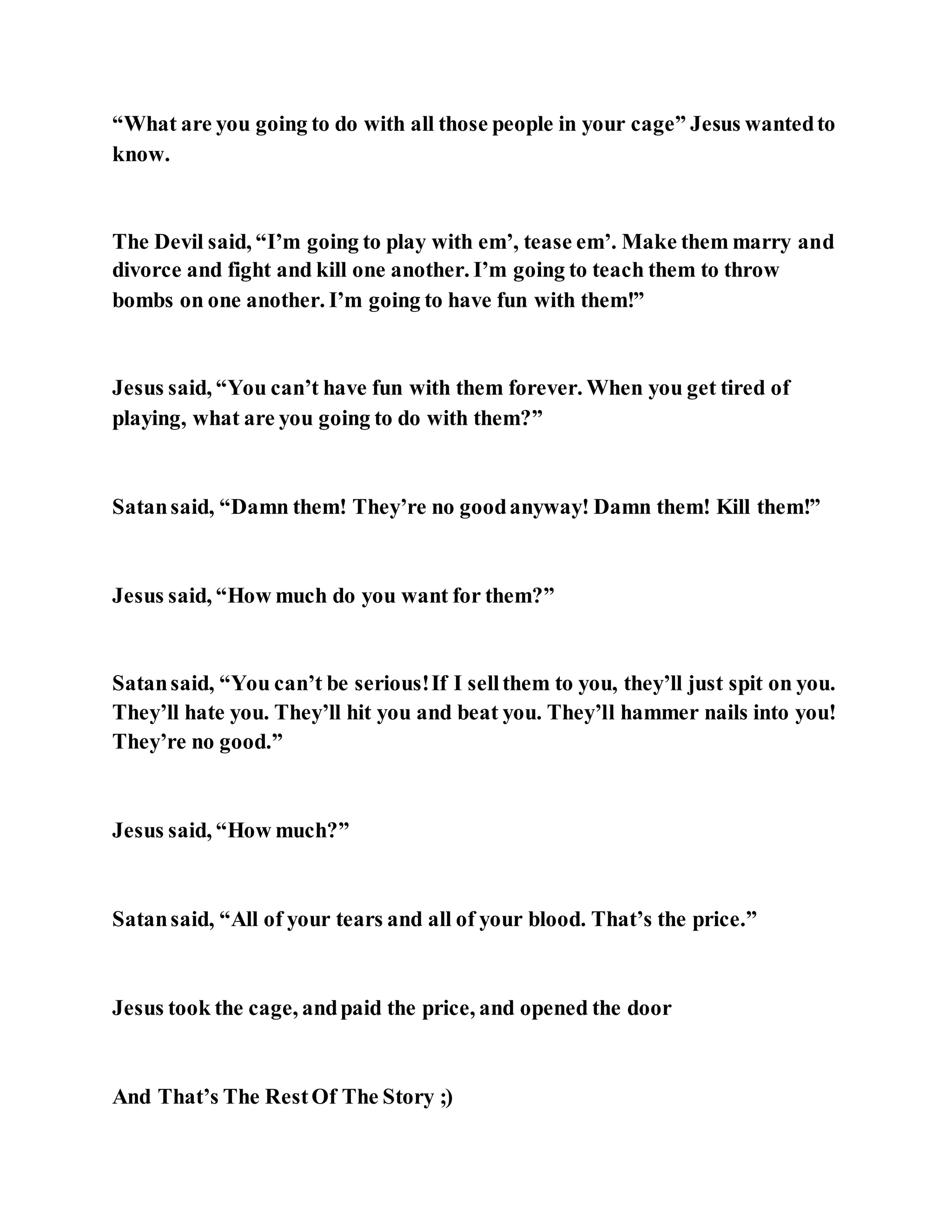
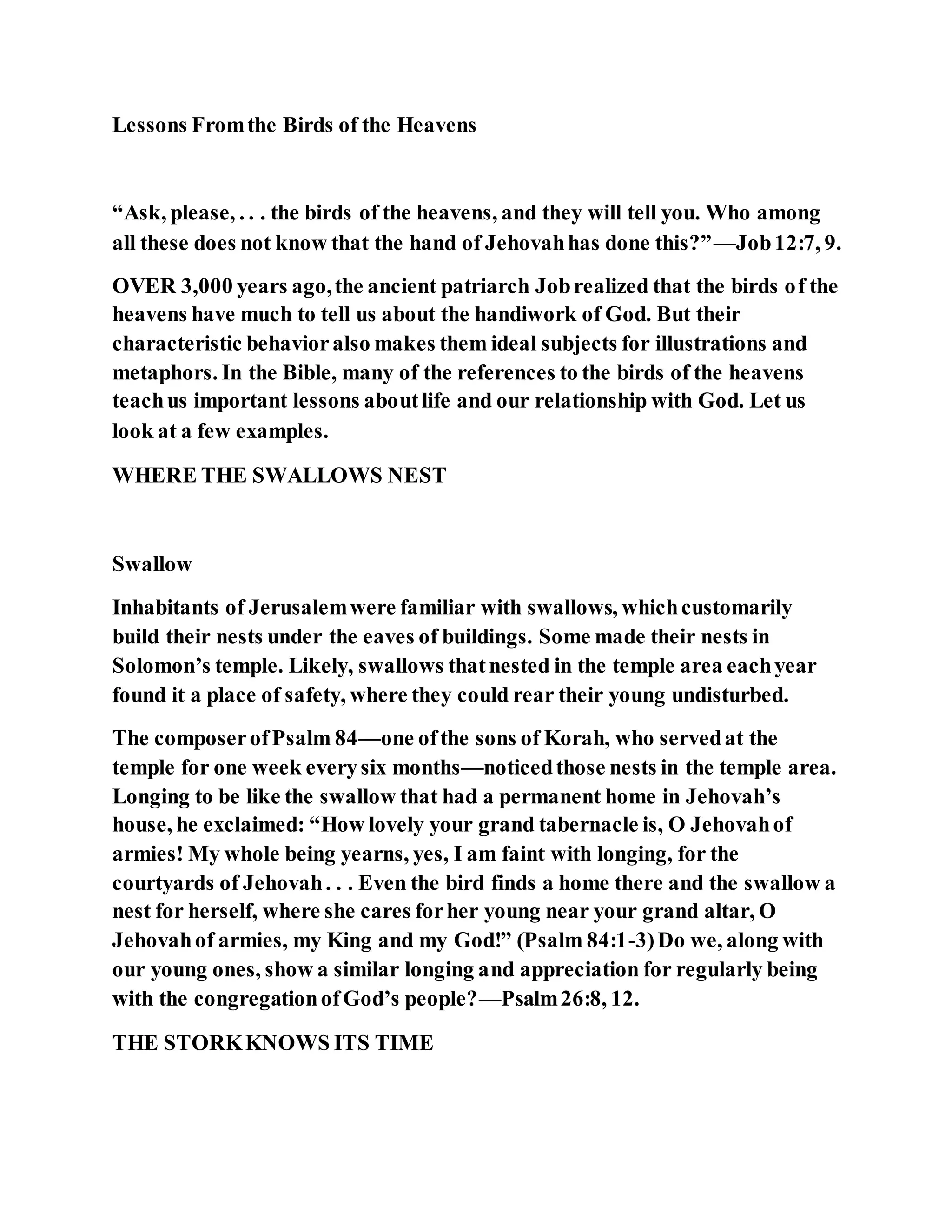
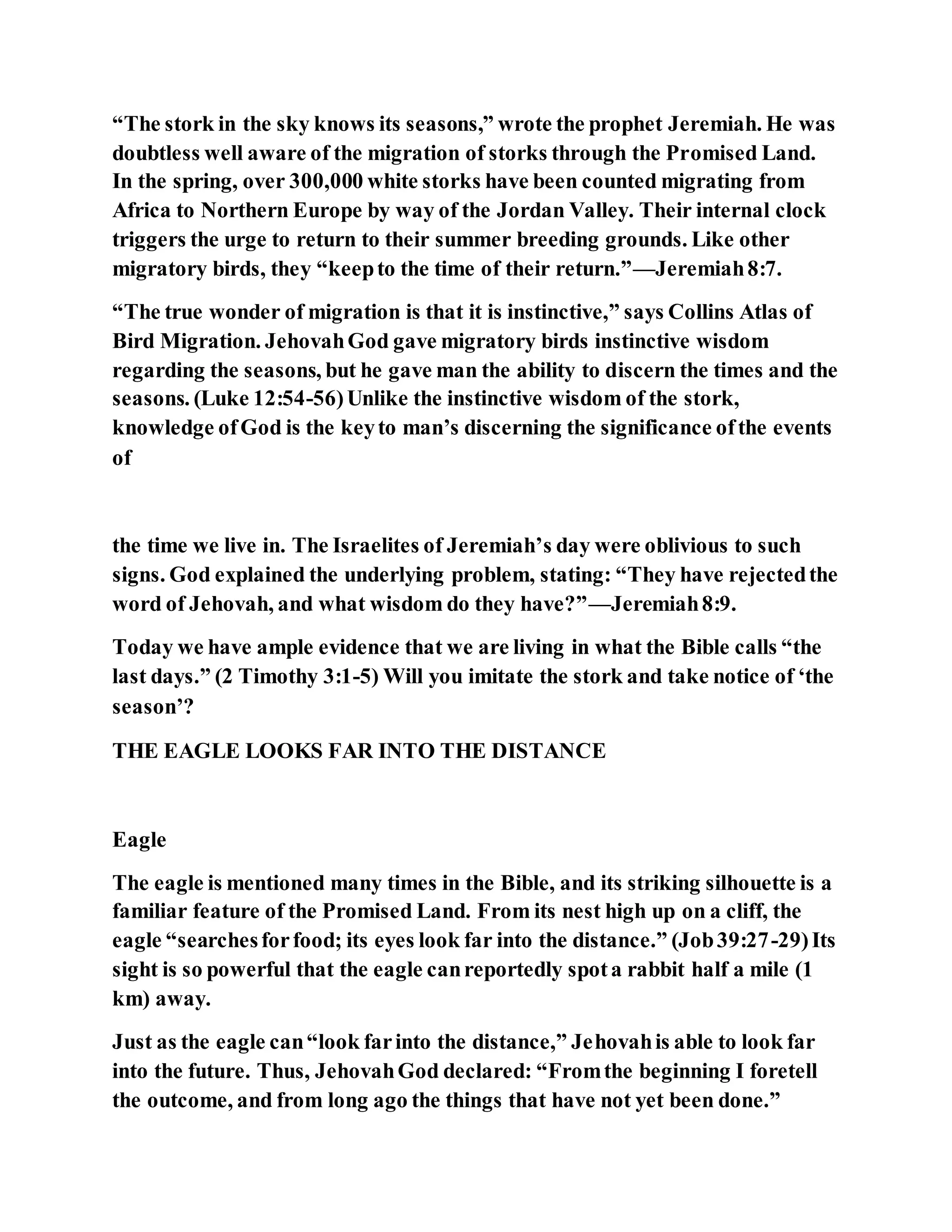
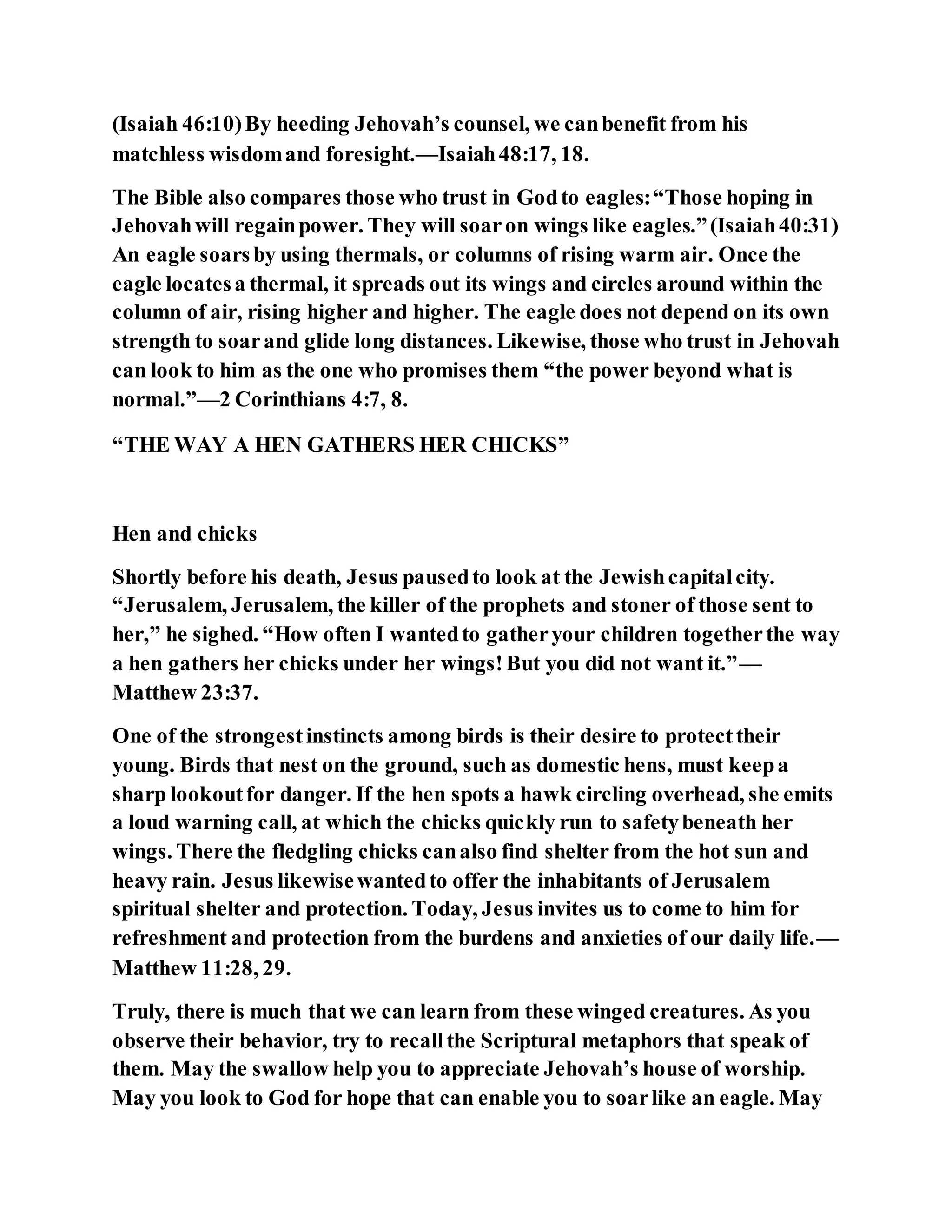






!["My sweetlittle sisters, birds of the sky," Francis said, "you are bound to
heaven, to God, your Creator. In every beat of your wings and every note of
your songs, praise him. He has given you the greatestofgifts, the freedom of
the air. You neither sow, nor reap, yet God provides for you the most delicious
food, rivers, and lakes to quench your thirst, mountains, and valleys for your
home, tall trees to build your nests, and the most beautiful clothing: a change
of feathers with every season. Youand your kind were preserved in Noah's
Ark. Clearly, our Creatorloves you dearly, since he gives you gifts so
abundantly. So please beware, my little sisters, of the sin of ingratitude, and
always sing praise to God."
The monks who recorded Francis'sermonto the birds wrote that the birds
listened intently to everything Francis had to say:
"While Francis saidthese words, all those birds began to open their beaks,
and stretchout their necks, and spreadtheir wings, and bend their heads
reverently towardthe earth, and with acts and songs, they showedthat the
holy father [Francis] gave them greatpleasure."
Francis Blessesthe Birds
Francis "rejoiced" atthe birds' response, the monks wrote, and
"wonderedmuch at such a multitude of birds and at their beauty and at their
attention and tameness, and he devoutly thanked God for them."
The birds remained attentively gatheredaround Francis, the story goes, until
he blessedthem and they flew away—someheading north, some south, some
east, and some west—going outin all directions as if on their way to pass
along the goodnews of God's love that they had just heard to other creatures.](https://image.slidesharecdn.com/jesuswasabirdwatcher-200703143708/75/Jesus-was-a-bird-watcher-242-2048.jpg)

